Deaneries
| Earliest date | Photos | Interpretive transcription | Shape | Position | Decoration | Notes | Critical apparatus | |
|---|---|---|---|---|---|---|---|---|
| PP-1.1.1 | 1879 | 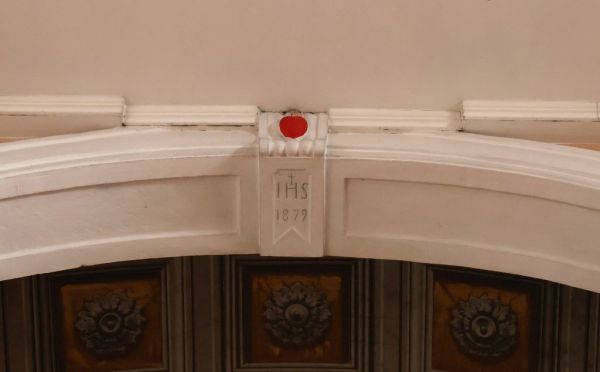 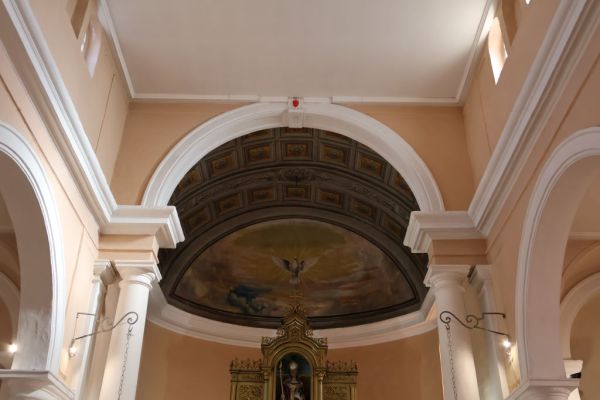 | rectangular | The inscription is located on the lower side of the keystone of the apse arch. | The inscription is located on the keystone of the triumphal arch (painted in white). It is situated on the lower side of the keystone, within an inscription field shaped like a gonfalon (a vertically oriented flag) with an ending shaped like a swallowtail. The front side of the keystone is decorated with multiple, relief-highlighted S profiles, with a heart motif in the center (painted red). The dimensions could not be taken because of the inaccessibility. | |||
| PP-1.2.1 | 1704 | 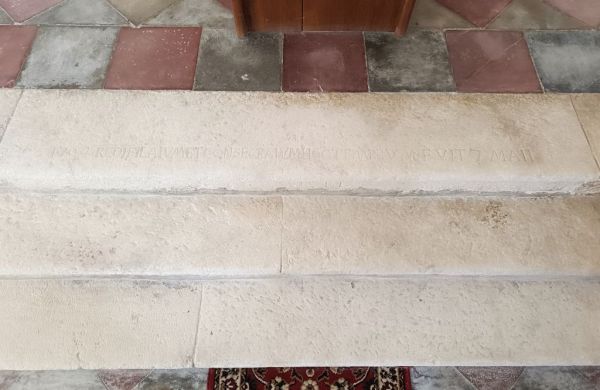 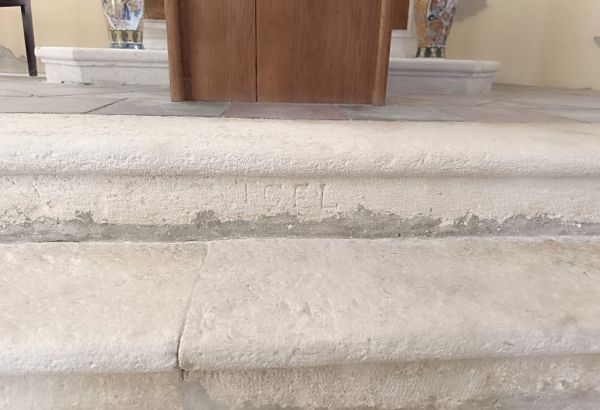 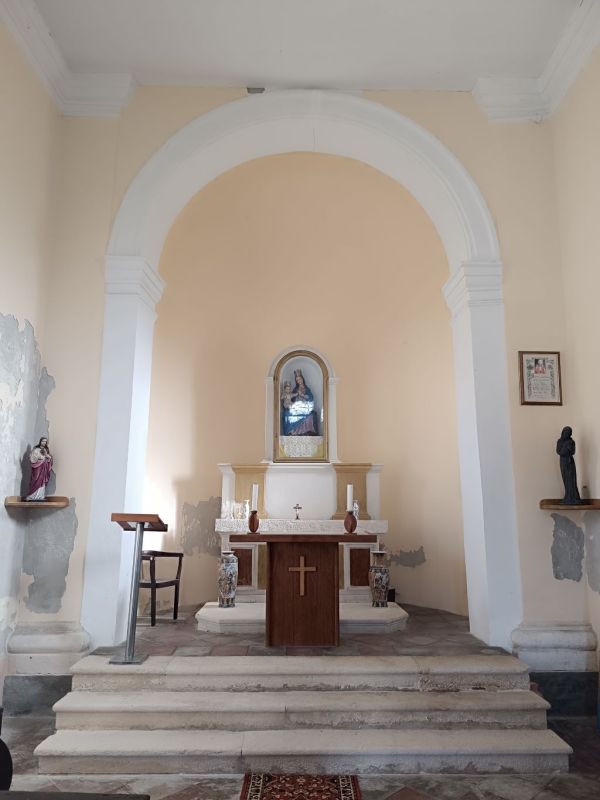 | rectangular | The upper and front sides of the third step of the sanctuary. | The inscription is carved on the third step leading to the sanctuary area. Part of the inscription is on the upper side (tread), while the other part is on the front, face side of the step. There is no decoration. | |||
| PP-10.2.1 | 1931 | 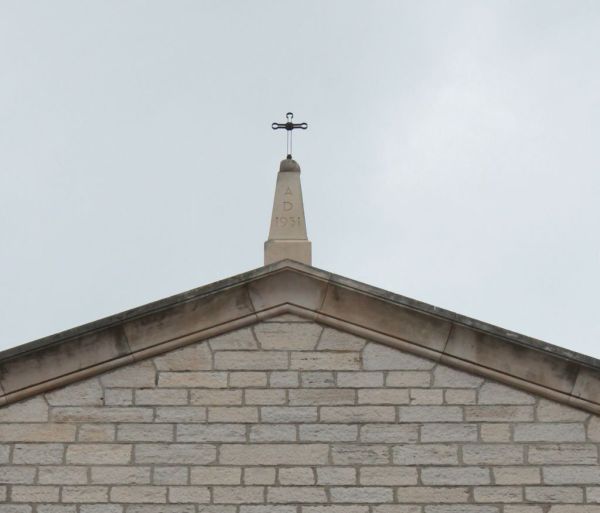 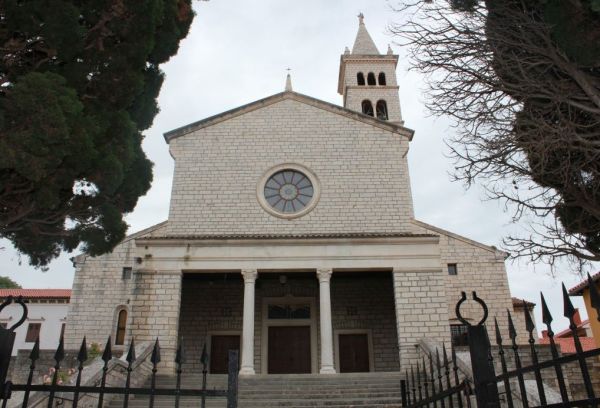 | A(NNO) / D(OMINI)a) / 1931 | trapezoid | The acroterion at the center of the church facade. | The acroterion at the top, in the middle of the southwest facade of the church. The acroterion has the shape of a truncated pyramid on a square base, with a metal Latin cross at its top. The inscription is located on the front side of the acroterion.
The church was dedicated on the All Saints' Day, November 1, 1931. The text is centered. The inscription was not measured because of the height. | a) Both words are abbreviated without dots. | |
| PP-10.3.1 | 1886 | 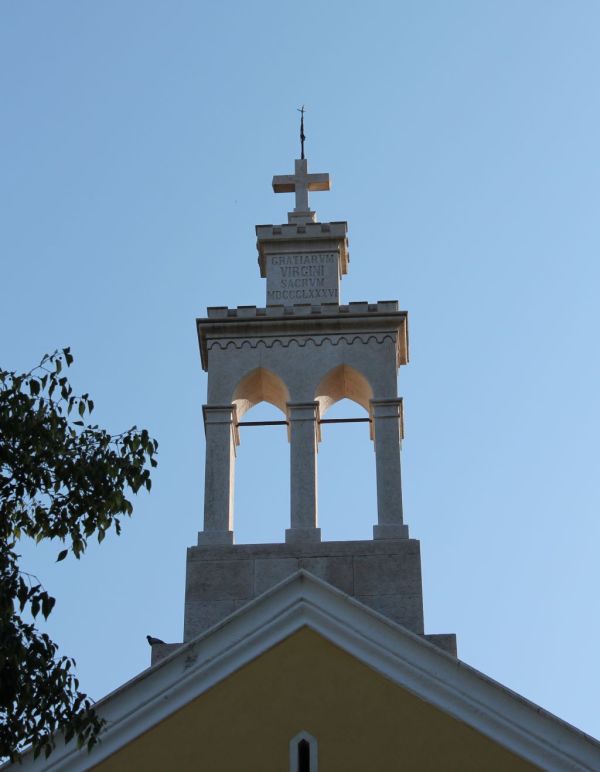 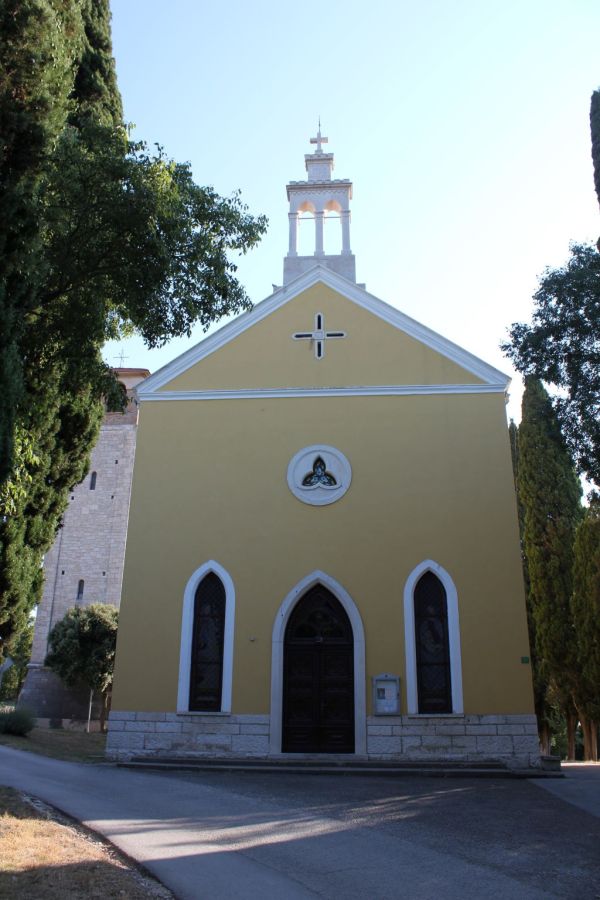 | GRATIARVM / VIRGINI / SACRVM / MDCCCLXXXVI | rectangular | Above the bell gable on the main facade of the church | The inscription is located above the spire (for the two missing bells) on the main facade of the church. It is placed on the front side of the square base situated at the center of the top of the spire, with a stone Latin cross at the top of the base. The upper part of the base is decorated with a row of interlocking teeth that continuously surround the entire base.
The dimensions could not be taken because of the inaccessibility. The text is centered. The letters in 'VIRGINI' is about 1/3 taller than in other words. | ||
| PP-10.3.4 | 1887 | 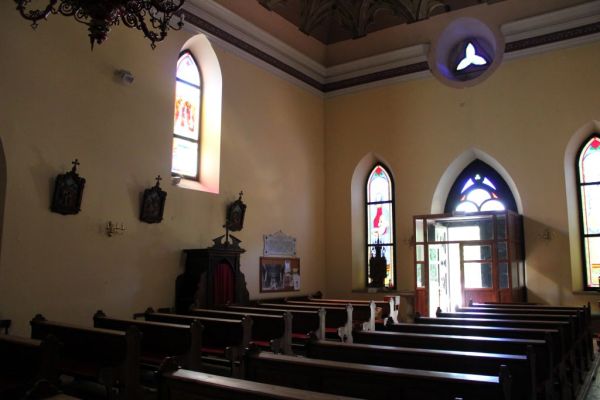 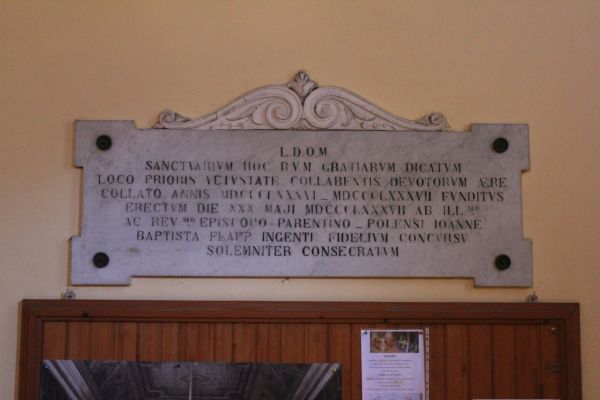 | L(AVS) D(EO) O(PTIMO) M(AXIMO) / SANCTVARIVM HOC B(EATAE) V(IRGINIS) M(ARIAE) GRATIARVM DICATVM / LOCO PRIORIS VETVSTATE COLLABENTIS DEVOTORVM AERE / COLLATO ANNIS MDCCCLXXXVI _ MDCCCLXXXVII FVNDITVS / ERECTVM DIE XXX MAJI MDCCCLXXXVII AB ILL(VSTRISSIM)O AC REV(ERENDISSIM)O EPISCOPO PARENTINO_POLENSI IOANNE / BAPTISTA FLAPP INGENTI FIDELIVM CONCVRSV / SOLEMNITER CONSECRATVM | rectangular | Interior of the church, plaque on the southern side wall | The inscription commemorating dedication of the church. Rectangular marble plaque with square extensions at the corners. The text is centered. The letters are engraved and painted in black (the paint peeled off in some places). Above the plaque is a relief decoration with volutes, made of limestone. | ||
| PP-14.1.4 | 1528 JL | 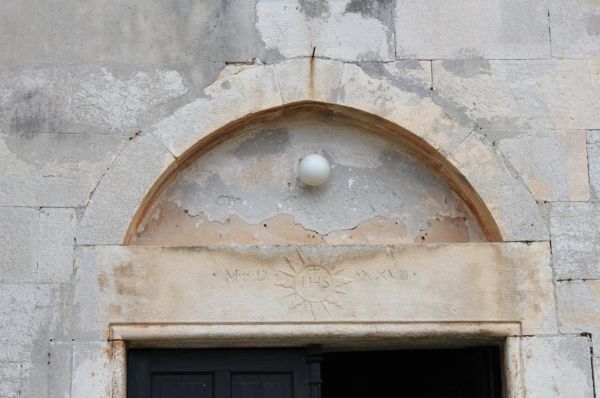 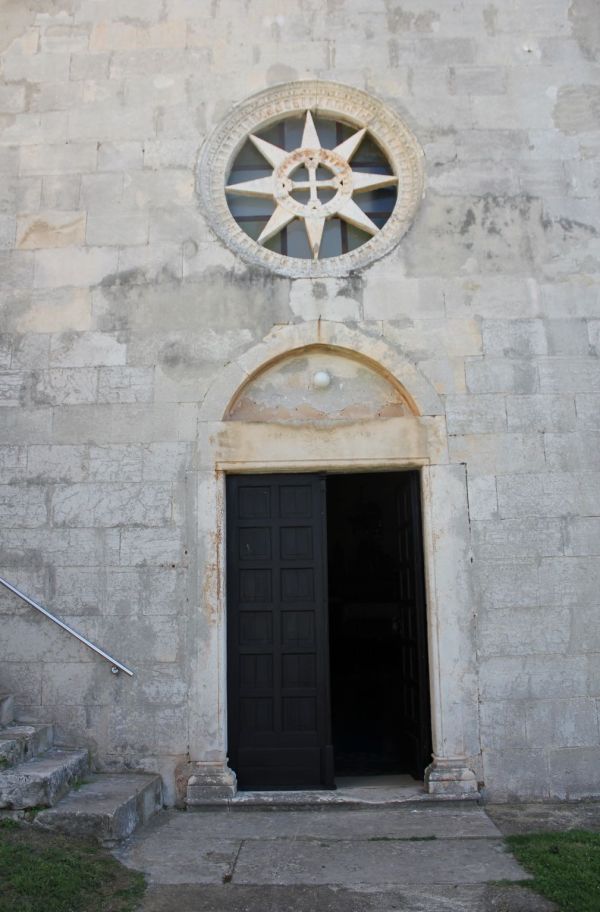 | M · D · {{sol, IHS, crux}}a) · XXXVIII · | rectangular | Lintel above the portal, west façade of the church. | The monogram of Christ in the center of the lintel, inserted between Roman numerals indicating the year. | The inscription is located on the lintel of the portal, with a lunette above it, within which the central depiction has not been preserved. The year is engraved in Roman numerals on the lintel, and between them is inserted the Christogram. The Christogram is placed within a sun motif, positioned at the center of the lintel. | a) A circle with alternating eight flame-like and eight pointed rays. Inside the circle, IHS is written, with a Latin cross raising from the crossbar of 'H'. |
| PP-14.1.6 | 1685 | 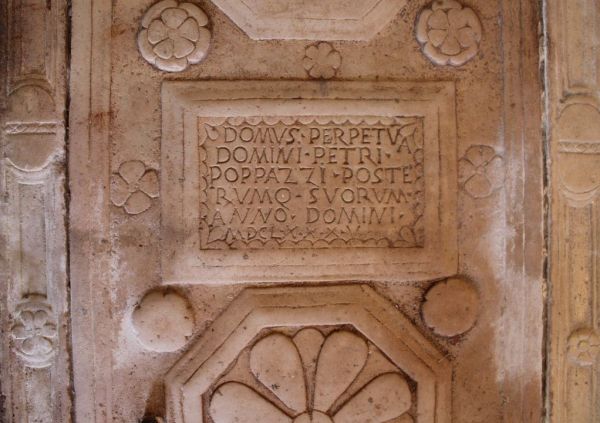 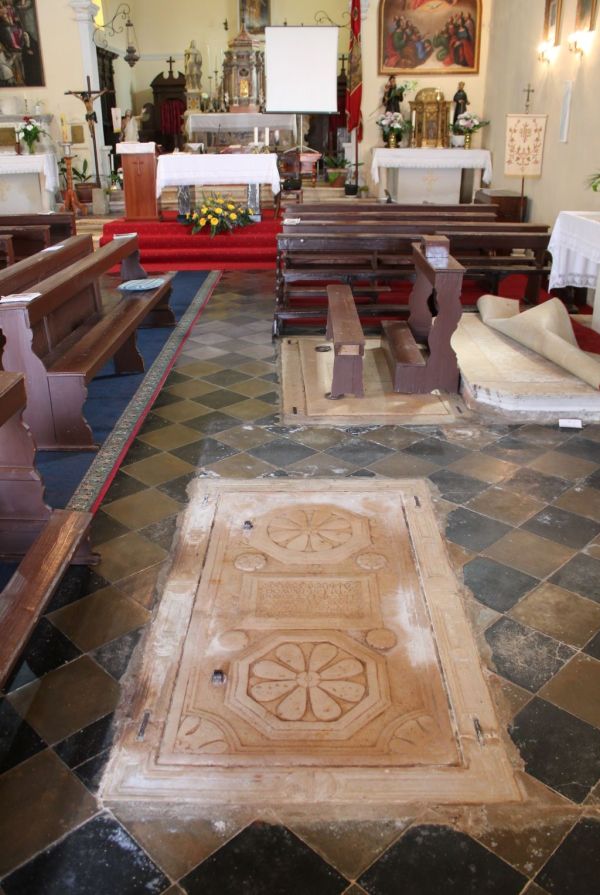 | DOMVS · PERPETVAa) / DOMINI · PETRI · / POPPAZZIb) · POSTE/R(OR)VMQ(VE)c)d) · SVORVM · / ANNO · DOMINI · / MDCL · X · X · V | rectangular | In the floor on the south side of the church. | Vegetal and geometric motifs in shallow relief across the entire tombstone. | The tombstone in the floor, south side of the church. A rectangular plaque is inserted within a frame of the same shape, with an inscription field in the center. The inscription field is rectangular with a profiled edge and vegetal motifs on the inner side of the field. The ornament in shallow relief covers the entire surface of the plaque and the frame. The decoration consists of multiple-profiled edges, vegetal scrolls, and rosettes, with two larger eight-sided rosettes dominating below and above the inscription field. Metal pegs and grooves for two lifting loops are preserved. All letters 'N' are slanted to the right (like 'M' without the final bar). | a) 'A' is lowered because of the decoration.
v) Initial 'P' is larger and extended beyond the baseline. d) 'R' with a cross-stroke. d) Abbreviated without a sign, unless 'Q' was intended to have a peculiar slash. |
| PP-15.1.1 | 1798 | 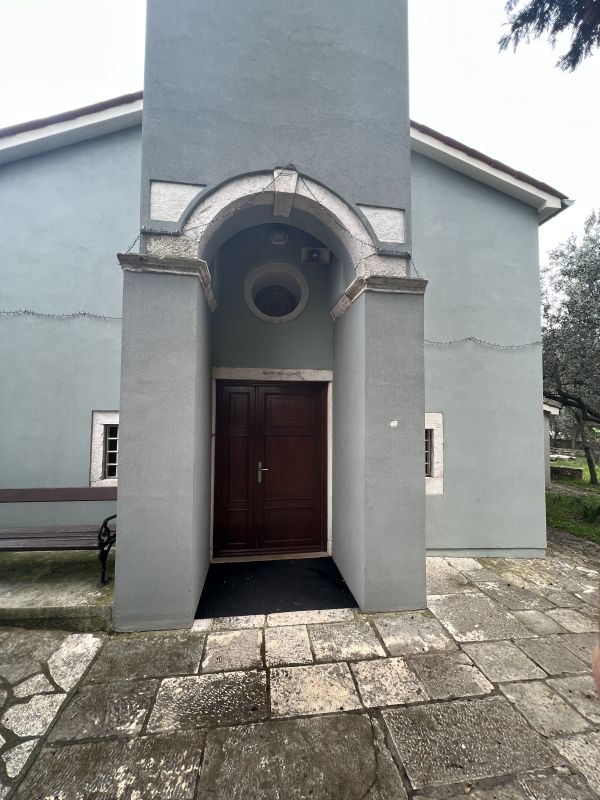 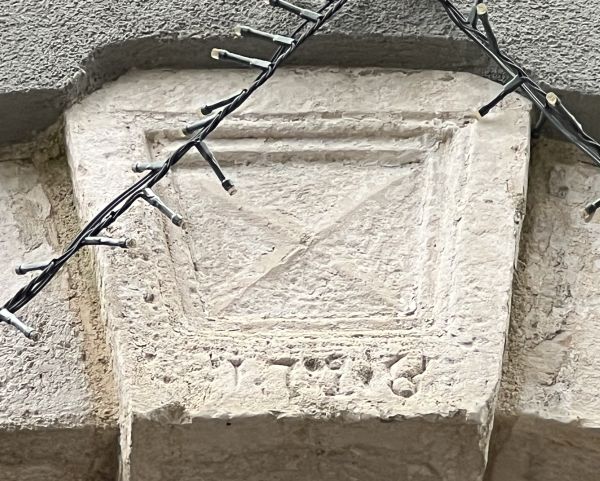 | rectangular | Natpis na zaglavnom kamenu na luku iznad ulaza u crkvu. | Upitno čitanje broja 9. | |||
| PP-16.1.1 | 1899 | 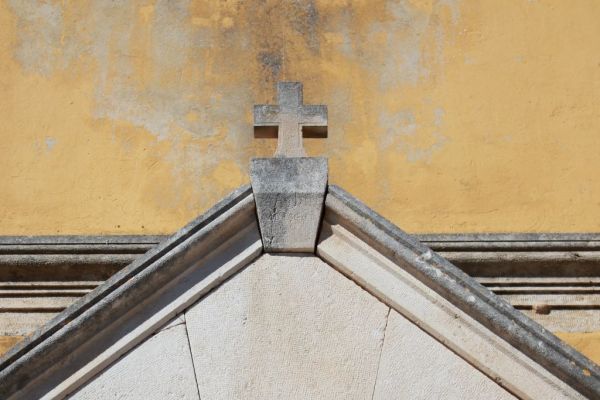 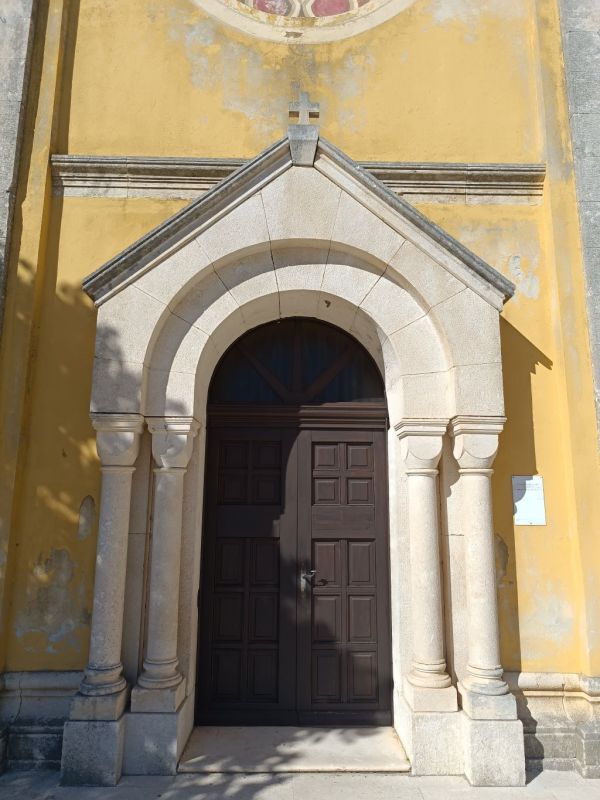 | A(NNO) · D(OMINI) / MD CCC XC IX | trapezoid | On the top (keystone) of the main portal, the facade of the church on the southwest side | The inscription is located on the keystone of the main portal of the church, at the top of the profiled gable that surmounts the semicircular, stepped arches of the entrance. The portal arches rest on columns on each side, which stand on square pedestals. The keystone is trapezoidal in shape and is split down the middle. The inscription is positioned in the lower half of the keystone.
At the top, there is a stone Latin cross. Dimensions not taken because of the inaccessibility. | ||
| PP-16.1.3 | 1753 | 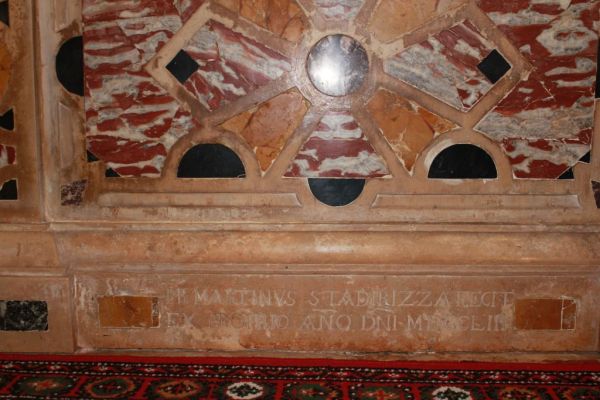 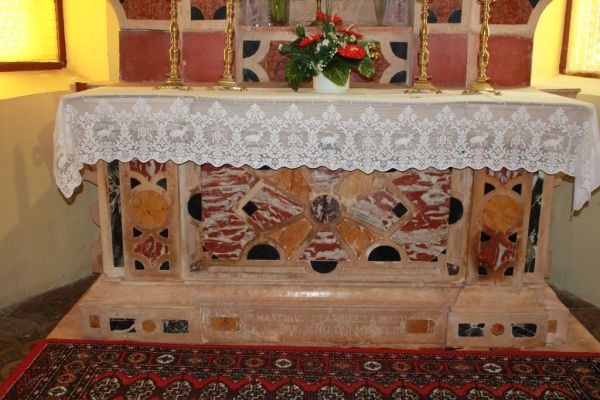 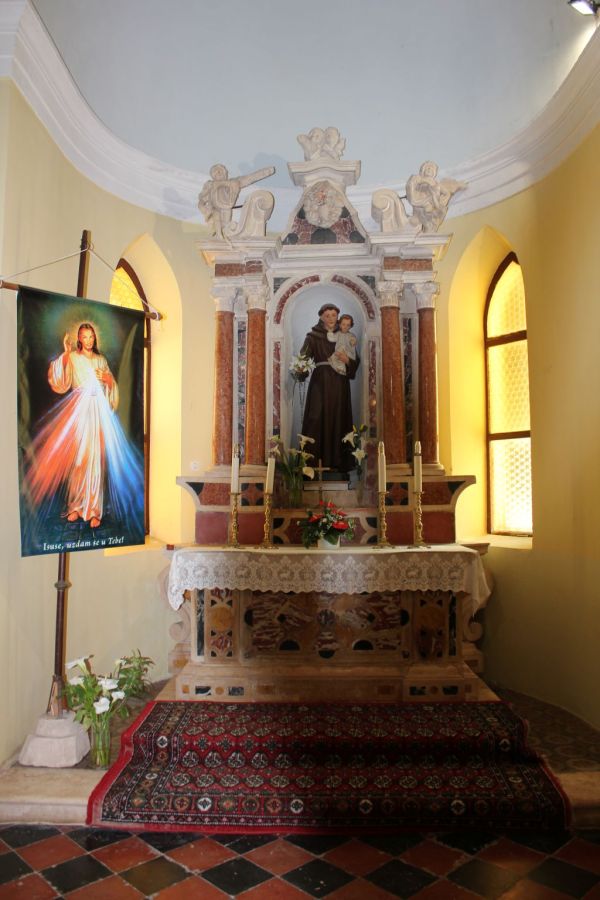 | P(ATE)Ra) MARTINUS STADIRIZZA FECIT / EX PROPRIO AN(N)O D(OMI)NI MDCCLIII | rectangular | Base of the baroque altar of St. Anthony of Padua, chapel on the southeast side | The inscription is located on the altar of St. Anthony of Padua, raised on steps. It is carved on a rectangular subpedaneum, above which rises the stipes. The subpedaneum, as well as the stipes and the upper part of the altar, are decorated with multicolored marble inlays. 'A' has a downward-bent pointed crossbar. | a) Without a sign of abbreviation. | |
| PP-17.21.1 | 1904 | 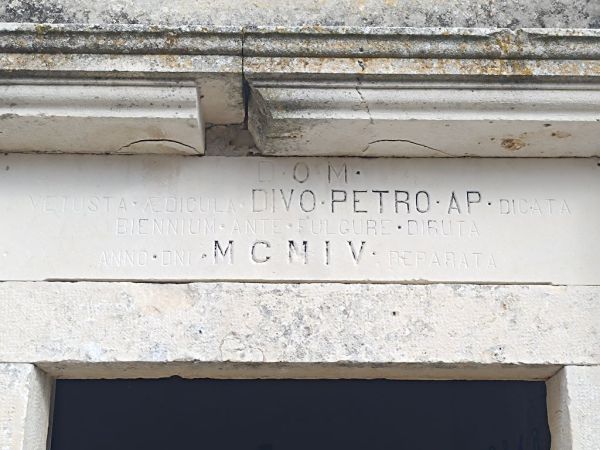 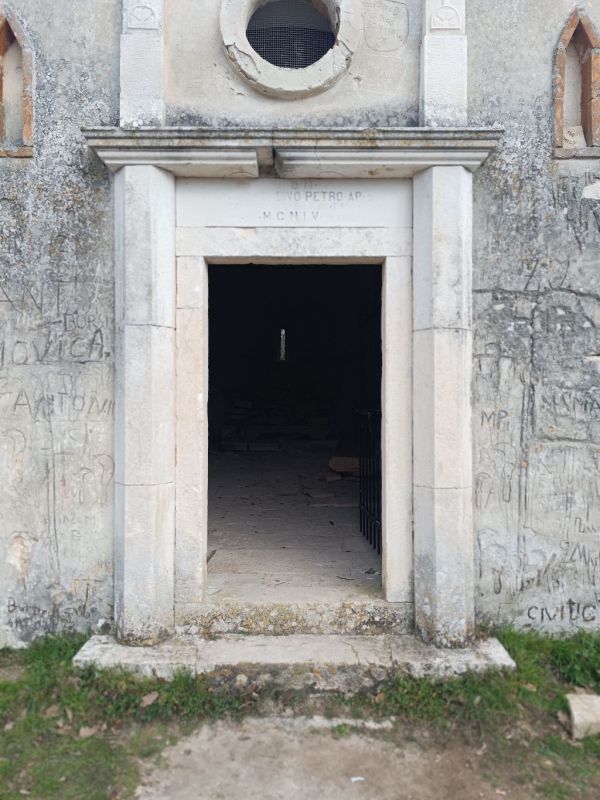 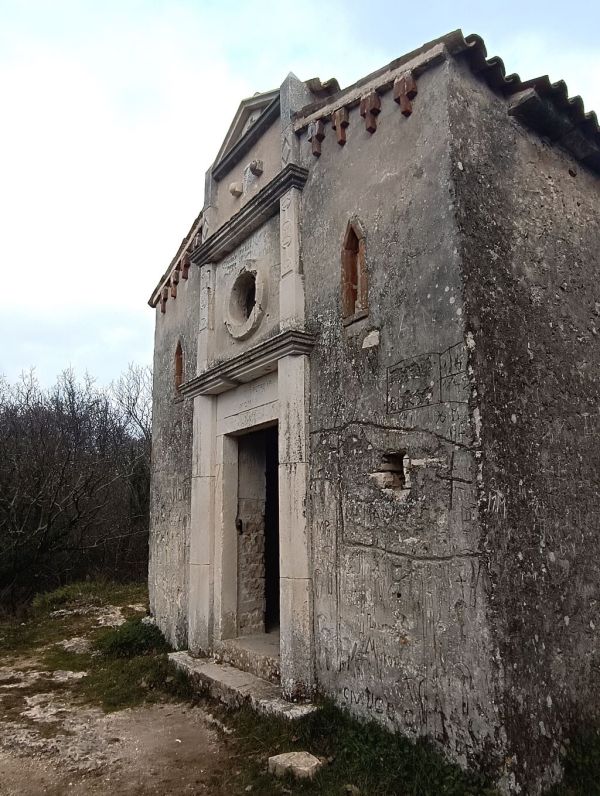 | rectangular | The beam above the main entrance of the church, western facade. | The letters are painted in black. | The inscription is located on the beam above the lintel of the main entrance to the church on the western facade. The inscription is carved, and the letters are additionally painted in black. Above the beam is a multi-profiled and prominent wreath. The side of the main entrance is flanked by two polygonal pilasters, which also support the wreath at the top. | ||
| PP-18.1.1 | 1695 | 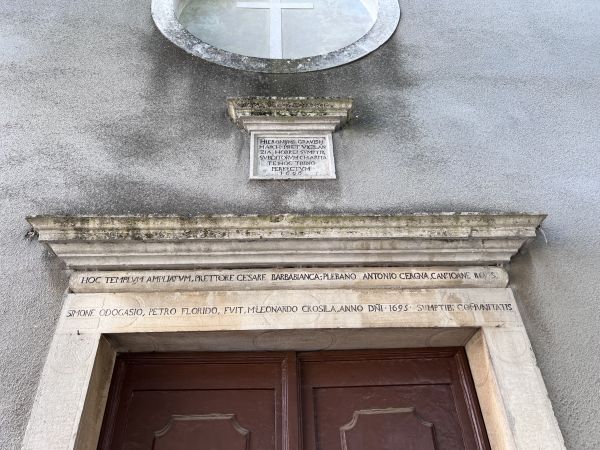 | HOC TEMPLVM AMPLIATVM, PRETTORE CESARE BARBABIANCA; PLEBANO ANTONIO CERGNA, CAN(ONIC)IS(?) IOANE ROVIS // SIMONE ODOGASIO, PETRO FLORIDO, FVIT, M(AGISTR)O LEONARDO CROSILA, ANNO D(OMI)NI · 1695 · SVMPTIB(VS) COM(M)VNITATIS | rectangular | The western facade of the church, the lintel above the main entrance. | The inscription is carved into the lintel of the main entrance to the church and on the beam above, on the church’s western facade. Above them is a stepped, profiled cornice.The lintel's front and underside, as well as the upper part of the doorposts, are decorated with elliptical fields in shallow relief. The inscription is painted in black. | 'A' has a downward-bent pointed crossline. Final 'IS' in 'CANONICIS' and 'O' in 'MAGISTRO' are superscript. Nedostaju dimenzije. | |
| PP-18.1.10 | 1707 | 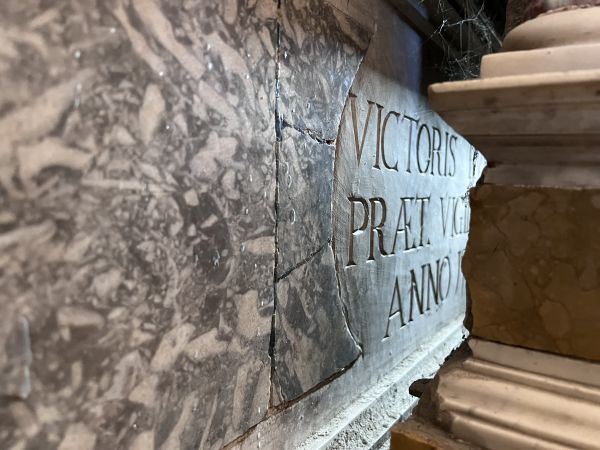 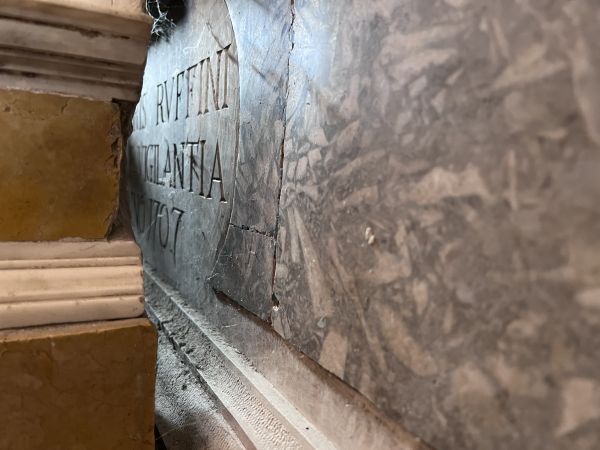 | VICTORIS RVFFINI / PRAET(ORIS) VIGILANTIA / ANNO 1707 | other | The main altar of the church. | A circular field with an engraved inscription. The field is surrounded by a marble frame on the sides, with a profiled border at the bottom. | The inscription is carved on the altar area, but it is obscured by a later-added marble tabernacle. The altar is raised on three steps. The altar’s base is decorated with marble inlays in geometric patterns. In the center of the mensa stands the tabernacle, behind which is the carved inscription. The arch of the altar retable is framed by two columns with Corinthian capitals, and behind them are pilasters that broaden at the bottom into volutes. The key stone bears the coat of arms of the patron, Viktor Ruffini. Above, a wreath extends, and at the very top, there is a divided semicircular pediment.
Measures could not be taken because of inaccessibility. Nedostaju dimenzije. | |
| PP-18.1.11 | 1771 | 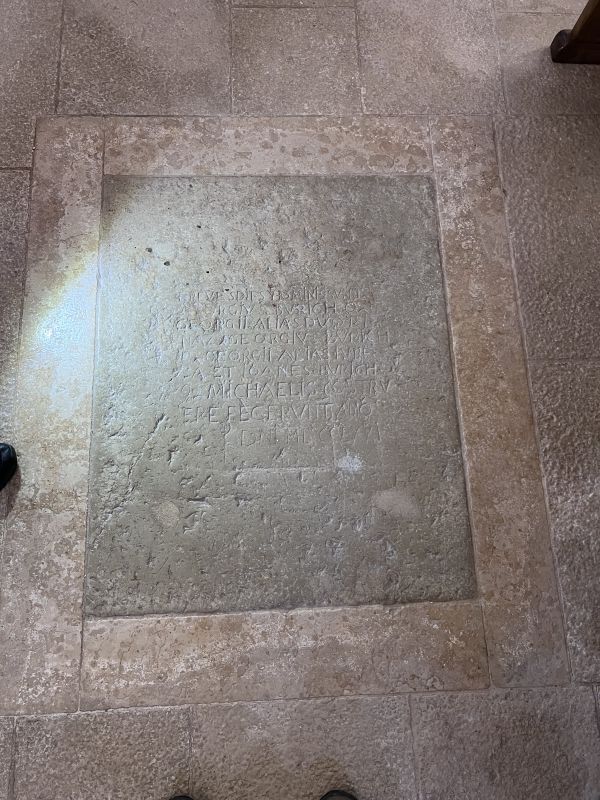 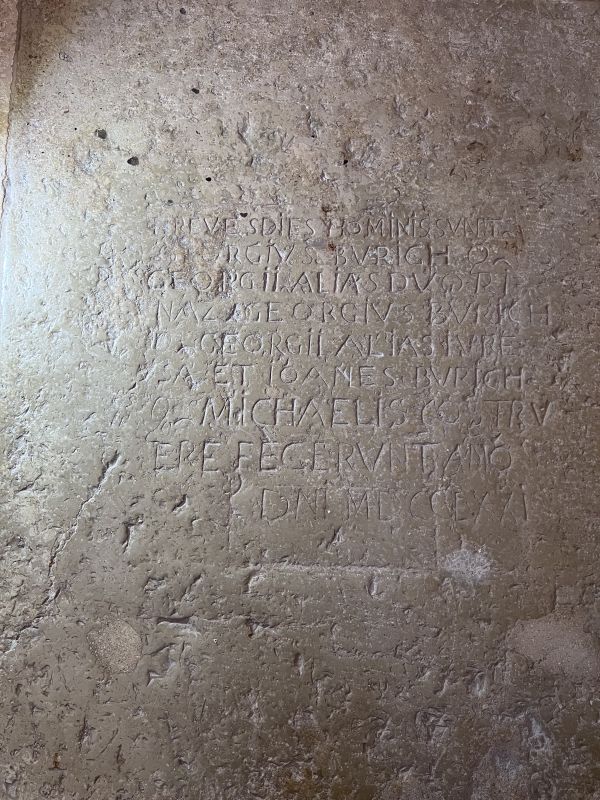 | BREVES DIES HOMINIS SVNT / GEORGIVS BVRICH Q(VONDAM) / GEORGII ALIAS DVORI/NAZ ET GEORGIVS BVRICH Q(VONDAM) GEORGII ALIAS IVRE/SA ET IOANES BVRICH / Q(VONDAM) MICHAELIS COSTRV/ERE FECERVNT ANO D<OMI>NI MDCCLXXI | rectangular | A tombstone on the church floor. | A rectangular tombstone set into the church floor, fitted within a frame of the same shape. The inscription field, without a border, is centered on the slab. No decoration. | Meden 1
'Q' is abbreviated by means of an arch oriented like and inverted 'U', added to the right of the letter. Nedostaju dimenzije. | |
| PP-18.1.12 | 1714 | 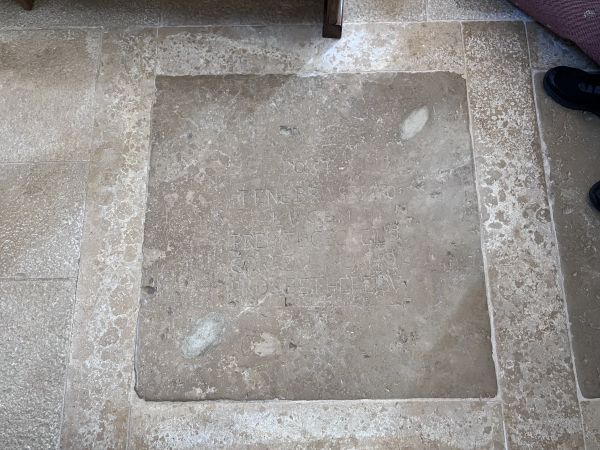 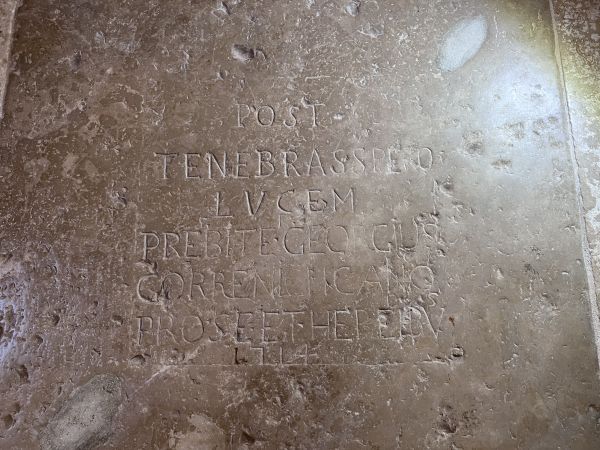 | POST / TENEBRAS · SPERO / LVCEM / PRESBITERa) · GEORGIVS / GORRENICH · CANO / PRO · SE · ET HEREDIBVSb) / 1714 | rectangular | A tombstone on the church floor. | A square tombstone set into the church floor, fitted within a frame of the same shape. The inscription field is square, bordered, and centered on the slab. No decoration. | Meden 3 Nedostaju dimenzije. | a) 'S' is written above 'E'; the final 'R' is suprascript between the words. b) 'D' is possibly written within 'E'; 'S' is added above 'V'. |
| PP-18.1.15 | 1714 | 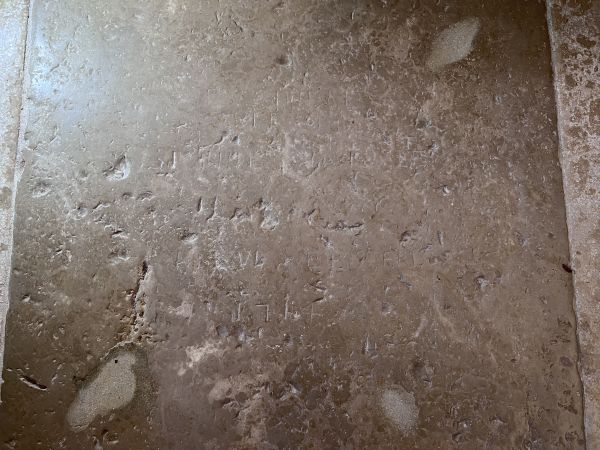 | EX CINERE / VITAM / IOANNE [– – –] / [– – –] / [– – –]VI [– – –]VE POSTERIS / 1714 | rectangular | A tombstone on the church floor. | A square tombstone set into the church floor, fitted within a frame of the same shape. The inscription field, without a border, is centered on the slab. No decoration. | Meden 4
Life from ashes. Ivan [– – –] successors. 1714 Nema dimenzija. | |
| PP-18.1.17 | 1779 | 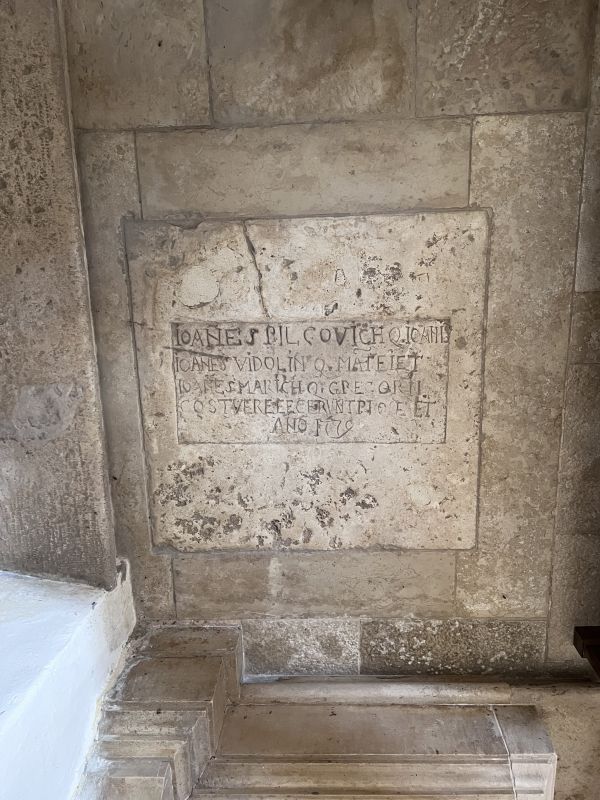 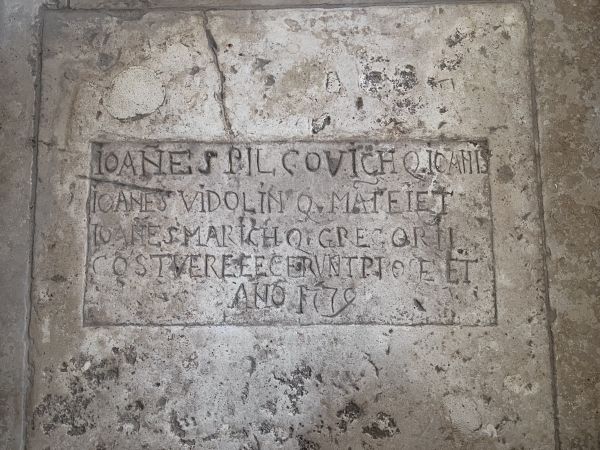 | IOAN(N)ES PILCOVICH Q(VONDAM) IOANIS / IOANES VIDOLIN Q(VONDAM) MAT(THA)EI ET / IOANES MARICH Q(VONDAM) GREGORII / COST<R>VERE FECERVNT PRO SE ET / <HEREDIBVS SVIS> ANO 1779 | rectangular | A tombstone on the church floor. | A square tombstone set into the church floor, fitted within a frame of the same shape. The inscription field is rectangular, bordered, and centered on the slab. No decoration. | Meden 7
'A' has a downward-pointed crossline. Capital 'I' has a dot above. Nedostaju dimenzije. | |
| PP-18.1.18 | 1715 | 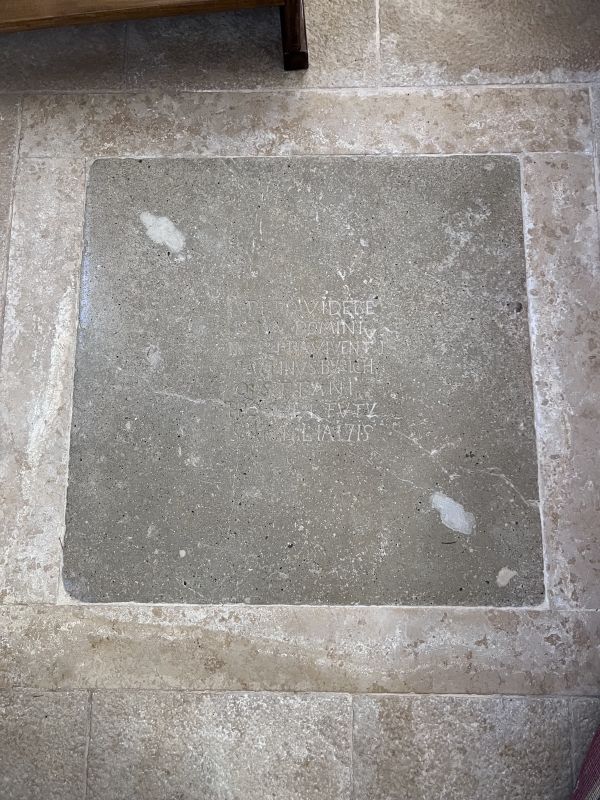 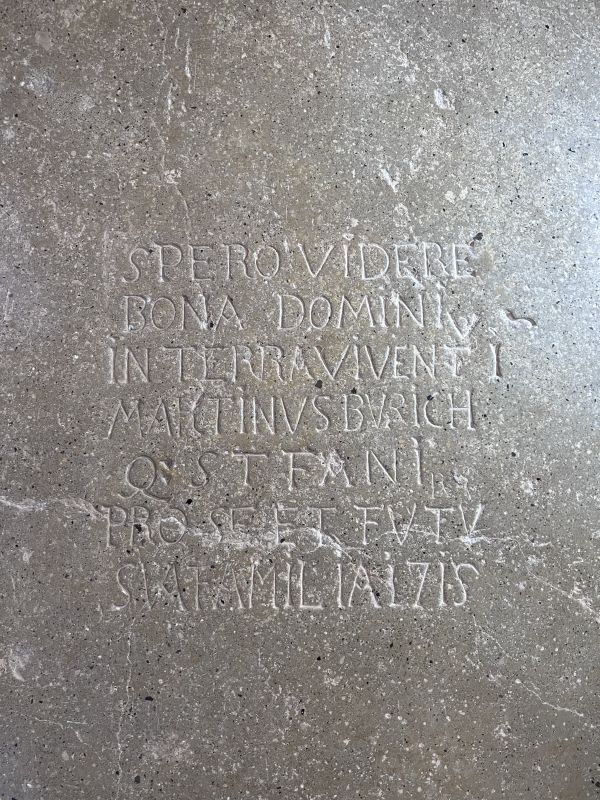 | SPERO VIDERE / BONA DOMINI / IN TERRA VIVENTIV(M)a) / MARTINVS BVRICH / Q(VONDAM) ST<E>FANI / PRO SE ET FVTVRA / SVA FAMILIA 1715c) | rectangular | A tombstone on the church floor. | A quadrangular tombstone placed in the floor of the church, fitted into a frame of the same shape. The inscription field, with a square border, is centered on the slab. No decorations. | Meden 8
Nedostaju dimenzije. Ps 27,13 | a) 'V' is added above 'T'; its tilde is to the right.
b) 'RA' is added above 'TV'. c) '5' is 'S'-shaped. |
| PP-18.1.19 | 1775 | 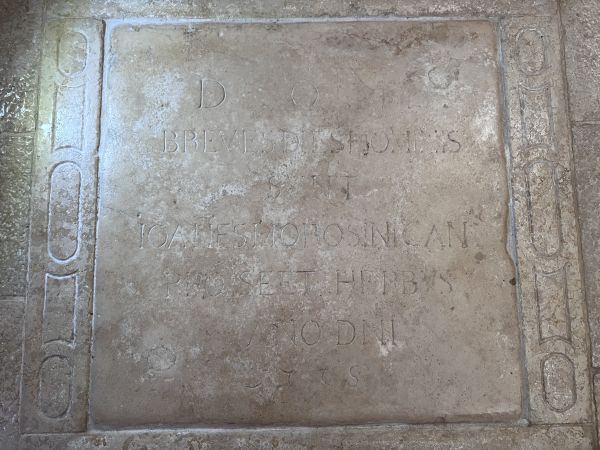 | D(EO) O(PTIMO) M(AXIMO) / BREVES DIES HOMINISa) / SVNT / IOAN(N)ES MOROSINI CAN(ONICVS)(?)b) / PRO SE ET HER<EDI>BVS / ANO D<OMI>NI / 1775c) | rectangular | A tombstone on the church floor. | A quadrangular tombstone placed in the floor of the church, fitted into a frame of the same shape. The inscription field, without a border, is centered and occupies most of the panel. The side edges of the frame are decorated with incised motifs — an alternating pattern of ellipses and rectangles whose shorter sides are drawn inward. | Meden 9
Nedostaju dimenzije. Cf. Iob 14,5 | a) The line is written as scriptio continua.
b) The line is written as scriptio continua. c) All lines in all numerals are curved; '5' is 'S'-shaped. |
| PP-18.1.2 | 1696 | 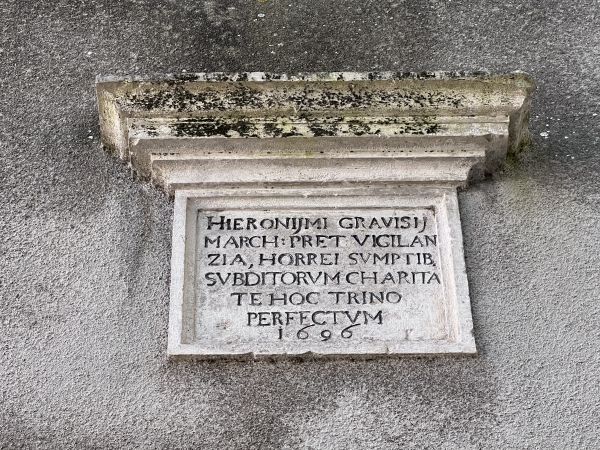 | HIERONIJMI GRAVISIJ / MARCH(IONIS) PRET(ORIS) VIGILAN/ZIA, HORREI SVMPTIB(VS) SVBDITORVM CHARITA/TE HOC TRINO / PERFECTVM / 1696 | rectangular | Facade, inscription above the lintel of the church entrance. | The inscription plaque is embedded in the wall above the main entrance on the western facade of the church. The inscription field is recessed and bordered by a double-profiled, simple edge. The inscription is centered, and the letters are painted in black. Above the plaque, there is a multi-profiled cornice that steps downwards. | [Reference] The text is centered, written in small capitals (only the first letter of the inscription is larger; 'J' is extended below the baseline). The letters are filled with well preserved black ink. | |
| PP-18.1.20 | 1771 | 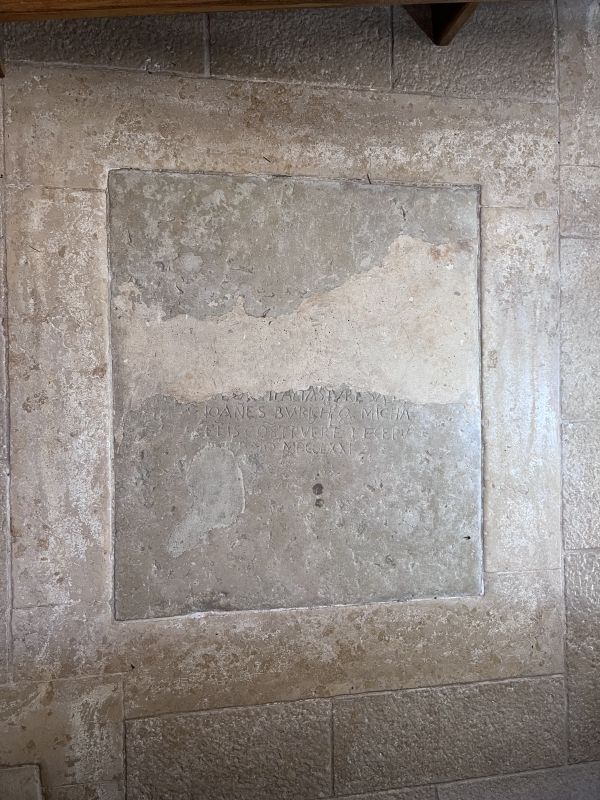 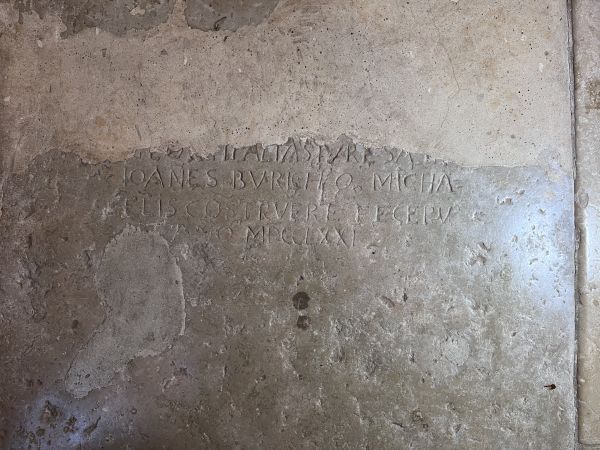 | [– – –] / GEORGII ALIAS IVRESA E[T] / IOANES BVRICH Q(VONDAM) MICHA=/ELIS CO(N)STRVERE FECERV/[N]T / AN(N)O MDCCLXXI | rectangular | A tombstone on the church floor. | A square tombstone set into the church floor, fitted within a frame of the same shape. The inscription field, without a border, is centered on the slab. No decoration. | Meden 10
The upper part of the inscription is destroyed. Only the lower part of most of the first legible line is visible. Nedostaju dimenzije. In the upper part of the inscription field, the plaque is damaged. These areas have been subsequently filled with a binding material. | |
| PP-18.1.22 | 1715 | 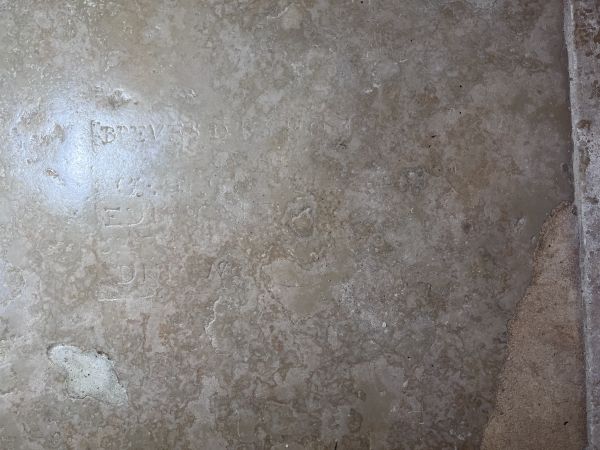 | BREVES DIES HOMINIS / SVNT / GEORGIVS M(E)DE(N) / EDIFICARE F(ECIT) [PRO](?) / SE ET [HEREDIBUS](?) / [ANNO](?) D(OMI)NI MDCCXV | rectangular | A tombstone on the church floor. | A square tombstone set into the church floor. The inscription field is square, bordered, and centered on the slab. No decoration. | Meden 14
Nedostaju dimenzije. Job 14,5 | |
| PP-18.1.24 | 1742 | 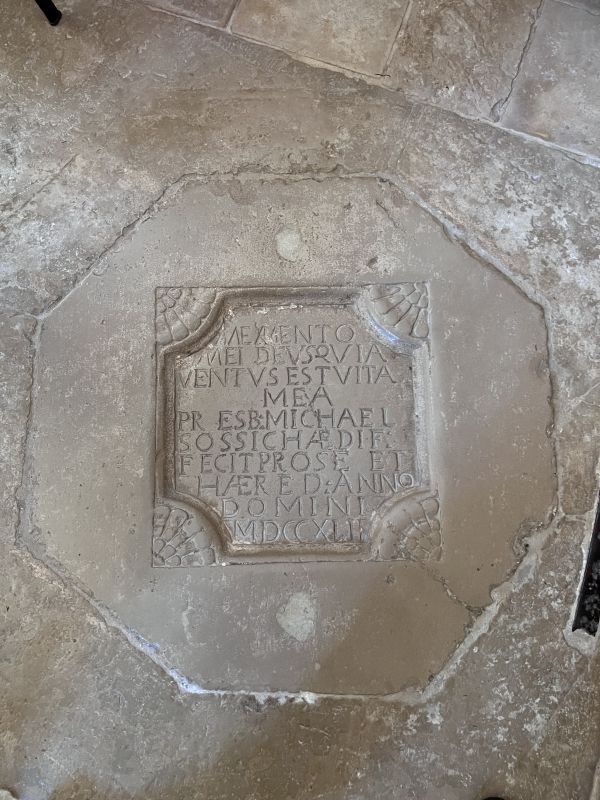 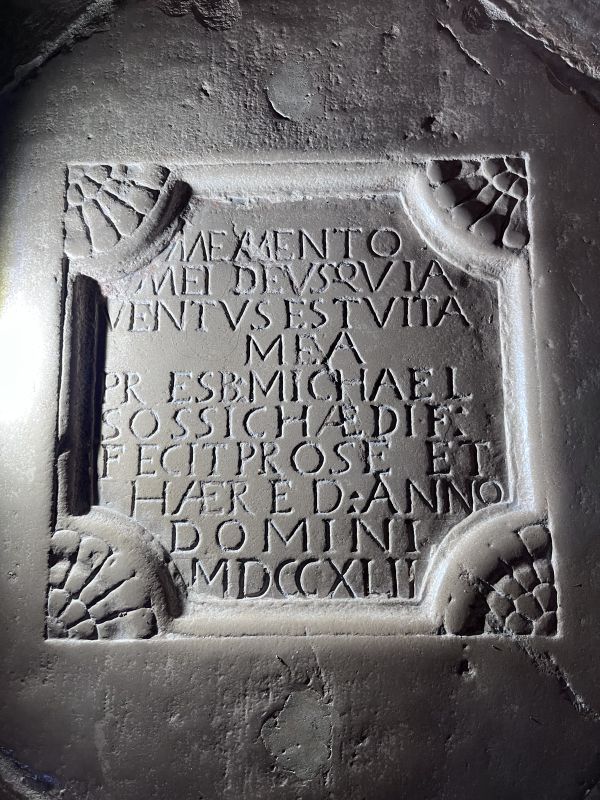 | MEMENTO / MEI DEVS QVIA / VENTVS EST VITA / MEA / PRESB(ITER) MICHAEL / SOSSICH AEDIF(ICARE) / FECIT PRO SE ET / HAERED(IBVS) ANNO / DOMINI / MDCCXLII | rectangular | A tombstone on the church floor. | An octagonal tombstone in the church floor, set within a frame of the same shape. The inscription field is square, located in the center of the slab. The square inscription field features quarter-circular inlets at the corners, relief-decorated with a flower motif (?) that has petals fanning out. The edge of the inscription field is profiled. The inscription within the field is centered. | Meden 23
The inscription is centered. Some words are not divided by a blank space. Nedostaju dimenzije. Cf. Ps 130,1 | |
| PP-18.1.26 | 1742 | 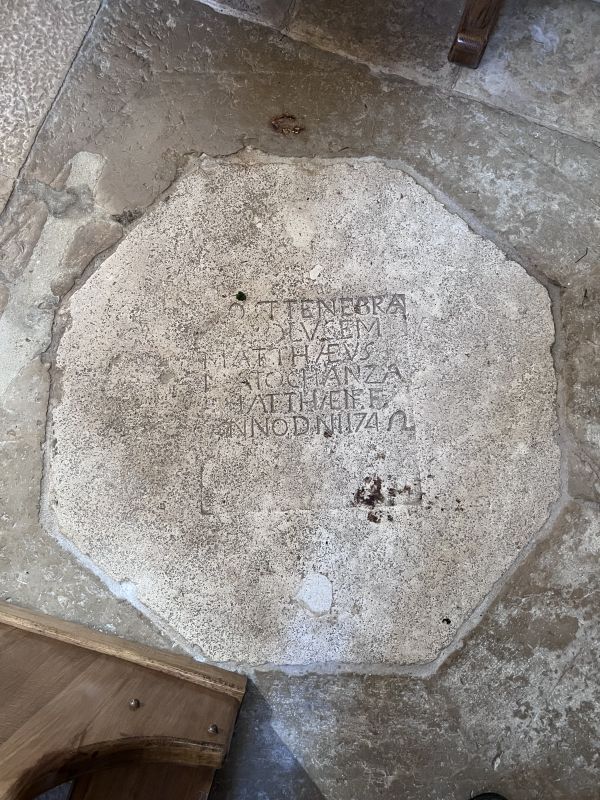 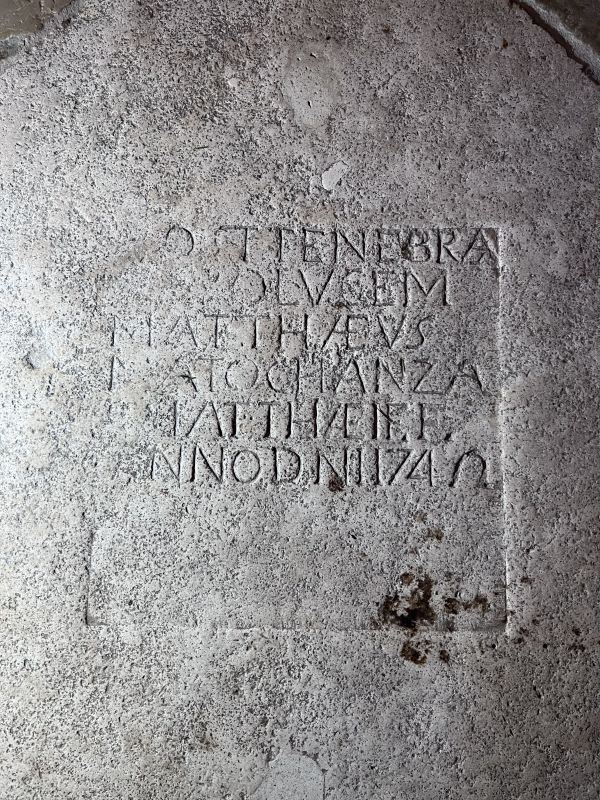 | POST TENEBRA/[S SPER]Oa) LVCEM / MATTHAEVS MATOCHANZA / Q(VONDAM) MATTHAEI F(ECIT) F(IERI) / ANNO D(OMI)NI 1742b) | rectangular | A tombstone on the church floor. | An octagonal tombstone in the church floor, set within a square frame with an engraved octagonal border. The square inscription field, with a border, is centered on the slab. No decoration. | Meden 20
The text is centered. Nedostaju dimenzije. | |
| PP-18.1.27 | 1710 | 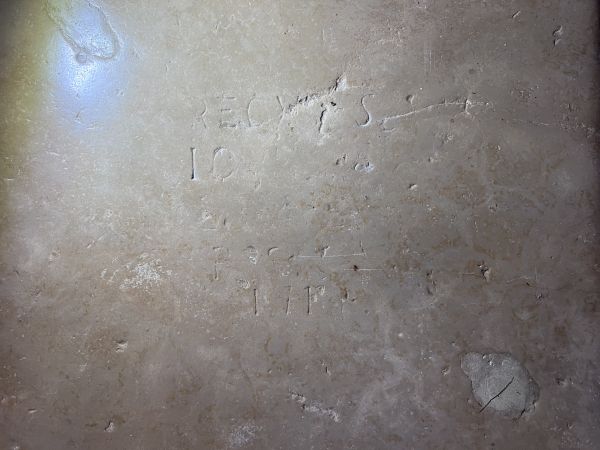 | REQV[.] S [– – –] / IO[– – –] / [– – –] / [.]P[ER] S[E] – – –] / 171[.] | rectangular | A tombstone on the church floor. | A tombstone set into the church floor. The inscription field, without a border, is located in the center of the stone. No decorations. | Meden 11, 12, 15, 19 ILI 21, jako izlizan natpis Nedostaju dimenzije. | |
| PP-18.1.29 | 1771 | 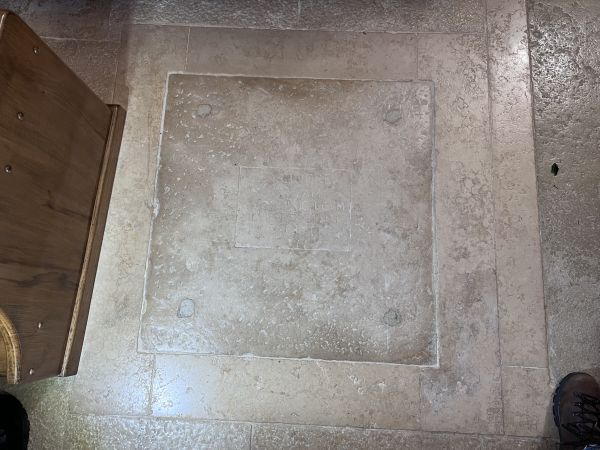 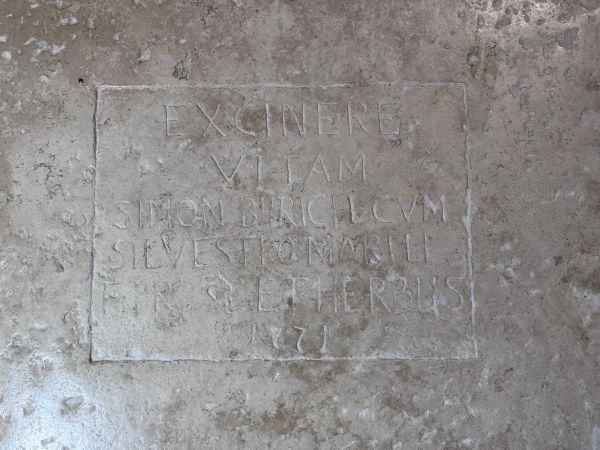 | EX CINERE / VITAM / SIMON BURICH CVM / SILVESTRO MARIH / F(ECIT)a) PRO SE ET HER(EDI)BUSb) / 1771 | rectangular | A tombstone on the church floor. | A quadrangular tombstone placed in the floor of the church, fitted into a frame of the same shape. The inscription field, with a rectangular border, is centered on the slab. No decorations. | Meden 16
The text is centered. 'A' has a downward-bent and pointed horizontal bar. a), b) Without a sign of abbreviation. Nedostaju dimenzije. | |
| PP-18.1.3 | 1718 | 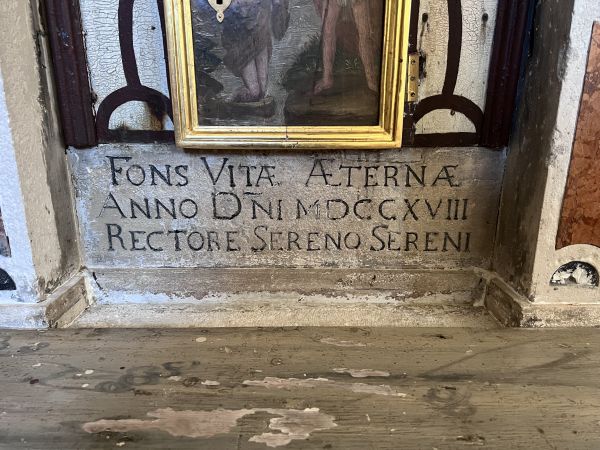 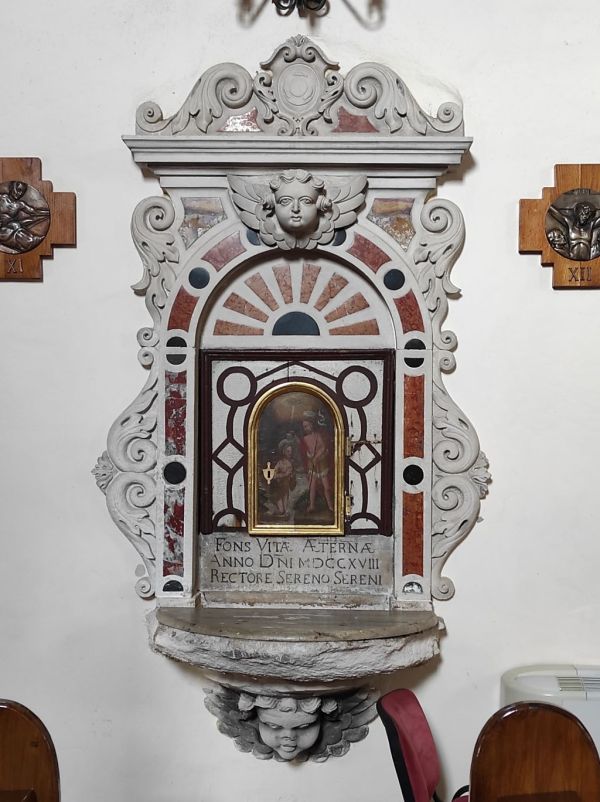 | FONS VITAE AETERNAE / ANNO D(OMI)NI MDCCXVIII / RECTORE SERENO SERENI | rectangular | Left wall of the church. | The inscription is integrated into the baptismal font, which is embedded in the northern side wall of the church. The stone container for the baptismal water is prominently highlighted in a semi-circular shape. Below the container is a head of an angel with wings, supporting the container, and above it is a shallow niche. At the bottom of the niche, there is an inscription carved in a rectangular field, with the letters painted in black. Above the inscription are wooden doors with a gilded trim, depicting the scene of Christ's baptism. At the top of the niche, the motif of the angel's head is repeated. Above it, there is a multi-profiled cornice, and in the center above the cornice is the family coat of arms (three dolphins in a circle) of the podestà Serena Sereni. The upper, vertical part of the baptismal font is adorned with colorful marble cladding. On the sides and at the top, the font is decorated with reliefs of vegetal motifs that form volutes. | The text is centered.
Letters are small capitals, the beginning of every word is capitalised. Nedostaju dimenzije. | |
| PP-18.1.31 | 1771 | 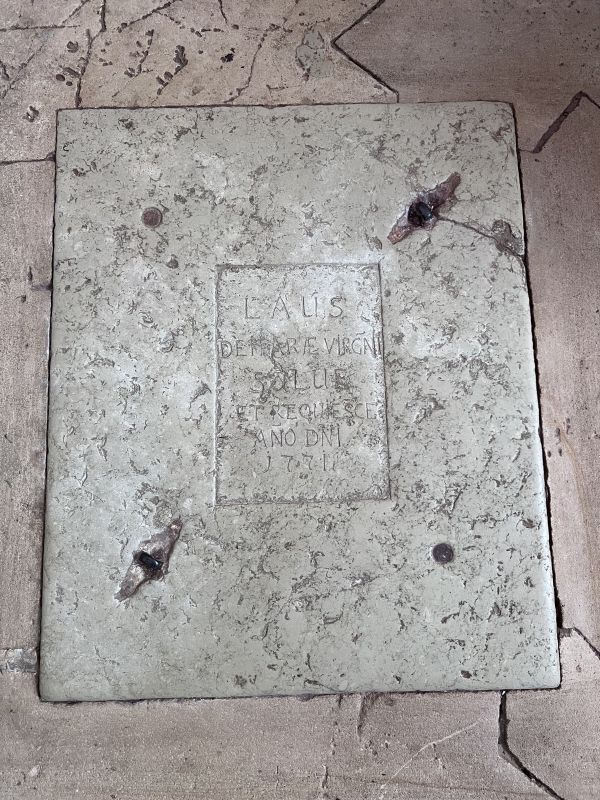 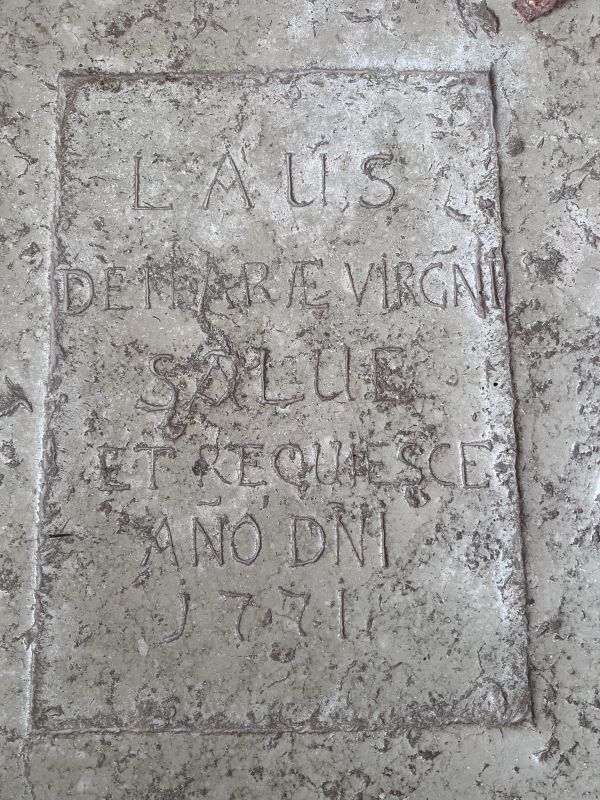 | LAUS / DEIPARAE VIRG(I)NI / SALUEa) / ET REQUIESCE / AN(N)O D(OMI)NI / 1771 | rectangular | A tombstone on the church floor. | A smaller rectangular tombstone in the floor of the church. A rectangular inscription field with a border is located in the center of the stone. Metal pins for lifting the slab are placed in two opposite corners. No decorations. | Meden
Text is centered. Letter height varies among different lines. 'A' has a downward-bent pointed crossbar. Nedostaju dimenzije. | a) Corrected from 'SOLUE'. |
| PP-18.1.32 | 1771 | 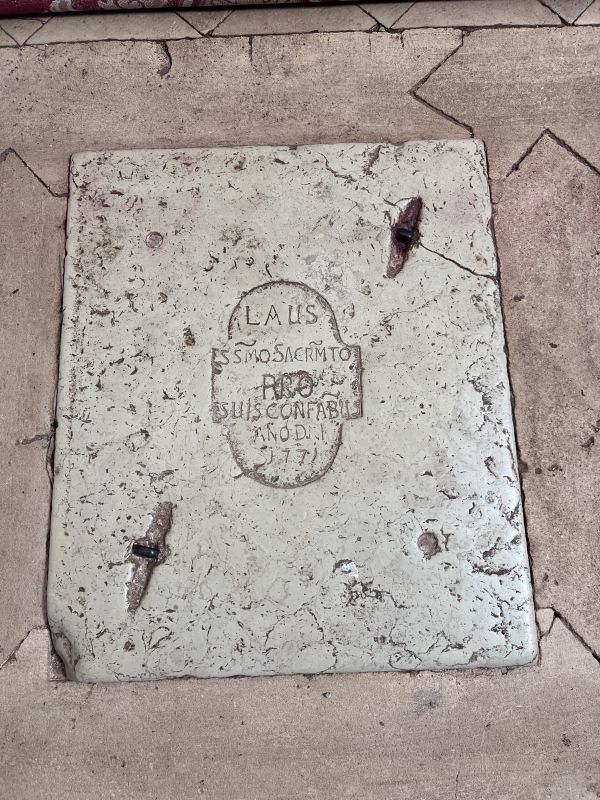 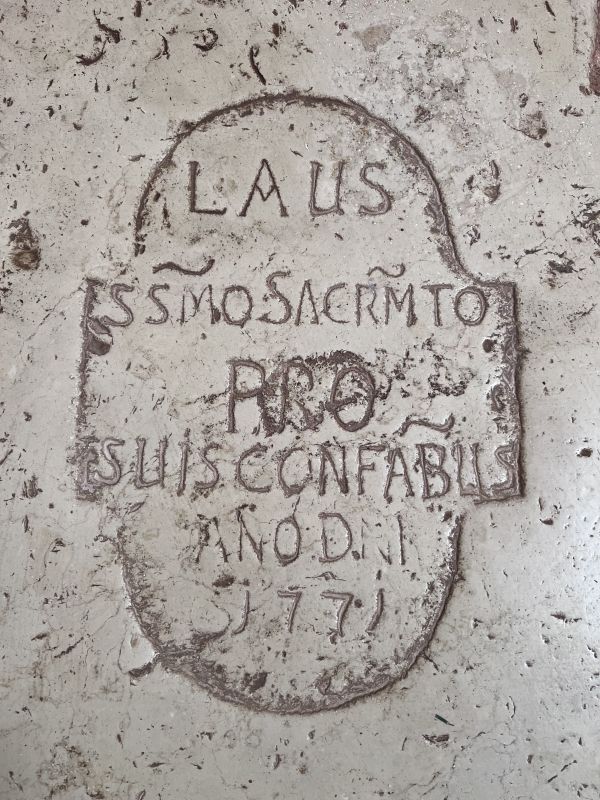 | LAUS / S(ANCTIS)S(I)MO SACR(A)M(EN)TO / PROa) / SUIS CONF(R)A(TRI)BUS AN(N)O D(OMI)NI / 1771 | other | A tombstone on the church floor. | A smaller rectangular tombstone in the floor of the church. An elliptical inscription field with square projections on the sides is centered on the stone. Metal pins for lifting the slab are placed in two opposite corners. No decorations. | Meden
'A' with downward-bent pointed crossbar. a) 'PRO' is considerably larger than the rest of the text. Nedostaju dimenzije. | |
| PP-18.1.4 | 1775 | 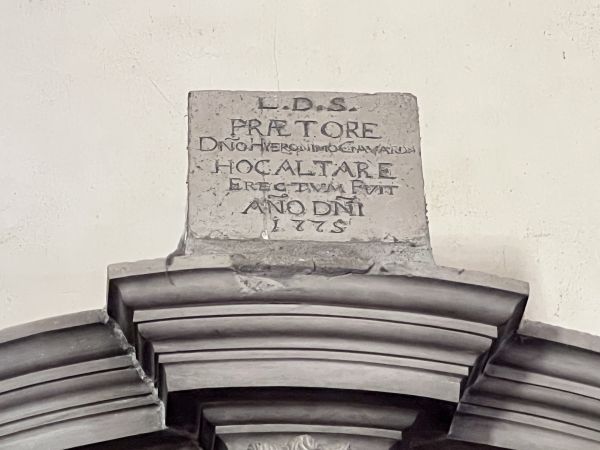 | L(AVS) D(EO) S(EMPER) / PRAETORE / D(OMI)NO HYERONIMO GAVARDOa) / HOC ALTARE / ERECTVM FVITb) / AN(N)O D(OMI)NI / 1775 | rectangular | Inscription slab above the side altar on the left wall of the church. | A square inscription slab with letters carved and painted in black. The inscription slab is located at the top of the marble altar dedicated to St. Anthony of Padua. It is centered on the center of the multi-profiled and parted semicircular pediment of the altar. | The text is centered. 'A' has a downward-bent pointed crossbar. Nedostaju dimenzije. | a) This line is written in small capitals. b) This line is written in small capitals. |
| PP-18.1.6 | 1699 | 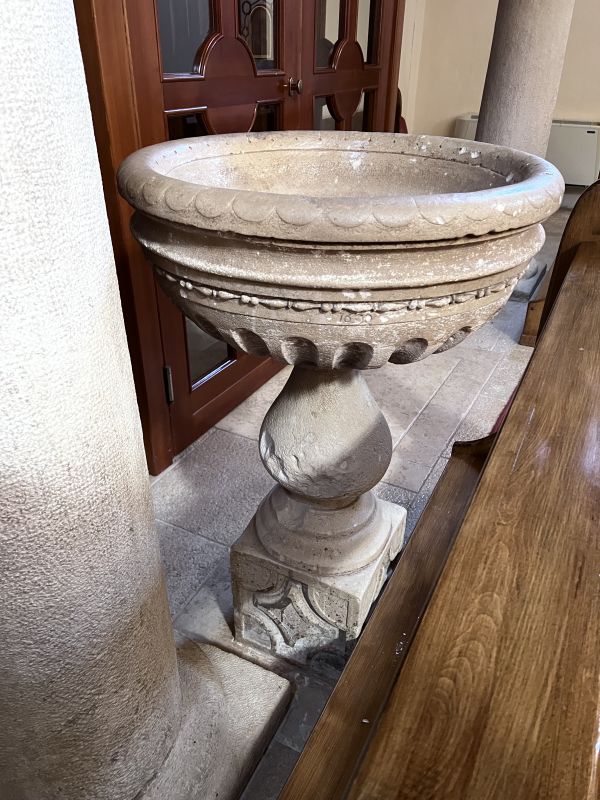 | 1699 | other | natpis na krstionici | The inscription with the carved year (arabic numerals) is located on one of the profiled rings of the baptismal font. The font is situated in the western part of the church interior, on the southern side after the entrance.
The freestanding stone baptismal font consists of a square pedestal decorated on all sides with geometric motifs in relief. It supports a column with a profiled base, and on the column rests the basin for blessed water. The stone basin in the lower part is decorated with radiating depressions resembling a flower or shell motif. In the upper part, the basin is multiple-profiled. One of the rings features a beaded astragal motif, while the other has the carved year. The upper edge of the basin is adorned with a decoration of beaded petals in shallow relief. | Nedostaju dimenzije. | |
| PP-18.1.7 | 1840 | 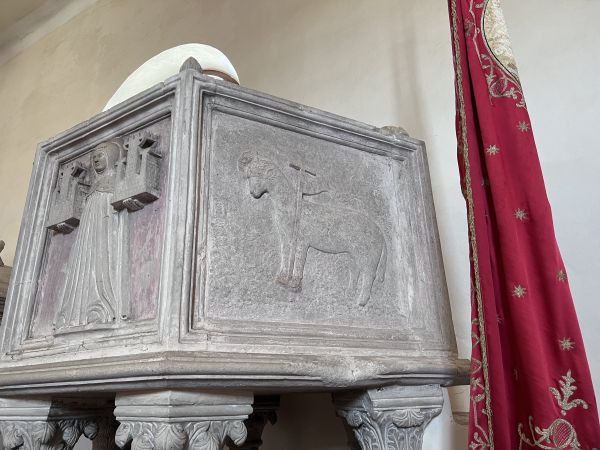 | AGNVS DEI | other | On the banner above the depiction of the Lamb of God on the pulpit | The inscription is located on a relief depicting the Lamb of God on one of the sides of the pulpit. The stone pulpit is situated along the northern side wall of the church. It stands on six pillars that end in Corinthian capitals, decorated with acanthus leaves that curl at the top, forming volutes. The pulpit is hexagonal. Five sides consist of enclosing panels, while the sixth side is open, serving as an entrance accessed by a stone staircase.
The panels of the pulpit are adorned with reliefs on the exterior. The first panel features a depiction of a cross with vegetal motifs (vine). The next panel is decorated with floral and leaf motifs, and in front of it stands a stand for a book. The small column supports an eagle (the symbol of St. John the Evangelist) with outspread wings, on which the book stand leans. The following panel depicts St. Sophia as the protector of Dvigrad, holding models of two cities in her hands. The fourth panel contains a depiction of the Lamb of God (Agnus Dei), which holds a triumphant banner shaped like a cross. The last panel faces inward and is not visible from the outside; it depicts the Virgin Mary on a throne. In her right hand, she holds a book, while with her left, she holds the Child Jesus on her lap, who is holding an apple in his hand. | The pulpit is from the late 15th century, but the relie with the inscription is from the mid-19th century.
Nedostaju dimenzije. https://www.ppmi.hr/hr/patrimonio/katalog-predmeta/item/1049/ https://www.ppmi.hr/hr/patrimonio/katalog-predmeta/item/1052/ | |
| PP-18.1.8 | 1923 | 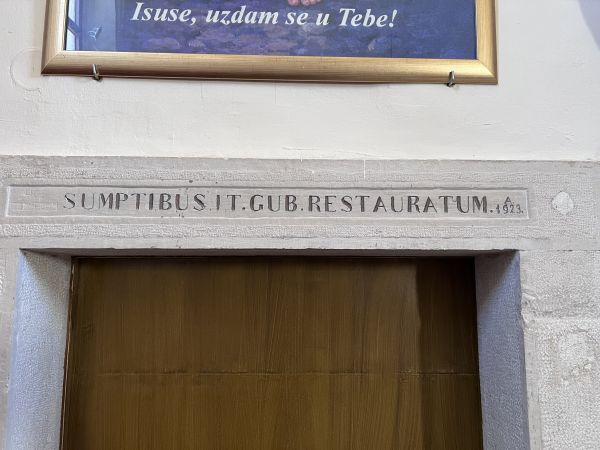 | HOC / TEMPLUM // SUMPTIBUS IT(ALICI) GUB(ERNII) RESTAURATUM. A(NNO) 1923. | rectangular | The inscription on the lintel above the left entrance to the sacristy. | The inscription is carved into the lintel of the sacristy, within a rectangular field with a profile along the edge. The field containing the inscription is smooth, while the rest of the lintel is bush hammered. Most of the letters of the inscription are painted in black, except for the beginning of the text on the left side. | 'HOC TEMPLUM' is smaller, placed to the left, differently made and without ink. The rest has a well-preserved ink. 'A(NNO) 1923.' is to the right, but has ink and is more similar in shape to the main part. Nedostaju dimenzije. | |
| PP-18.1.9 | 1923 | 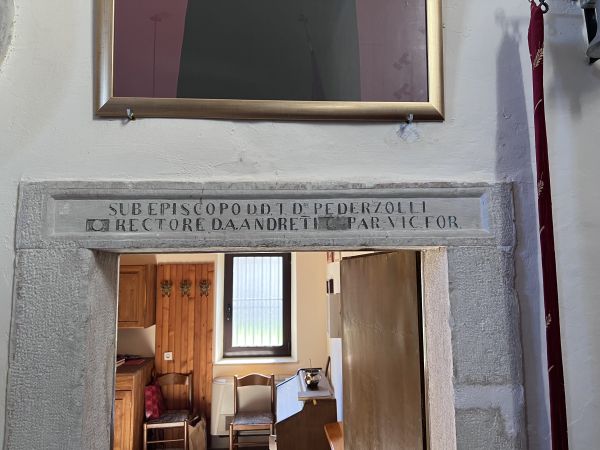 | SUB EPISCOPO D(OMINO), D(OMINO) T(RYPHONE) D(OCTO)REa) PEDERZOLLI / RECTORE D(OMINO) A(LOYSIO) ANDRET(T)ICOb), PAR(OCHO), VIC(ARIO) FOR(ANEO) | rectangular | The inscription on the lintel above the right entrance to the sacristy. | The inscription is carved into the lintel of the sacristy, within an inset rectangular field with a profiled edge. The field containing the inscription is smooth, while the rest of the lintel is bush hammered. The letters of the inscription are painted black. | Continuation of previous inscription. Nedostaju dimenzije. | a) 'RE' written in superscript and underlined. b) Area around 'C' seems to have been erased. 'O' is superscript. |
| PP-18.13.1 | 1722 | 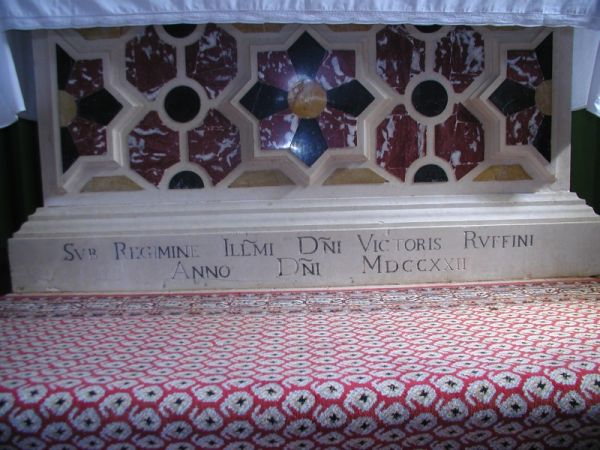 | SVB REGIMINE ILL(VSTRISSI)MI D(OMI)NI VICTORIS RVFFINI / ANNO D(OMI)NI MDCCXXII | rectangular | At the base of the altar. | The inscription is located on the altar (of St. Peter?) raised on steps. It is carved on a rectangular subpedaneum, above which rises a rectangular stipes covered with multicolored marble inlays. The letters of the inscription are painted in black. | Text is centered, in small capitals, all initials are capital. | |
| PP-18.13.4 | 1656 | 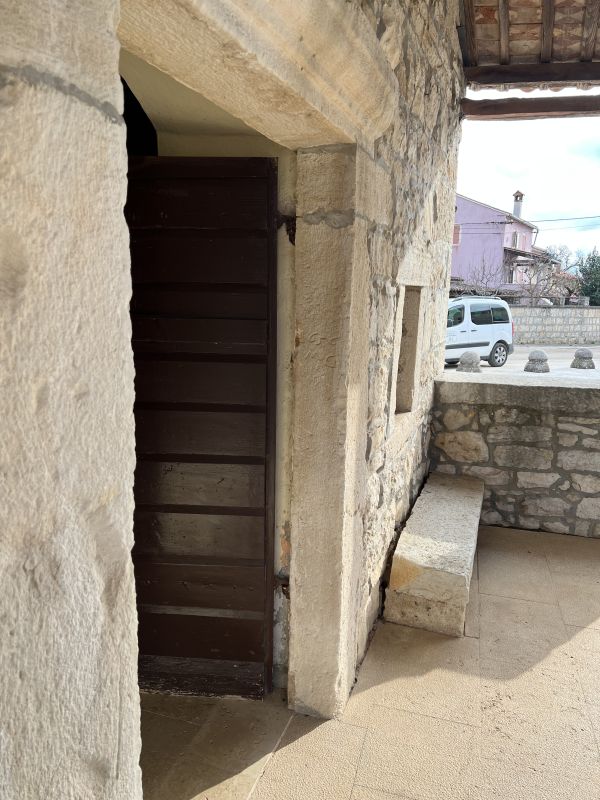 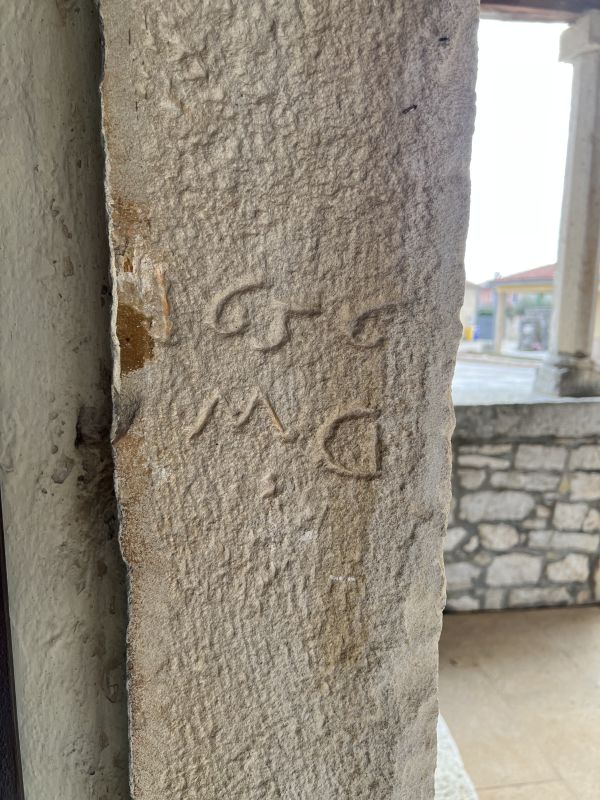 | rectangular | Na desnoj gredi ulaza u crkvu. | Slovo D je okrenuto zrcalno. | |||
| PP-18.13.5 | 1561 JL | 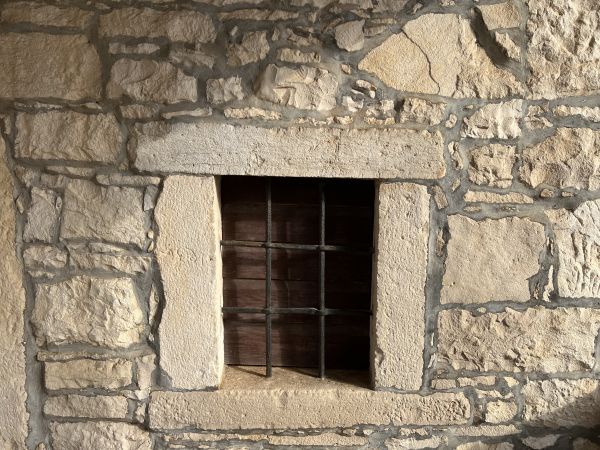 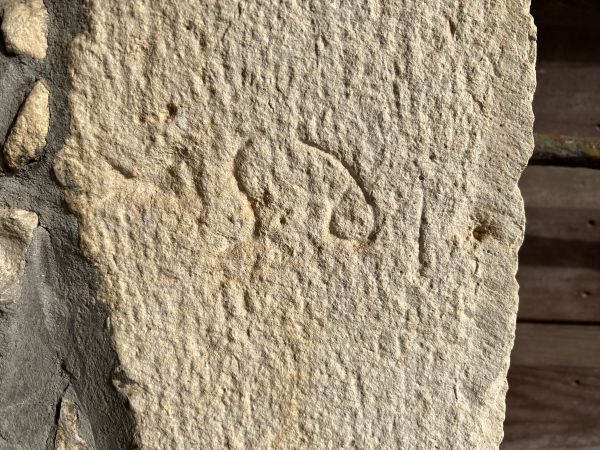 | rectangular | Na pročelju crkve, na desnom prozoru, na lijevoj erti. | Broj 6 je okrenut zrcalno. | |||
| PP-18.13.6 | 1799 | 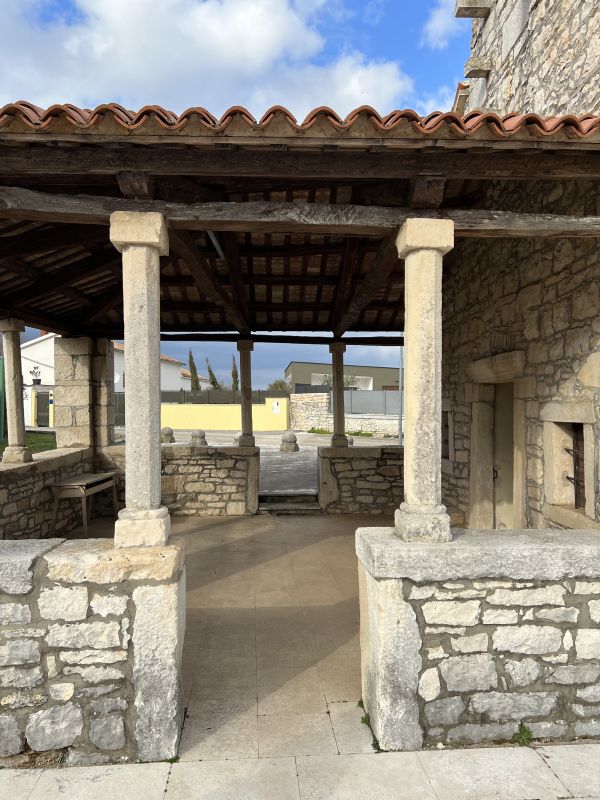 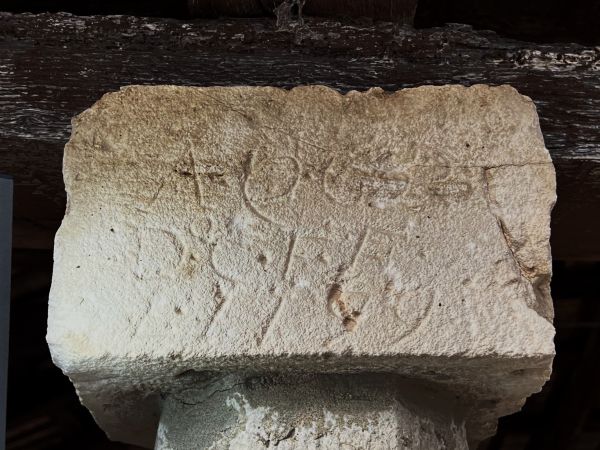 | rectangular | Na južnoj strani lopice, na lijevom kapitelu koji se nalazi na južnom ulazu u lopicu, na vanjskoj strani kapitela. | ||||
| PP-18.13.7 | 1705 | 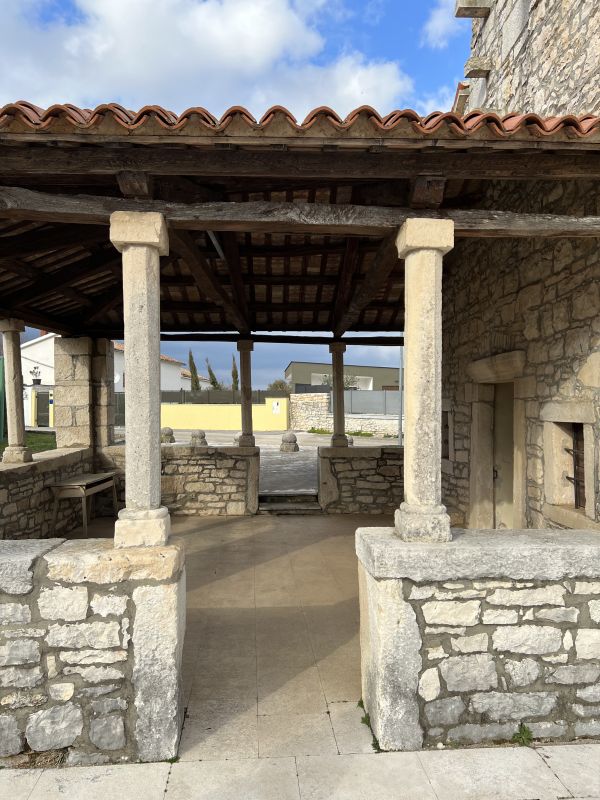 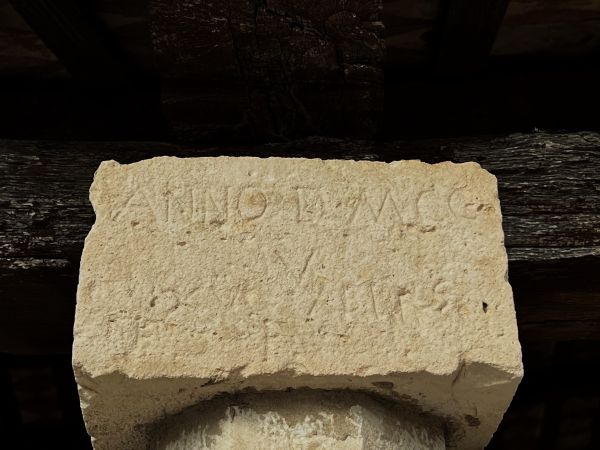 | ANNO 1705., 15. DECEMBRIS | rectangular | Na južnoj strani lopice, na desnom kapitelu koji se nalazi na južnom ulazu u lopicu, na vanjskoj strani kapitela. | |||
| PP-18.15.1 | 1725 | 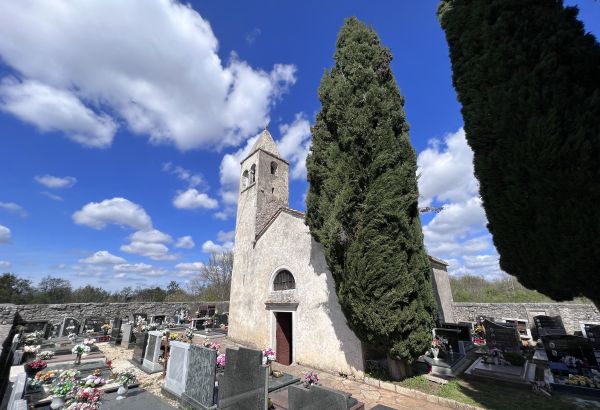 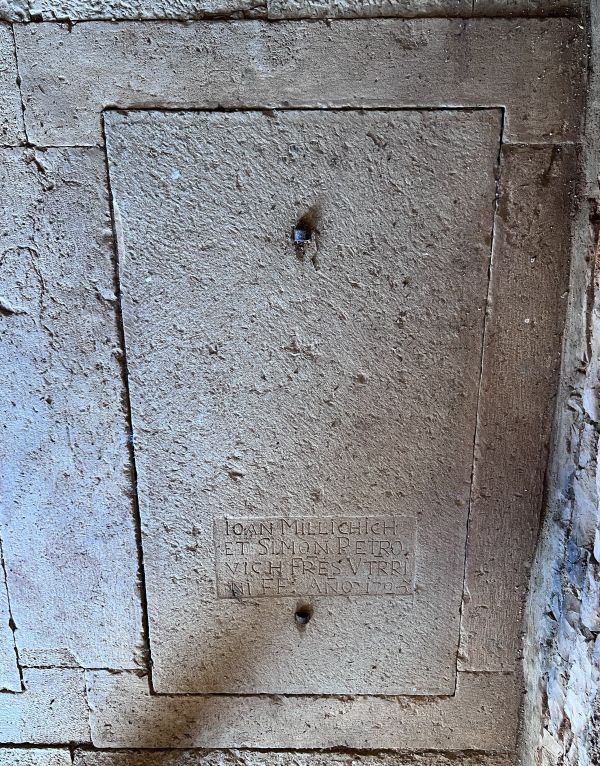 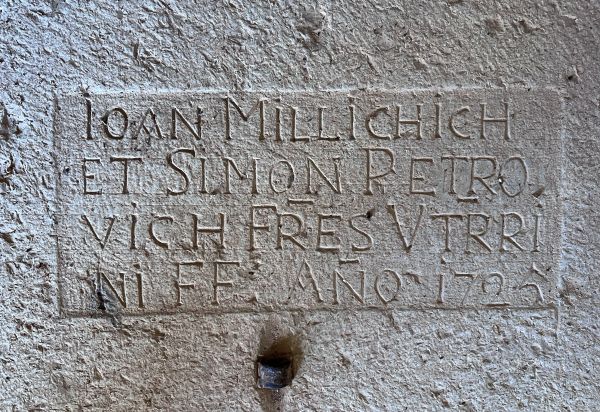 | IOAN MILLICHICH / ET SIMON PETRO/VICH FR(ATR)ES VT(E)RRI/NIa) F(IERI) F(ECERUNT) AN(N)O 1725 | rectangular | A tombstone on the church floor. | A rectangular tombstone in the floor of the church, set within a frame of the same shape. Metal fittings for rings are located at the center of the upper and lower sides of the slab. A rectangular inscription field with a border is positioned in the lower part of the slab. There are no decorations. | Small capitals with large initials (except 'ET').
'I' (and '1') has a dot above, 'A' has bent pointed crossbar.
| a) With a contracting bar. |
| PP-18.15.3 | 1779 | 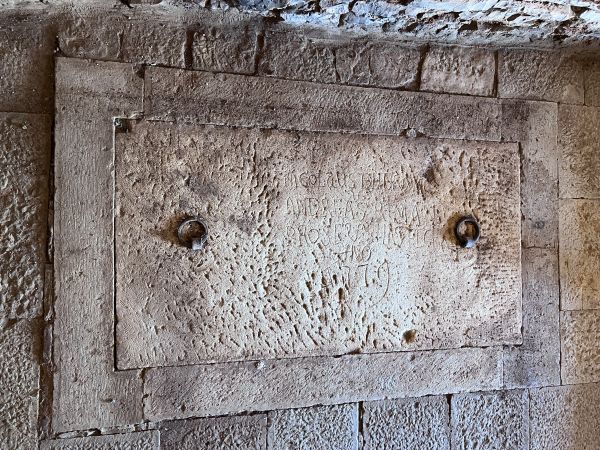 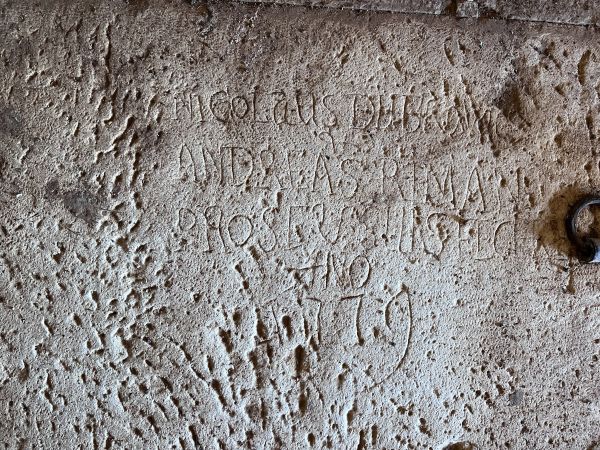 | NICOLaUS DUBRaVaC / ANDREAS RIMAN / PRO SE ET SUIS FECERE / ANO / 1779 | rectangular | A tombstone on the church floor. | A rectangular tombstone in the floor of the church, set within a frame of the same shape. Metal rings for lifting are located at the center of the upper and lower sides of the slab. The inscription is carved lengthwise down the center of the slab, without a border. There are no decorations. | Nedostaju dimenzije. | |
| PP-18.16.2 | 1731 | 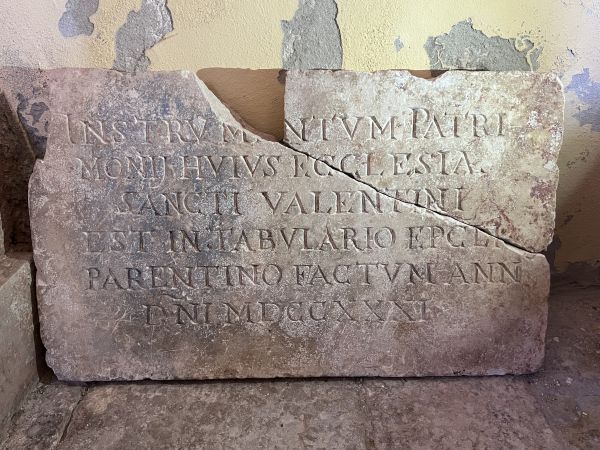 | INSTRVM[E]NTVM PATRI/MONIJ HVIVS ECCLESIAE / SANCTI VALENTINI / EST IN TABVLARIO EP(IS)C(OPA)LI / PARENTINO FACTVM ANNOa) / D(OMI)NI MDCCXXXI | rectangular | It is located in the church, next to the altar. | A rectangular inscription plaque, broken into two parts. One fragment is missing. There are no decorations. | The inscription is broken in two fragments, the smaler one of which contains upper-right part. The upper-central triangle-shaped segment with a part of letter 'M' and almost entire letter 'E' in 'INSTRVMENTVM' is missing.
The text is centered, the letters are small capitals (two first words begin with a large letter). Nedostaju dimenzije. | a) 'O' is smaller and superscript. |
| PP-18.18.1 | 1493 JL | 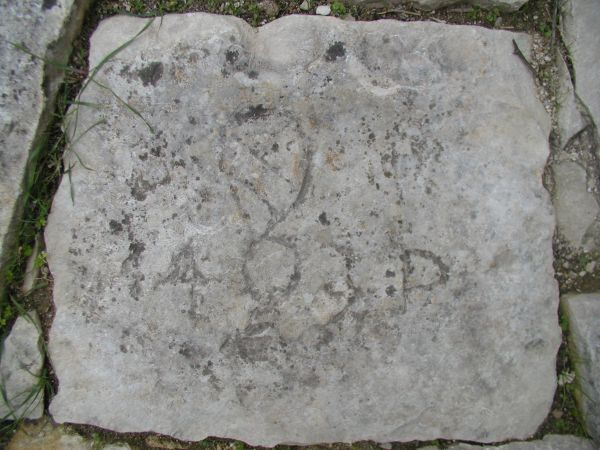 | D(?) {{insigne}} P(?) / 1493 · P | rectangular | na podu crkve desno od ulaza | Irregular rectangular stone.
D grb obitelji Pietropelosa P ispod grba upisano 1493 P Radossi 1995: 200 | ||
| PP-18.19.1 | 1692 | 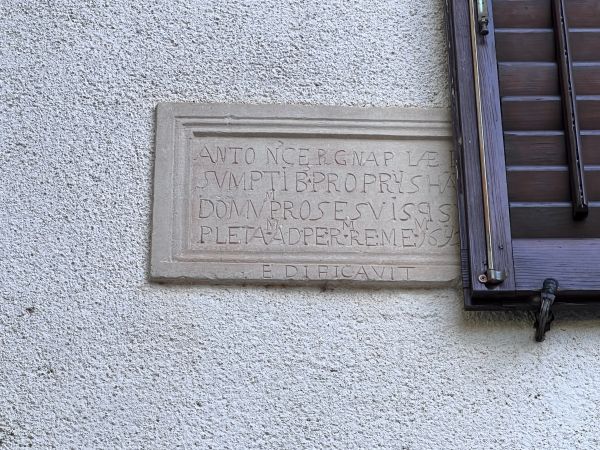 | ANTON(IVS)a) CERGNA PLAEBAN(VS)b) / SVMPTIB(VS) · PROPRIJS HA(N)C / DOMVM PRO SEc) SVISq(VE)d) SV(?)/PLETAM AD · PER(ENNE)M · RE(I) · ME(MORIA)M · 1692 // EDIFICAVITe) | rectangular | On the facade of the parish house, to the right of the entrance, to the left of the window. | A rectangular inscription plaque with a multi-profiled border. Embedded in the exterior wall of the parish house. Part of the inscription extends along the lower edge of the plaque. There are no decorations. | Tijekom posjeta nije bila vidljiva cijela ploča, potrebno je ponovno poslikati. Radossi 1995: 174 | a) Blank space after '0'.
b) Blank space after 'P'. c) Blank space after 'S'. d) Abbreviated without a sign. e) Blank space after 'E'. |
| PP-18.19.3 | 1706 | 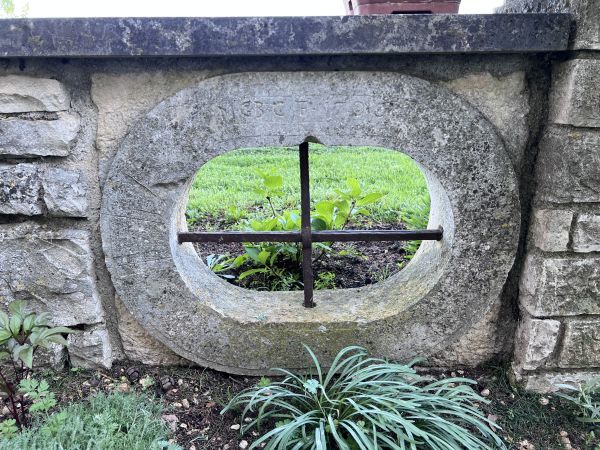 | M · G · B · C(ONSTRVERE) · F(ECIT) · 1706 | other | In the garden of the parish house. | The inscription is on a window, secondary installed in the garden wall of the parish house. The window is in the form of sharp-edged eliptic ring, with profiling on both the inner and outer sides of the frame. Radially arranged lines are carved on the shorter, side edges. The inscription is located within a rectangular field placed on the upper side of the window frame. Two metal bars are installed in a cross pattern within the opening. | Prijašnji prozor sakristije Sv. Silvestra u Kanfanaru. Nedostaju dimenzije. | |
| PP-18.4.3 | 1735 | 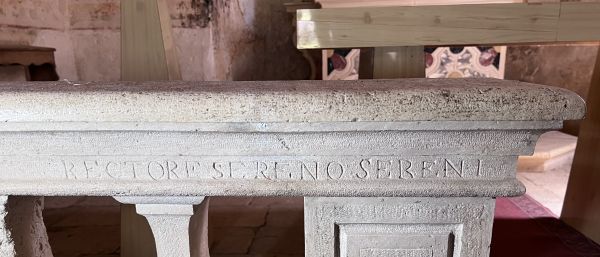  | RECTORE SERENO SERENI // ANNO DOMINI MDCCXXXV | rectangular | On the fence that separates the sanctuary from the congregation, on both the left and right sides, the inscription is split. | The inscription is located on the rood screen of the church, divided in half, with parts on both the left and right sides. It runs along the multi-profiled beam of the rood screen, which rests on pilasters and columns. | Nedostaju dimenzije. | |
| PP-18.7.1 | 1442 JL | 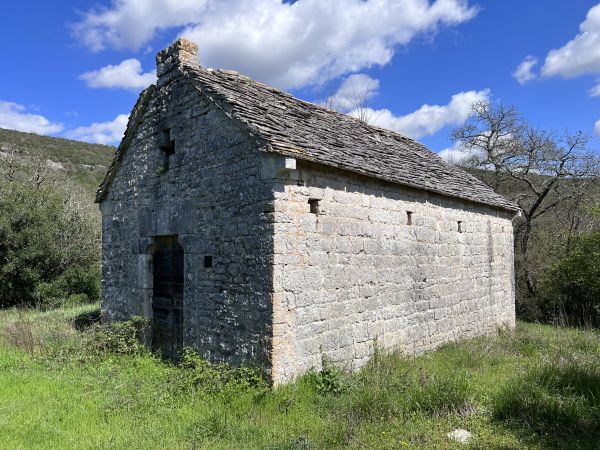 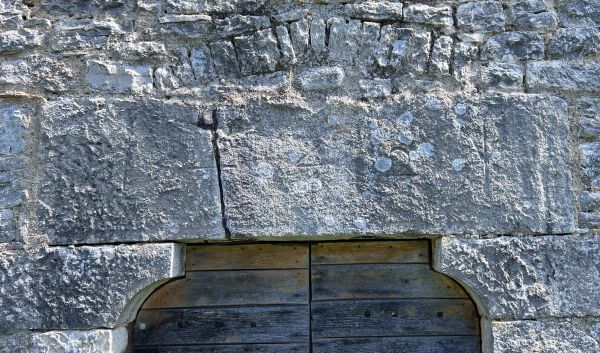 | [A(NNO D(OMINI)] 1442 {{crux}} | rectangular | On the beam above the entrance to the church. | The inscription is carved into a massive beam installed above the main entrance to the church, functioning as a lintel. The year of construction is inscribed in Arabic numerals. There are no decorations. | Nedostaju dimenzije. | |
| PP-19.1.11 | 1741 | 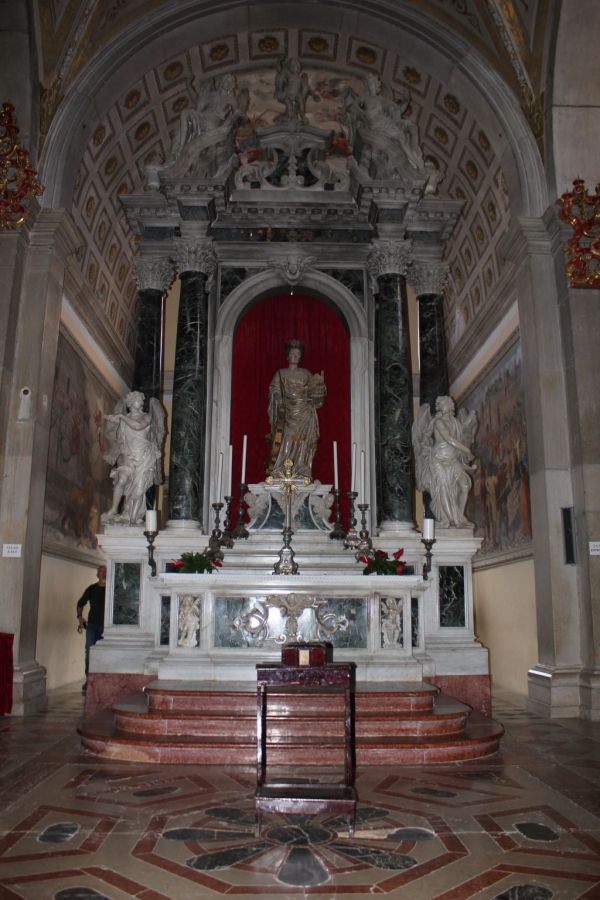 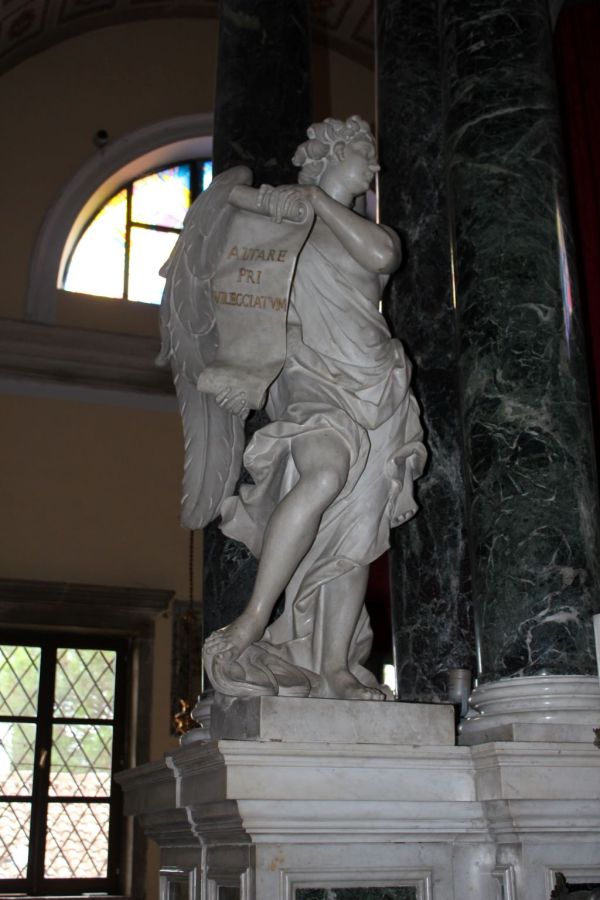 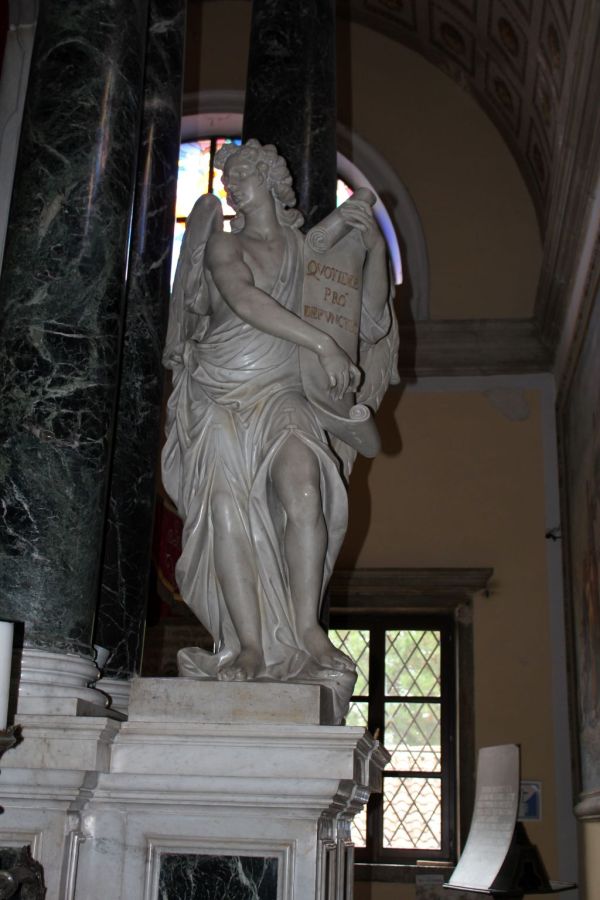 | ALTARE / PRI/VILEGGIATVM // QVOTIDIE / PRO / DEFVNCTIS | other | The inscriptions are found on scrolls held by the sculptures of angels from the altar of St. Euphemia. The southern nave of the church. | The inscriptions are on scrolls held by angel sculptures, positioned on the sides of the altar of St. Euphemia. The altar is placed on three steps. The rectangular stipes on the front edge is decorated with reliefs of two putto holding martyr's palms, while in the center of the stipes there is a cartouche made of vines. Above the stipes is the altar retable. In the central niche, framed by six columns with Corinthian capitals, stands the Gothic statue of St. Euphemia. The saint is crowned and dressed in a tunic and cloak. In her left hand, she holds a model of the town of Rovinj, while with her right she supports a spiked wheel (a symbol of her martyrdom). The columns of the altar bear beams above which is a broken pediment featuring sculptures of two seated angels, with a putto in the middle. The statues of standing angels holding scrolls with inscriptions are located on the outer sides of the columns, on rectangular pedestals. | The sculptures of angels are made of Carrara marble.
The dimensions of the altar are: height 705 cm, width 390 cm. The height of the angel sculptures is 163 cm. Nedostaje prvi dio prijevoda. | |
| PP-19.1.15 | 1734 | 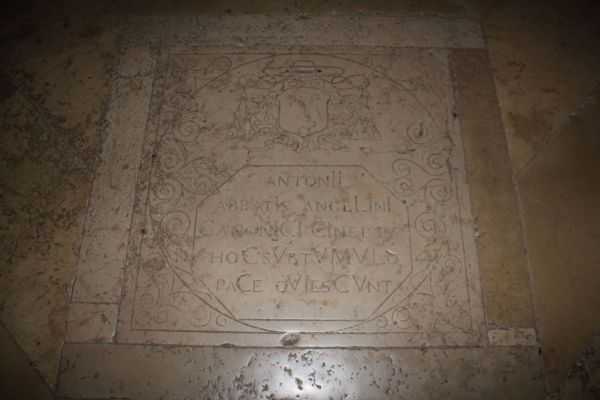 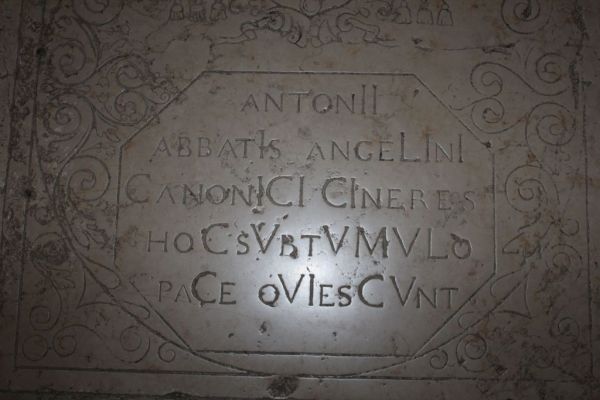 | ANTONII / ABBATIS ANGELINI / CANONICI CINERES / HOC SVB TVMVLOa) / PACE QVIESCVNTb) | rectangular | Rectangular richly decorated inscription; inscription field is within an octagon 'A' with bent crossline. | a) This line does not have blanks between words. b) The chronogram gives 1734. | ||
| PP-19.1.2 | 1861 | 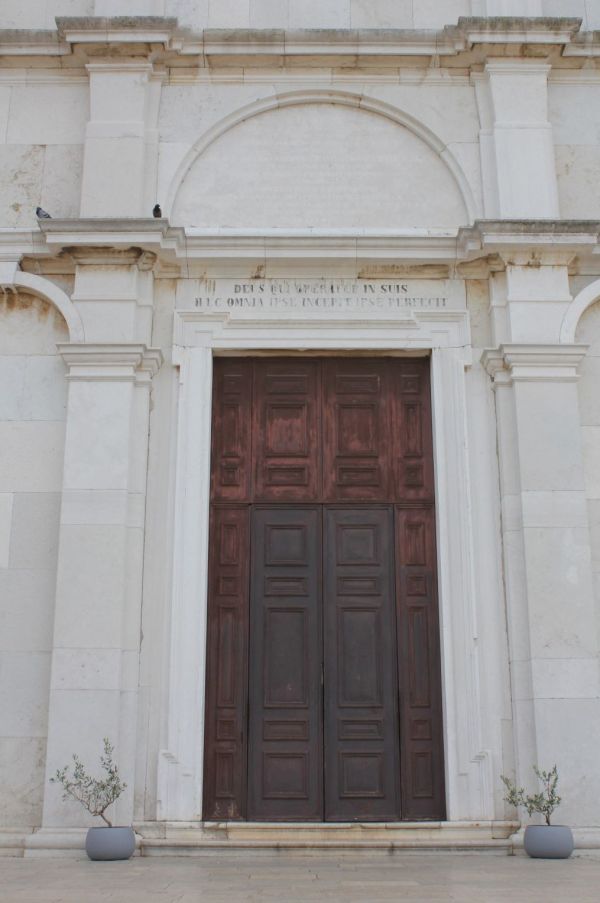 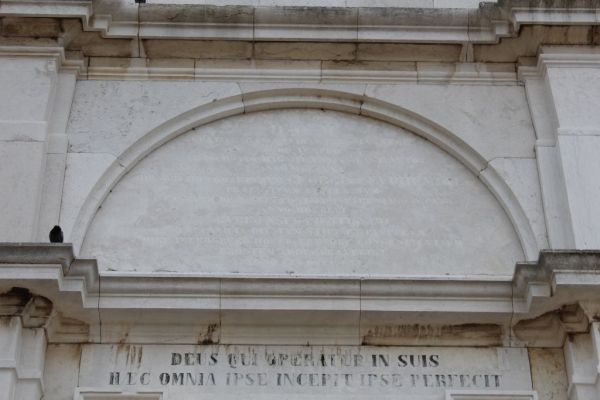 | D(EO) · O(PTIMO) · M(AXIMO) / GRATIAE · QVAM · MAXIMAE · PERSOLVVNTVR / QVOD · TEMPLO / AB · INCHOATO · MAGNIFICENTIVS · EXSTRVCTO / ANNO · MDCCXXVa) / HONORI · HIEROMARTYRUM · GEORGIIb) · ET · EVPHEMIAE / PRAESTITVM · TVTELARIVM / A · CASPARE · DE · NIGRIS · PONTIFICE · PARENTINO · DICATO / ANNO · MDCCLVIc) / RVBINENSES · PIENTISSIMI / COLLATICIA · DIVITVM · STIPE · ET · PAVPERVM / MIRE · IMPROSPERO HOCCE · TEMPORE · CONSENTIENTIVM / FRONTEM · ADDI · CVRAVERINT / ANNO · M · DCCC · LXId) | semicircular | The lunette of the portal of the central nave, western facade of the church. | Natpisno polje i slova nisu izmjerena zbog visine.
The text is centered. Acronym in the first line is in largest letters; the names of the two saints are the second by size, 'RVBINENSES PIENTISSIMI' third, and then the rest. | a), c) Written with horizontal bar(s) above numerals.
b) Contracted by upward-elongation of 'I'. d) Written like ↃIC. | |
| PP-19.1.39 | 1755 | 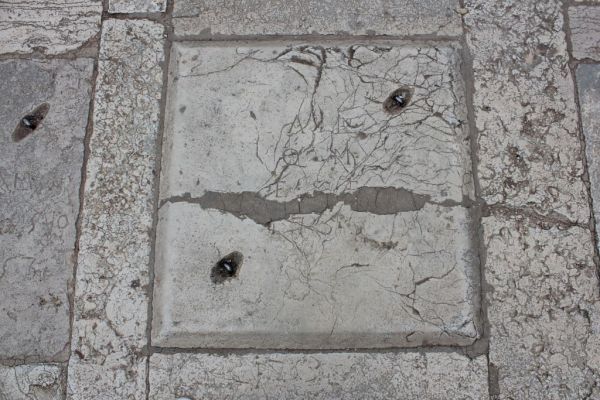 | A[– – –] / Q ·M / E[– – –] / 1755 | rectangular | Hardly legible. | |||
| PP-19.1.40 | 1744 | 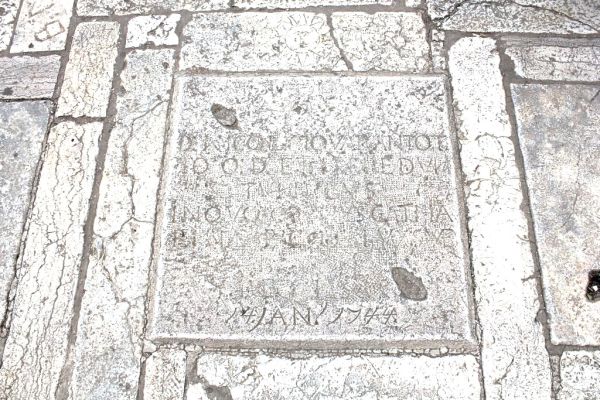 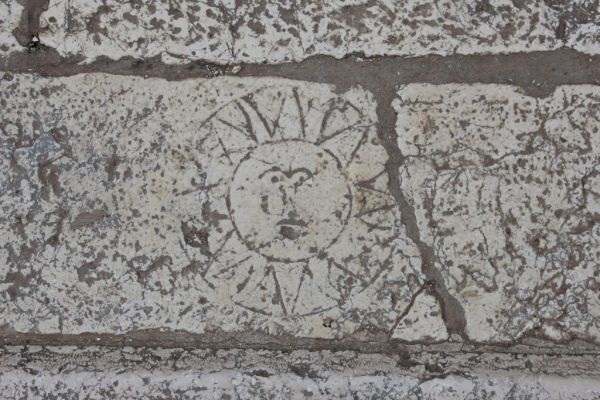 | D(OMINI) NICOLAI QUARANTOT/TO Q(VONDAM) D(DOMINI) E[LIAE] EDV[..] / TV[– – –]CVS / INOVO[– – –]SCATI IA/ [– – –] SVAE / 14. JAN(VARII) 1744. | rectangular | ||||
| PP-19.1.5 | 1733 | 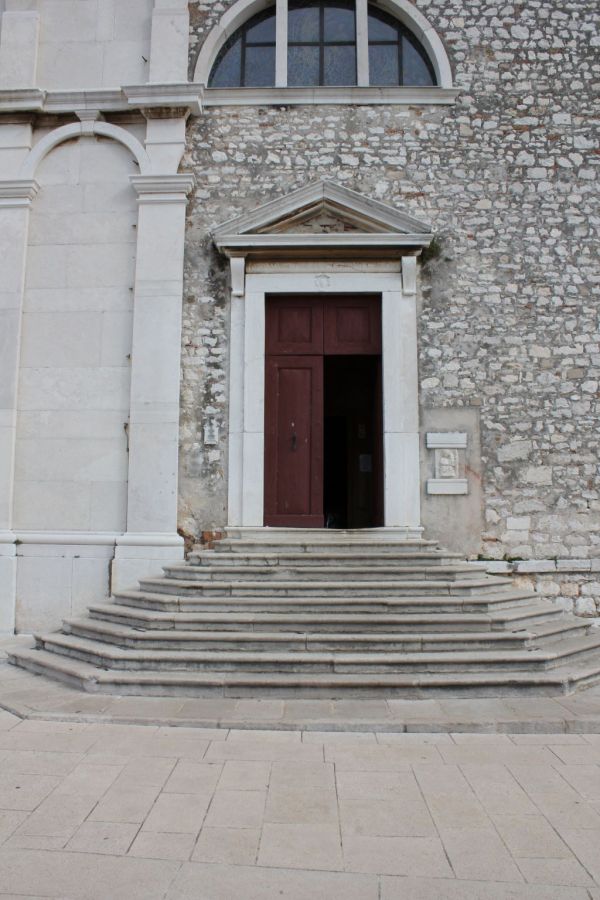 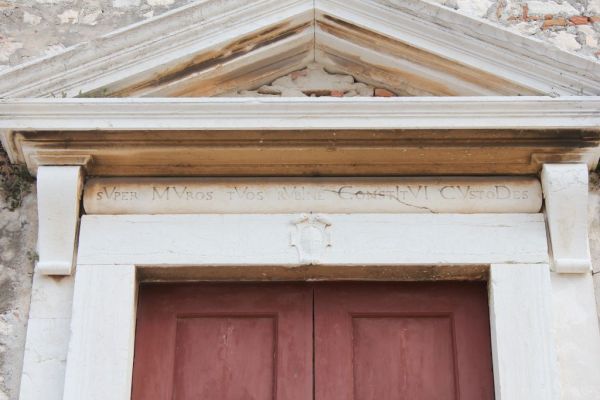 | SVPER MVROS TVOS RVBINE CONSTITVI CVSTODES | rectangular | The lintel of the portal on the southern side wall. | Natpisno polje i slova nisu izmjerena zbog visine. Small capitals; chronogram letters (1733) are large. | ||
| PP-19.1.6 | 1735 | 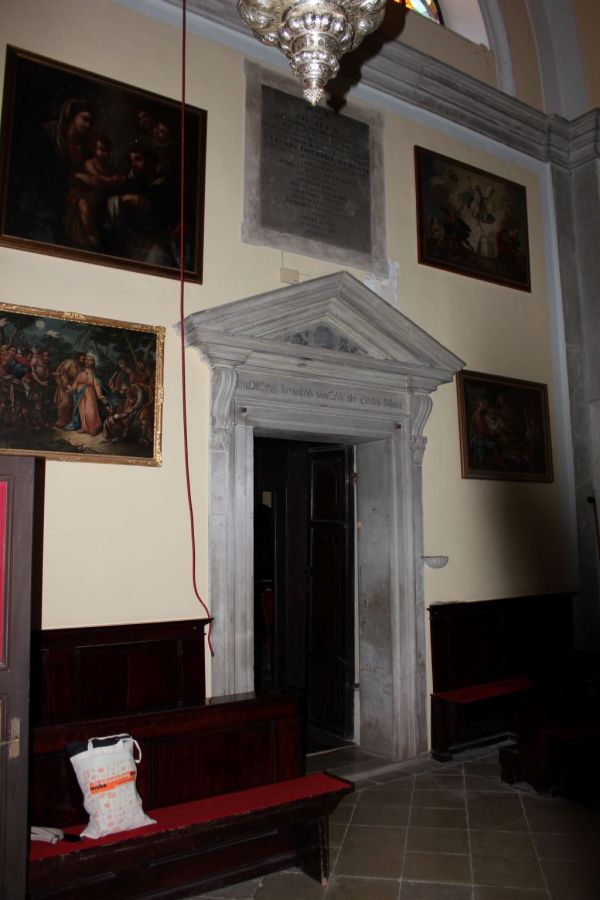 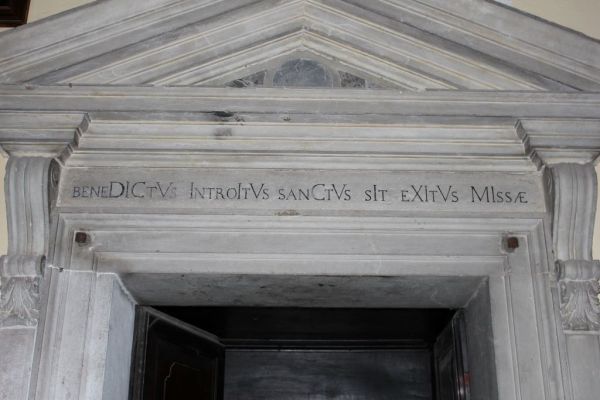 | BENEDICTVS INTROITVS SANCTVS SIT EXITVS MISSAE | rectangular | The lintel of the interior entrance to the side room, on the northern side of the church. | Black-painted engraved letters on the lintel. | Small capitals; chronogram letters (1735) are large. | |
| PP-19.1.7 | 1854 | 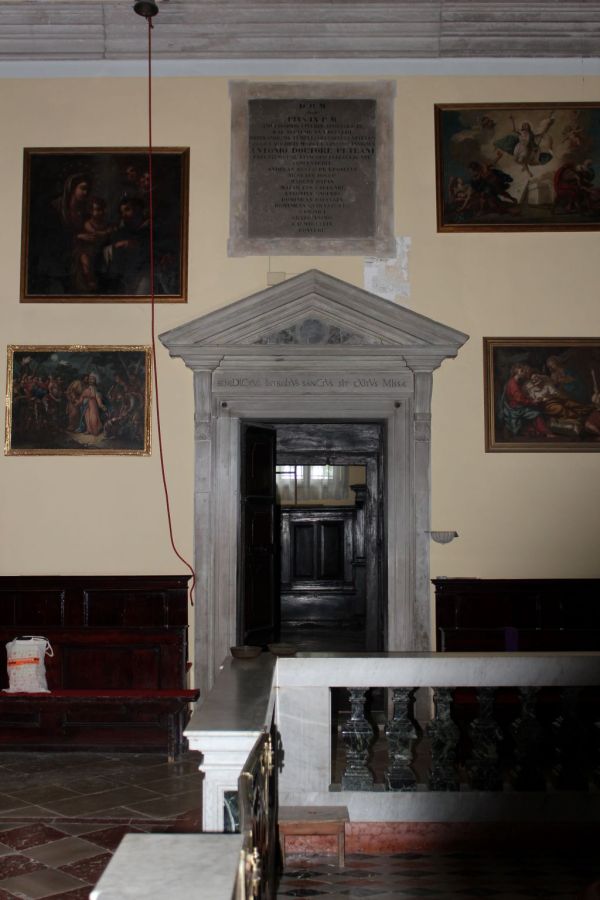 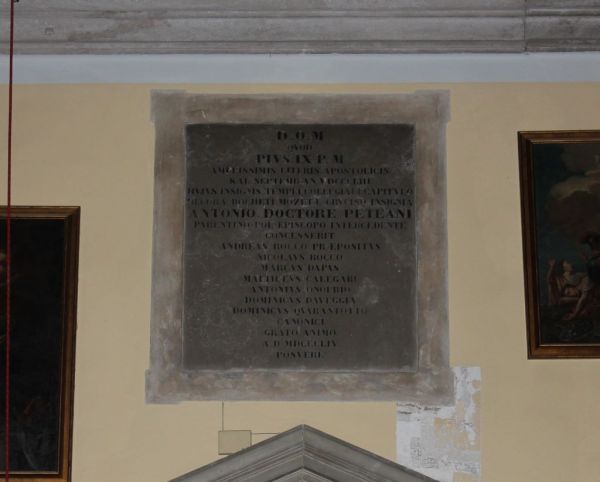 | D(EO) O(PTIMO M(AXIMO)a) / QVOD / PIVS. IX. P(ONTIFEX) M(AXIMVS)b) / AMPLISSIMIS LITERIS APOSTOLICIS / KAL(ENDIS) SEPTEMB(RIBUS) AN(NO) MDCCCLIII / HVJVS INSIGNIS TEMPLI COLLEGIALI CAPITVLO / DECORA ROCHETI MOZETE CRVCISQUE INSIGNIA / ANTONIO DOCTORE PETEANI / PARENTINO-POL(ENSI) EPISCOPO INTERCEDENTE / CONCESSERIT / ANDREAS ROCCO PRAEPOSITVS / NICOLAVS ROCCO / MARCVS DAPAS / MATTHEVS CALLEGARI / ANTONIVS ONOFRIO / DOMINICVS DAVEGGIA / DOMINICVS QUARANTOTTO / CANONICI / GRATO ANIMO / A(NNO) D(OMINI) MDCCCLIV / POSVERE | rectangular | The inscription plaque above the interior entrance to the side room, on the northern side of the church. | Natpisno polje i slova nisu izmjerena zbog visine.
Black-painted engraved letters on the grey inscription plaque. The text is centered. Letters in the first line and the lanes with the Pope's Peteani's names are bold and larger. | a), b) 'M' does not have a dot. | |
| PP-19.1.8 | 1680 | 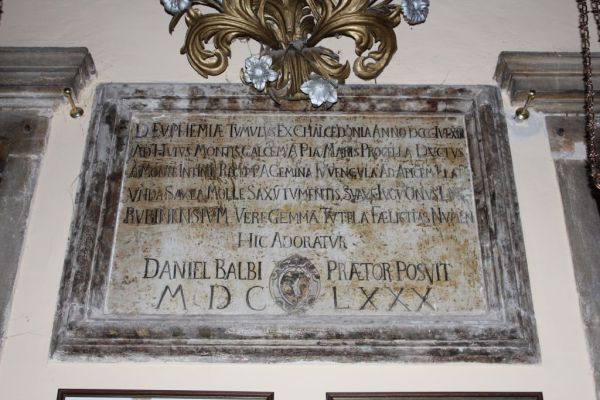 | D(IVAE) EVPHEMIAE TVMVLVS EX CHALCEDONIA ANNO DCCC IVL(II) XIII / AD HVIVS MONTIS CALCEM A PIA MARIS PROCELLA DVCTVS / A MONTE INTIME RECEPT(VS) A GEMINA IVVENCVLA AD APICEM ELAT(VS) / VNDA SAXEA MOLLE SAXV(M) IVMENTIS SVAVE IVGI ONVS L[EVE] / RVBINENSIVM VERE GEMMA TVTELA FAELICITAS NVMEN / HIC ADORATVR / DANIEL BALBI PRAETOR POSVIT / MDCLXXXa), b) | rectangular | The text is left and right justified. The letters are painted in black, teh fild is in dirty uneven white and brown colour. The script is small capitals, with large initials. Cf. Mt 11,30 | a) The lines in 'D' are separated (IↃ). b) The picture is placed in the middle of the last two lines, between 'Balbi' and 'Praetor', and 'C' and 'L'. | ||
| PP-19.16.1 | 1673 | 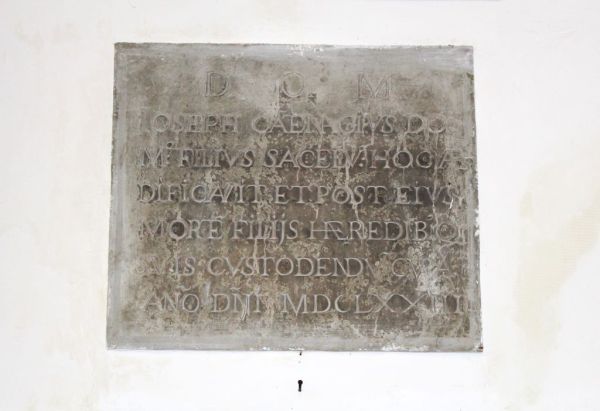 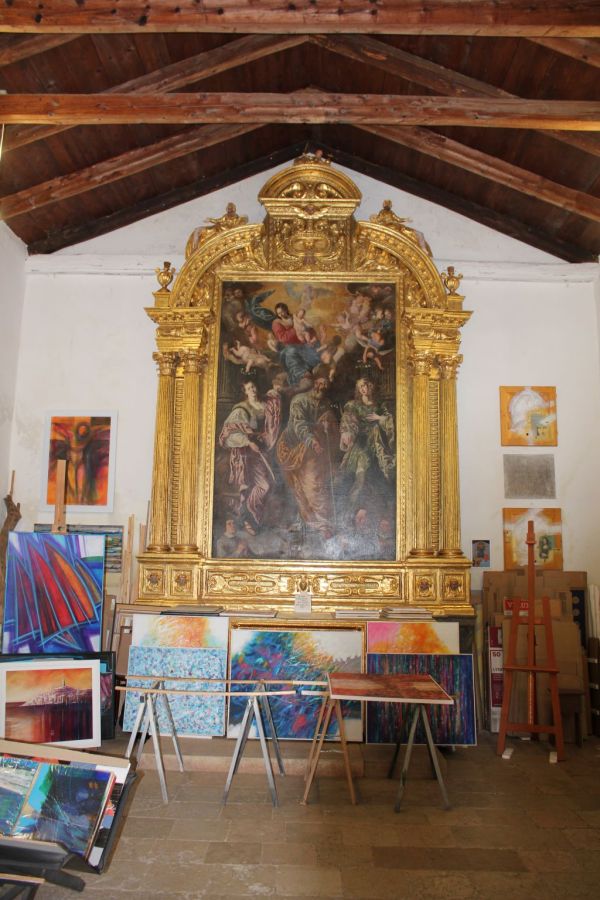 | D(EO) O(PTIMO) M(AXIMO) / IOSEPH CATENACIVS DO/M(INI)CIa) / FILIVS SACELV(M) HOC AE/DIFICAVIT ET POST EIVS / MORTE(M) FILIJS HAEREDIB(VS)Q(VE) / SVIS CVSTODENDV(M) CVRAVITb) / AN(N)O D(OMI)NI MDCLXXIII | rectangular | The interior of the church, built into the northern wall of the sanctuary on the right side. | First line centered, other lines justified left, last line a little indented.
First line and first letter of 'IOSEPH' larger. 'I' has a dot above. | a) 'CI' in suprascript. b) 'VIT' in suprascript. | |
| PP-19.19.1 | 1592 | 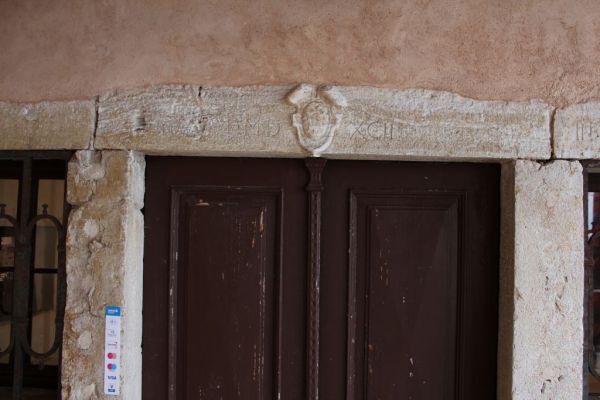 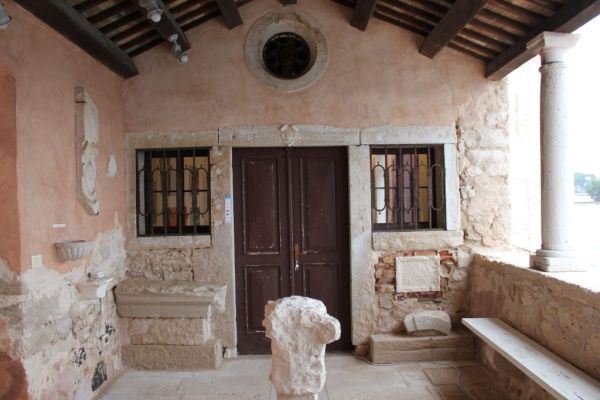 | A(NNO)a) MD // XCII | rectangular | The lintel of the entrance portal, western facade of the church. | In the center of the lintel beam, a coat of arms is carved in relief, separating the roman numerals of the inscribed year. | a) Without a sign or a space after the abbreviation. | |
| PP-19.19.2 | 1644 | 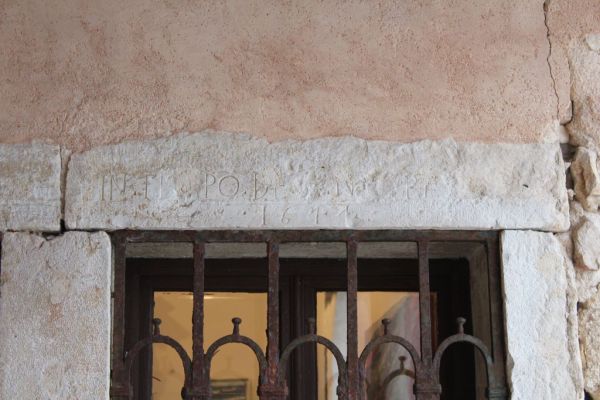 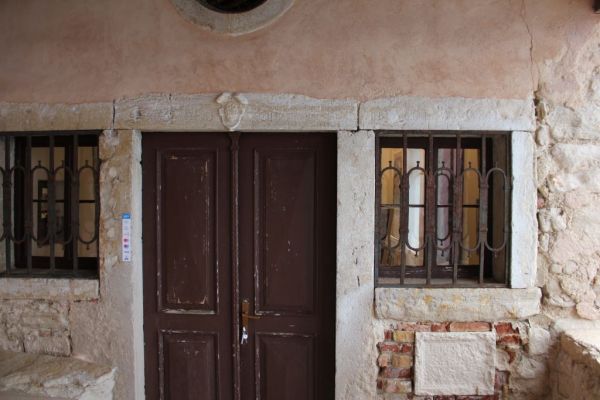 | IN. TE. PO. D. F.[– – –] / 1644 | rectangular | The beam above the southern window on the western facade of the church. | |||
| PP-19.19.3 | 1720 | 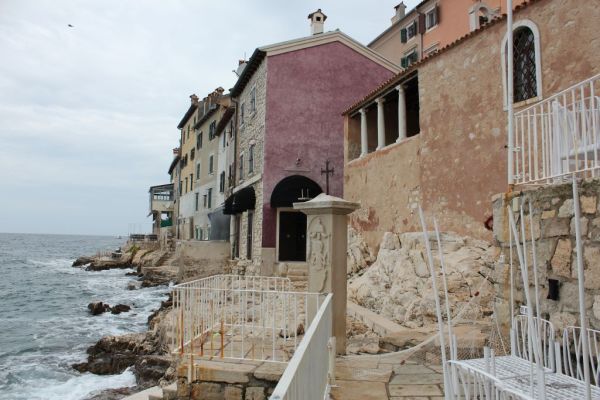 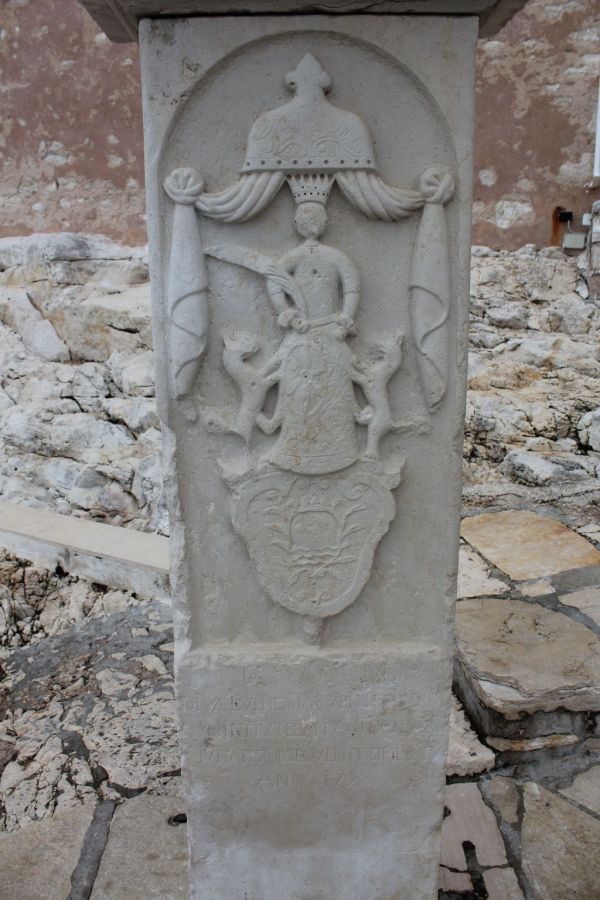 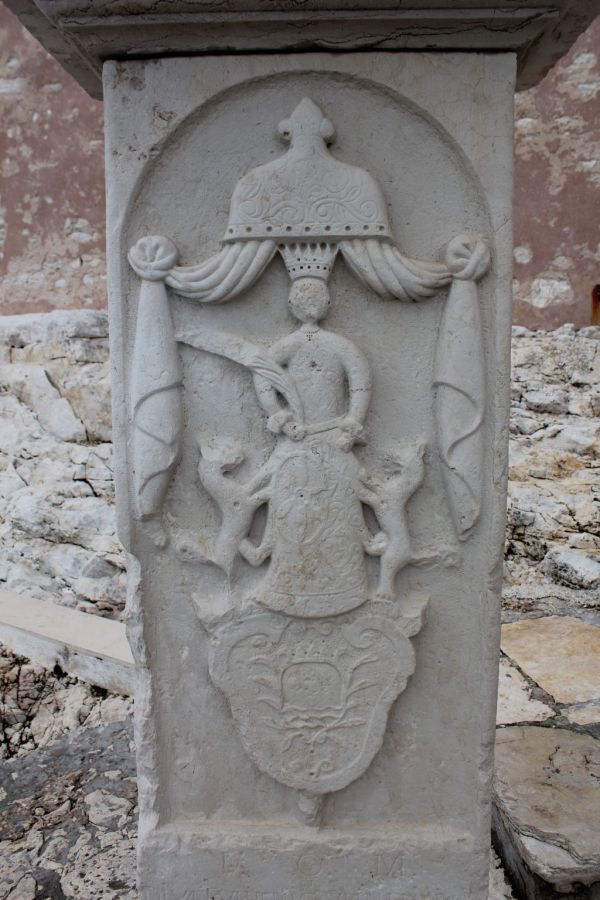 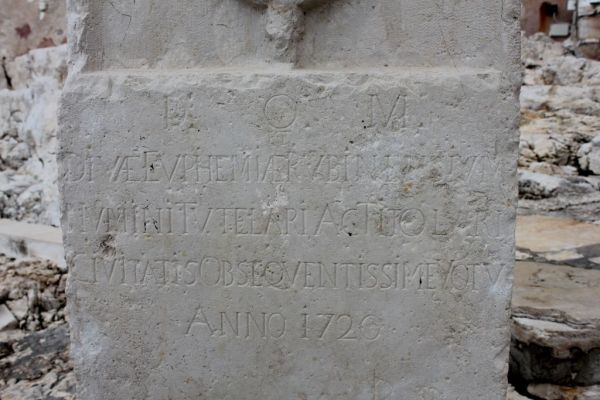 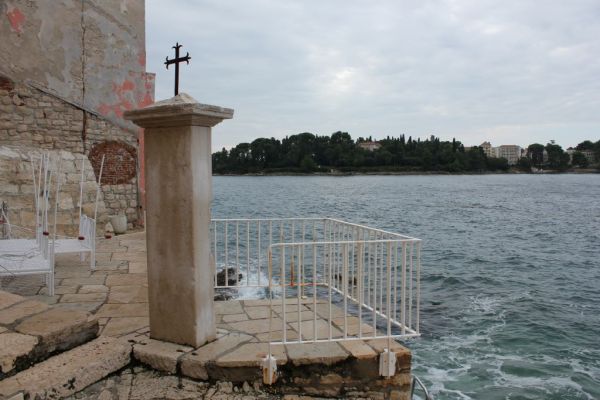 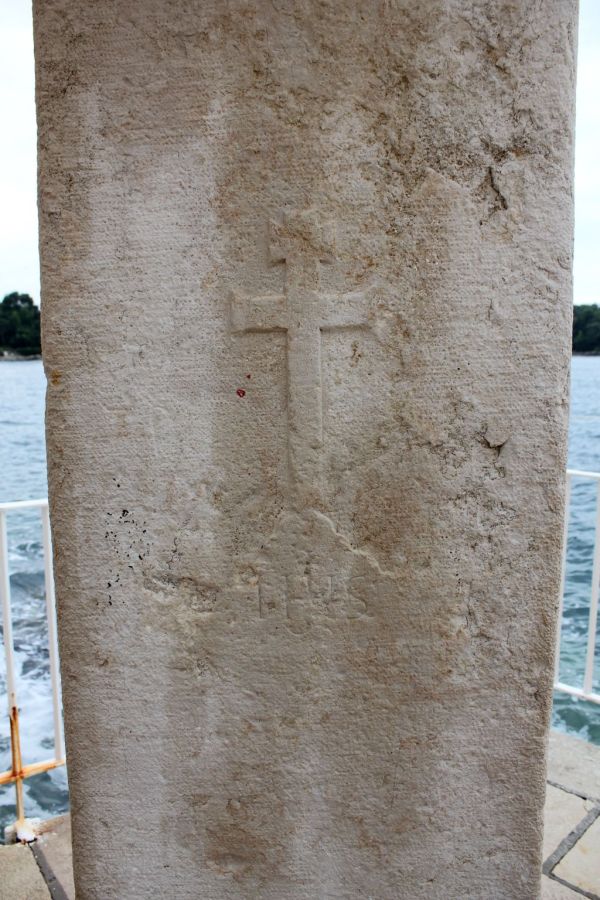 | D(EO) O(PTIMO) M(AXIMO) / DIVAE EVPHEMIAE RVBINE[N]SIVM / NVMINI / TVTELARI AC TITOL[A]RI / CIVITATIS OBSEQVENTISSIMAEa) VOTV / ANNO 1720 | rectangular | The column of Saint Euphemia on the seashore, south of the Church of the Holy Cross. | The southern side of the monument - above the inscription, in the upper part of the square column, is a deeper relief depicts Saint Euphemia carved within a niche, under a canopy. The northern side of the monument - above the inscription, a depiction of a hill with a double cross is shown in shallow relief. | The year 1592, carved into the lintel above the entrance door, marks the year when a covered porch was added to the church and the facade was repaired.
The first and the last lines are centered, the middle lines are justified left and right. The text is in small capitals with large initials, with no blank spaces between words. 'I' has a dot above, '1' is shaped like 'I'. | a) 'E' caudata. |
| PP-21.1.1 | 1670 |  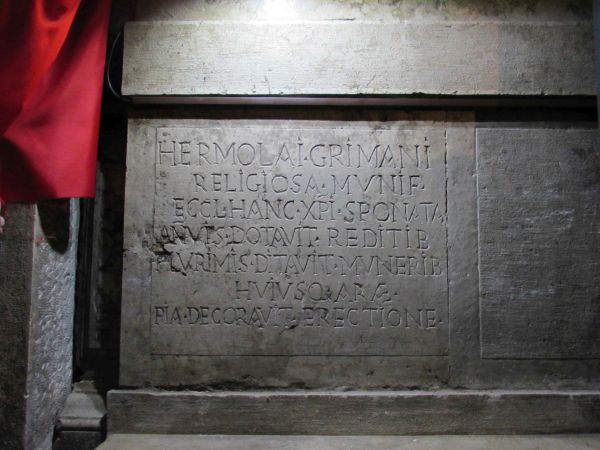 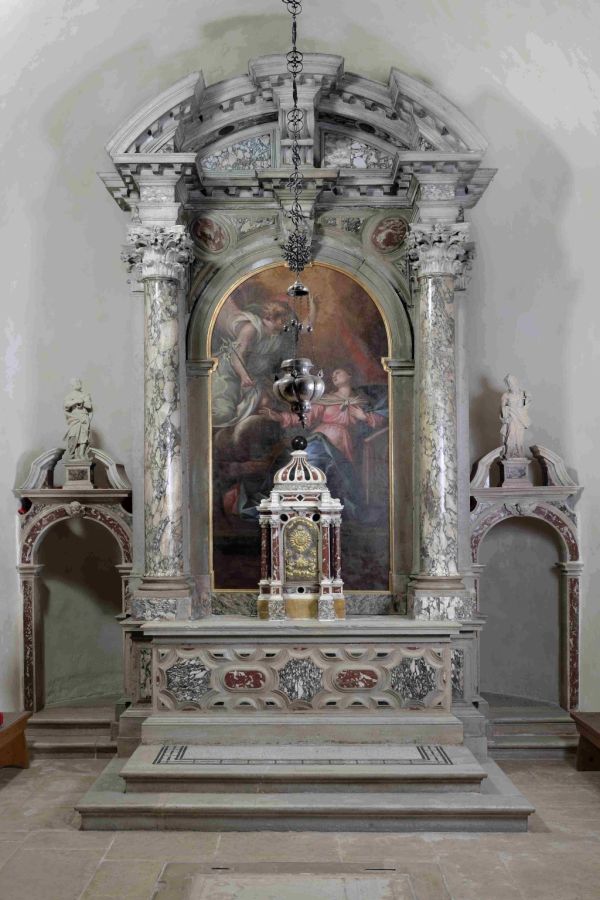 | HERMOLAI · GRIMANI / RELIGIOSA · MVNIF(ICENTIA) / ECCL(ESIAM) · HANC · (CHRIST)Ia) · SPON〈S〉ATA(M)b) / AN(N)VIS · DOTAVIT · REDITIB(VS) / PLVRIMIS · DITAVIT · MVNERIB(VS) / HVIVSQ(VE) · ARAE / PIA · DECORAVIT · ERECTIONE · | rectangular | back side of the main altar | Inscription is engraved on the back of the main altar of the parish church. | The altar is placed in a protruding apse raised by two steps. Its stipes are decorated with inlays of colorful marble. The altar is placed in a apse. In the central part of the altar is a painting made by Girolamo Pellegrini (1624 – after 1700) with a scene of the Annunciation. The altar is flanked with Corinthian columns that support a semicircular pediment with a central protruding console. The rear part of the altar is made of stone blocks, on which there are two donor inscriptions. The inscription on the south side is transcribed here. Kudiš believes that the altar was modeled after the one of Our Lady of the Rosary from the Paduan church of St. Anthony, work of Baldassare Longhena (1598 – 1682).1) Tulić agrees and adds similarities with the main altar of the Franciscan church in Zadar and with the former main altar of the church of San Daniele di Castello in Venice, but also similarities with the altars of Giuseppe Sardi and Alessandro and Paolo Tremignon.2)
From this altar, a marble reliquary containing the remains of Saint Victoria was transferred to the altar of the Holy Sacrament in 1709, and arched passages were added to it in the mid-18th century. Arched passages left and right were added to the altar in the mid-18th century. This altar is considered to be the most significant 17th-century altarists work in the Diocese of Poreč and Pula. The text is centered. The first line (name) is larger than the rest. The letters are straight, but not entirely regular. 'A' has a bent pointed crossbar. 'I' has a dot. Boris Vučić Šneperger (Vučić Šneperger 1995: 339, n. 13) published the text with a transcription: HERMOLAI * GRIMANI RELIGIOSA * MUNIF* ECCL * HANC * XP'I * SPONATA AN'VIS * DOTAVIT * REDITIB PLVRIMIS * DITAVIT * MUNERIB HVIVS Q'XARAE * PIA * DECORAVIT * ERECTIONE Nina Kudiš (Kudiš 2007: 288 n. 14) published the text with an interpretative transcription made by Nenad Labus: HERMOLAI GRIMANI/ RELIGIOSA MVNIF(ITIENTIA)/ ECCL(ESIAE) HANC XP(IST)I SPONATA (SUE SPONTAE)/ ANVIS DOTAVIT REDITIB(US)/ PLVRIMIS DITAVIT MVNERIB(US)/ HVIVSQ(UE) ARAE/ PIA DECORAVIT ERECTIONE. Davor Tulić (Marković, Matejčić, Tulić 2017: 238-239) published a scheda with a transcription: HERMOLAI. GRIMANI/ RELIGIOSA MUNIF./ ECCL. HANC. XPI. SPONATA./ ANVES. DOTAVIT. REDITIB./ PLVRIMIS. DITAVIT. MVNERIB./ HVIVSQ. ARAE./ PIA. DECORAVIT ERECTIONE. He reads the name of the donator as Almorò Grimani. 1) Kudiš 2007. 2) Vučić Šneperger 1995. | a) XPI b) Abbreviating sign not visible. |
| PP-21.1.10 | 1790 |   | B(?). F(?). / 1790 | rectangular | grave slab in the floor in front of the north side altar | |||
| PP-21.1.11 | 1743 |    | E(ST) B(EATAE) V(IRGINI) M(ARIAE) E(RECTVM) A(NNO) D(OMINI) 1743 | rectangular | side altar dedicated to the Virgin and Child by the entrance | A freestanding baroque tabernacle in the shape of an urn is located on the side altar with a statue of the Blessed Virgin Mary and Child. The semicircular door of the tabernacle, framed by an inlaid band, is flanked by statues of two plump putti standing on a cloud, while three angel heads with wings are applied to the upper side. Below the door is an inscription in abbreviations with the year 1743. | ||
| PP-21.1.12 | 1796 |  | 1796 | rectangular | in the niche near the entrance | The smooth-bodied stone font is located in a niche near the entrance. It has a base designed like a pear-shaped baluster that stands on a polygonal pedestal with sides decorated with shallow simple cartouches. On the side facing the church, the year 1796 is carved in Roman numerals. | In the center of the slab is a rectangular inscription field, the corners of which are circularly cut inward. | |
| PP-21.1.14 | 1845 | 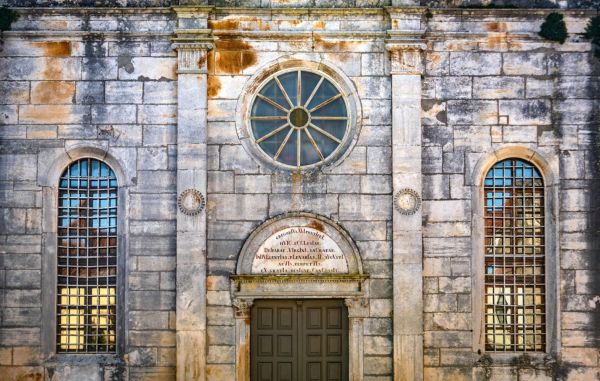 | GREGORIVS XVI PONTIFEX / HVIC ECCLESIAE / DEIPARAE VIRGINI SACRATAE / INDVLGENTIAS PLENARIAS II AVGVSTI / AEVIS PERPETVIS / EX GRATIA BENIGNE CONCESSIT | semicircular | lunette above the main door | The inscription is located within a lunette built together with the door, whose profiled lintel with dentils and pilasters serving as doorposts shows typical features of the 16th-century Renaissance. | First line follows a trajectory of an arc.
Larger letters contin chronogram and are painted in red. Other letters are painted in black. Chronogram gives 1845. | |
| PP-21.1.2 | 1670 |  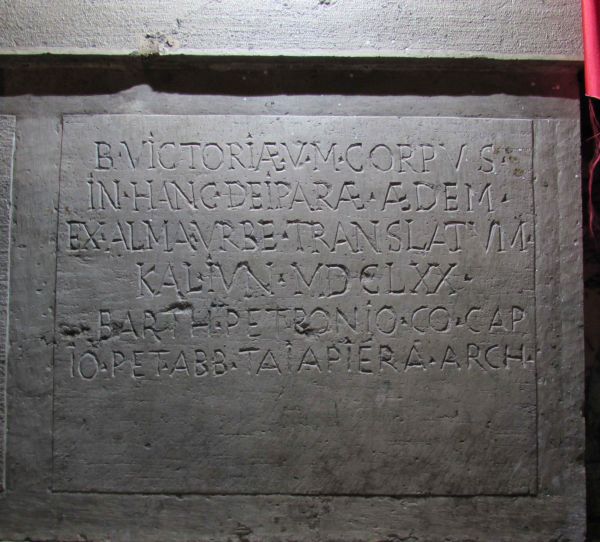 | B(EATAE) · VICTORIAE V(IRGINIS) · M(ARTYRIS) · CORPVS · / IN · HANC · DEIPARAE AEDEM · / EX · ALMA · VRBE · TRANSLATVM · / KAL(ENDIS) · IVN(IIS) · MDCLXX · / BARTH(OLOMAEO) · PETRONIO · CO(MITE) · CAP(ITANEO)a) / IO(HANNE) · PET(RO) · ABB(ATE) · TAIAPIERA · ARCH(IPRESBYTERO). | rectangular | the main altar | Boris Vučić Šneperger (Vučić Šneperger 1995: 339, n. 13) published the text with a transcription:
B * VICTORIAE * V* M * CORPVS* IN * HANC * DEIPARAE * AEDEM * EX * ALMA * VRBE * TRASLATVM * KAL * IVN * MDCLXX BARTH * PETRONIO * CO * CAP IO * PET * ABB * TAIAPIERA * ARCH Nina Kudiš (Kudiš 2007: 288, n. 14) published the text with an interpretative transcription made by Nenad Labus: B(EATE) VICTORIAE V(IRGO) M(ARTIRI) CORPUS/ IN HANC DEIPARAE AEDEM/ EX ALMA VRBE TRANSLATVM/ KAL(ENDAE) IVN(II) MDCLXX/ BARTH(OLOMEUS) PETRONIO CO(MITE) CAP(ITANEO)/ IO(HANNES) PET(RUS) ABB(ATE) TAIAPIERA ARCH(IPRETE). Damir Tulić (Marković, Matejčić, Tulić 2017: 238-239) published a scheda with a transcription: B. VICTORIAE. V. M. CORPVS/ IN HANC DEIPARAE. AEDEM./ EX. ALMA. VRBE. TRANSLATVM./ KAL. IVN. MDCLXX./ BARTH. PETRONIO. CO. CAP./ IO. PET. ABB. TAIAPIERA. ARCH. For the description of the altar, see PP-2.1.1. Dark marble. Centered text, slightly irregular capitals, last two lines have a bit smaller letters. 'I' has a dot. https://www.ceeol.com/search/book-detail?id=1221568 | a) This line has undergone some damage, but legibility is still complete. | |
| PP-21.1.3 | 1555 JL |   | {{flos}} 1 · 5 · 55 {{flos}} | rectangular | side altar of the Blessed Sacrament | The altar of the Blessed Sacrament is designed as a shallow relief altar of architectural type. The main part of its construction are the columns bordered by two pilasters filled with various decorations. The inner pilasters support a triumphal arch in whose triangular segments are angels with chalices. Through the arch one enters a space resembling a chapel vaulted by a dome, an effect created by perspective shortening with which especially helps the motif of the tiles on the floor that are geometrically shortened. Two angels with censers are also sculptured in this space and at its end is a carved tabernacle in the form of a small altar, under whose doors the two little leaves are carved in front and at the end of MDLX inscription. Nina Kudiš Burić wrote an article about this altar claiming it is a copy of the contemporary altar in the chapel of the Blessed Sacrament in venetian church San Trovaso made by workshop of Jacopo Sansovino in colaboraton with Alessandro Vittorio. | Nina Kudiš Burić published an article about this altar.
- in: Oltari presvetog Sakramenta u Savičenti i Osoru: problemi konteksta, tipologije, uzora i autora, Renesansa i renesanse u umjetnosti Hrvatske, Zagreb: Institut za povijest umjetnosti ; Odsjek za povijest umjetnosti Filozofskog fakulteta Sveučilišta u Zagrebu, 2008. pp 297-312. Damir Tulić published a scheda about the altar. - in: Umjetnička baština istarske crkve - Kiparstvo 2 / Patrimonio artistico della chiesa istriana - Scultura 2, 2017, p. 216-219. | |
| PP-21.1.6 | 1719 | 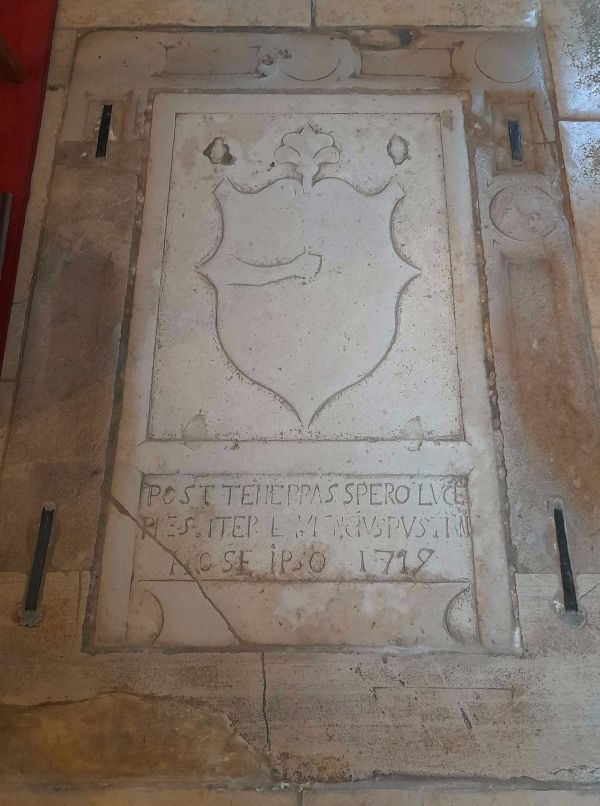 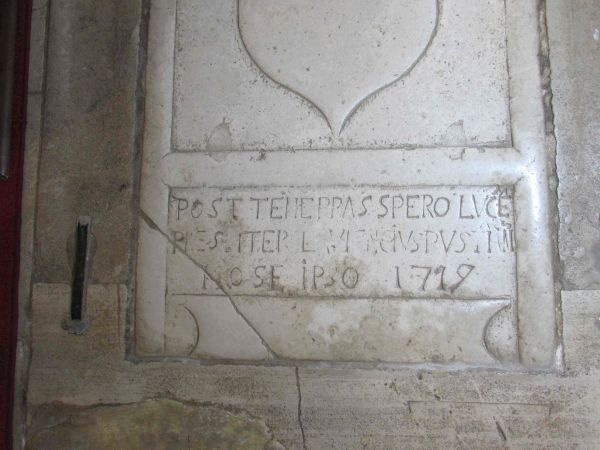 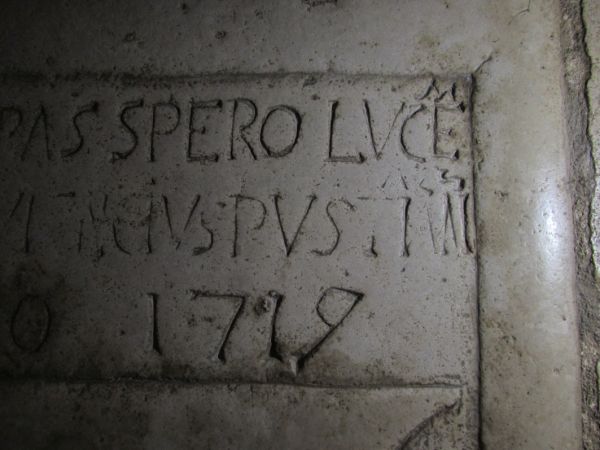 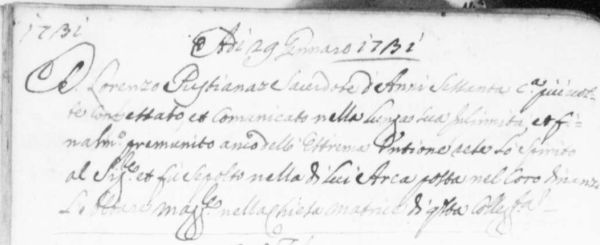 | POST TENEBRAS SPERO LVCEM1) / P(RE)S(B)ITER L(A)V(REN)CIVS PVSTI(A)N(ACS) / (PR)O SE IPSO 17192) | rectangular | Grave slab in the floor in front of the main altar. | The rectangular graveslab is divided in two parts, one with the crest in form of a shild wth a hand holding scepter, and the other with a inscription in three lines. | 1)"Post tenebras lux" is a Latin phrase translated as Light After Darkness. It appears as Post tenebras spero lucem ("After darkness, I hope for light") in the Vulgate version of Job 17:12. At the end of this line in Svetvinčenat is the letter M incarved above the last word (LUCE-M). 2)Laurencius actually died 1731 acording to Liber defunctorum (year?). | |
| PP-21.1.7 | 1704 | 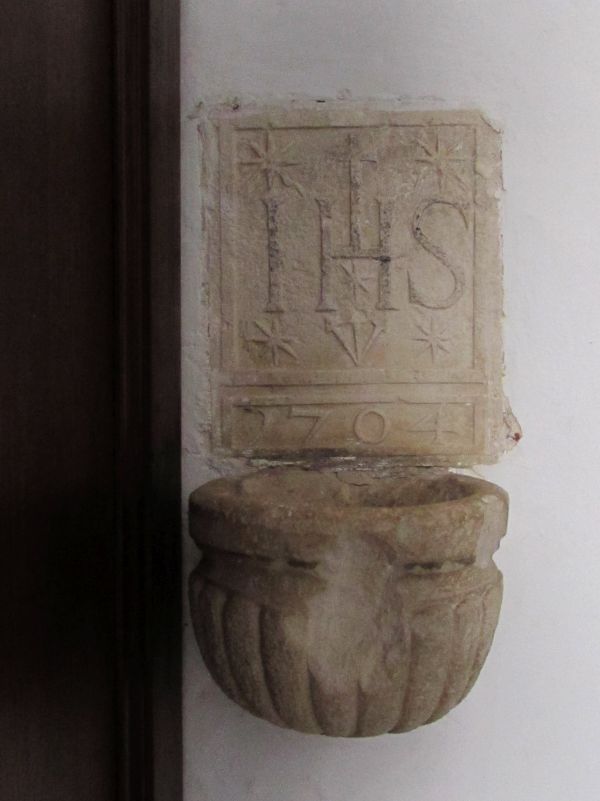 | I(ESVS) H(OMINVM) S(ALVATOR) // 1704 | rectangular | next to the sacristy door, from the inner side | Above the small holy water font (stoup), a stone slab divided into two parts was built into the sacristy wall. On the upper, larger part, in the shape of a square, the IHS is carved, with a star relief above and below the letters I and H, while above the letter H is a cross with an extended central hasta, and below the same letter are three arrows and a star. In the lower part of the relief slab, which occupies a fifth of the total height, the year 1704 is carved. | ||
| PP-21.2.1 | 1642 |    | ADHVC VIVE(N)TE MARTINOa)
CAIO P(ER) SE SVISQ(VE) HER(EDIBV)Sb) PONERE F(ECIT) AN(N)O D(OMI)NI 1642 | rectangular | grave slab in the floor | The church of St. Vincent is a cemetery church with a hall floor plan, with three inscribed semicircular apses, filled with excellent wall paintings from the 13th century made by the master Ognobenus Trevisanus. They are executed in the style of the transition from Romanesque to Gothic, but some paintings are of a later date. In older literature St. Vincent is identified as a monastery church, but more recent research shows no evidence for this. Several tombstones with full text or only tool marks or family signs have been preserved in the church. This grave slab broken into three parts is located southwest of the main altar. It has no decorative frame. The inscription is carved in the upper part of the slab. | a)Small letters "ETE" are incarved above the first line, but with the function of sufix of the word VIVE(N)TE in the first row. b)Small letter "S" with the function of sufix is incarved between MARTINO in the first row and HER in the second row. | |
| PP-21.2.3 | 1842 |  thumb‚ | NICHILa) CERTIUSb) MORTE / ET NIHIL INCERTIUSc) ORAd) / ADVENTUS EJUS,1) / PRAEMISSAe) VERITATE ISTA, / EGO PETRUS MART(INUS) STANCOVICH / MEDICINAE AC CHIRURGIAE DOCTOR / ADHUC ME VIVENTE JUSSI FIERIf) / TUMULUM HUNC, IN QUO OSSA / MEA MODO TEGUNTUR / OBIIT DIE 6 MENSIS MAJ(I) ANNI 1842 / AETATIS SUAE ANNORUM 73. | rectangular | western wall | Inscription is found on a monument in the form of an aedicule with a triangular gable. In the middle of the gable is a relief cross. Along the triangular conclusion of the gable on the lower side is a cymation, and on the upper side are acroteria in the form of spherical triangles. | The tomb of Petar Stanković's brother Martin, a doctor, who was politically active during the French rule, having become the mayor of the municipality of Barban in 1808.2) Petar Stanković (1771 – 1852) was a very important Istrian intelectual in the first half of the 19th century.
The monument is in the form of an aedicule with a triangular gable. Along the triangular conclusion of the gable on the lower side is a cymation, and on the upper side are acroteria in the form of spherical triangles. Centered text, very regular capital with enlarged initial letters of NICHIL and of all words from EGO to DOCTOR except for AC. Punctuation is modern. 1) Cic., Cato 74: "Moriendum enim certe est, et incertum an hoc ipso die." 2) Lukšić 1994: 118, Kontošić 2014: 97, n. 1. | a) Originally 'NICHIL', but 'C' is crossed over by a vertical line. Cf. 'NIHIL' in line 2.
b) Corrected from clearly visible 'CERTIOR'. c) Corrected from 'INCERTIOR'. d) ÔRA e) 'E' caudata. f) Under this word a small number '18520' is shallowly engraved - perhaps an ID of the slab. |
| PP-21.2.4 | 1761 |   | M(?) M(?) D(?) / I(?) P(?) F(IERI) F(ECIT) / [A(NNO)] D(OMINI) 1761. | rectangular | grave slab in the floor | |||
| PP-21.3.1 | 1542 JL |  | · M · D · XXXXII | rectangular | lintel above the side door | The year in Latin script is engraved in a horizontal cross bar with flared ends | ||
| PP-21.8.1 | 1621 | MDCXXI | rectangular | door frame | The year 1621 in Latin is engraved in the middle of the richly profiled lintel. | |||
| PP-21.8.2 | 1742 |  | 1742 | other | top of the bellfry | Above the two-arched belfry is an ornamented gable, consisting of two volute-shaped elements connected in the middle, above which is a base for metal cross in the shape of two globes on top of each other. On the first sphere is the year 1742 engraved in arabic numbers. | ||
| PP-22.10.1 | 1742 | rectangular | Na nadvratniku iznad ulaza u crkvu. | |||||
| PP-22.10.10 | 1749 | 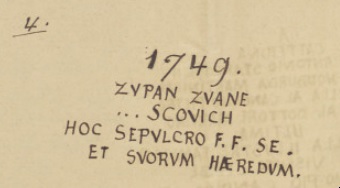 | rectangular | Nadgrobna ploča na podu crkve. | ||||
| PP-22.10.2 | 1926 | rectangular | Unutarnji zid lađe iznad ulaza. | |||||
| PP-22.10.3 | 1743 | rectangular | Lijevi bočni oltar posvećen Blaženoj djevici Mariji od Pojasa. | |||||
| PP-22.10.4 | 1743 | rectangular | Desni bočni oltar posvećen Sv. Antonu Padovanskom. | |||||
| PP-22.10.5 | 1744 | rectangular | Natpis na prvom desnom oltaru. | |||||
| PP-22.10.6 | 1746 | rectangular | Natpis na drugom desnom oltaru. | |||||
| PP-22.10.7 | 1610 | 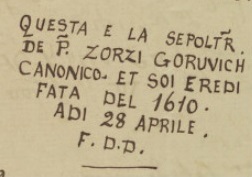 | rectangular | Nadgrobna ploča na podu crkve. | ||||
| PP-22.10.8 | 1696 | 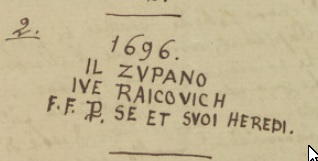 | rectangular | Nadgrobna ploča na podu crkve. | ||||
| PP-22.10.9 | 1747 | 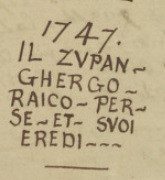 | rectangular | Nadgrobna ploča na podu crkve. | ||||
| PP-22.9.1 | 1867 | rectangular | Iznad ulaza u crkvu. | |||||
| PP-23.1.1 | 1688 | 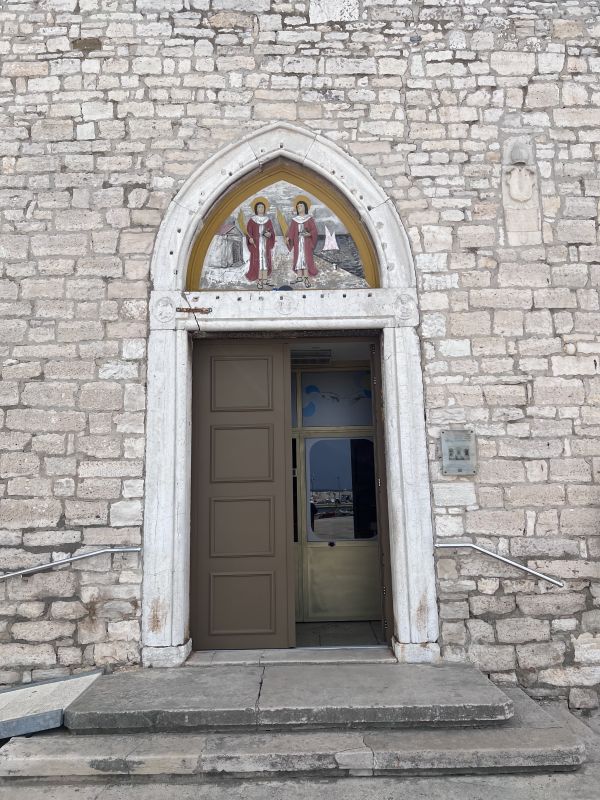 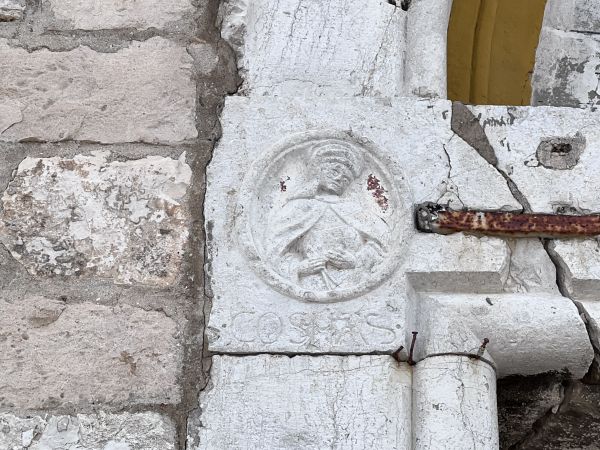 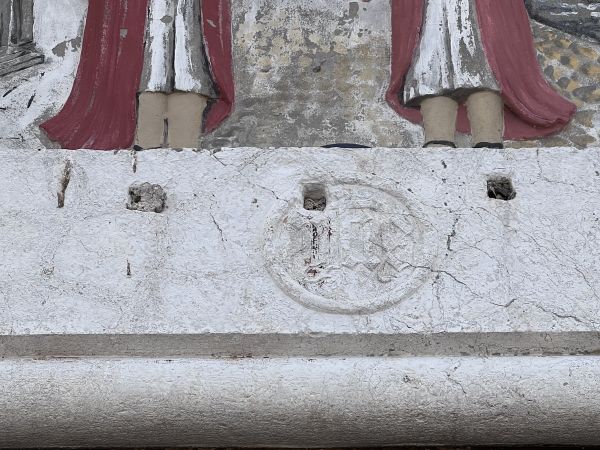 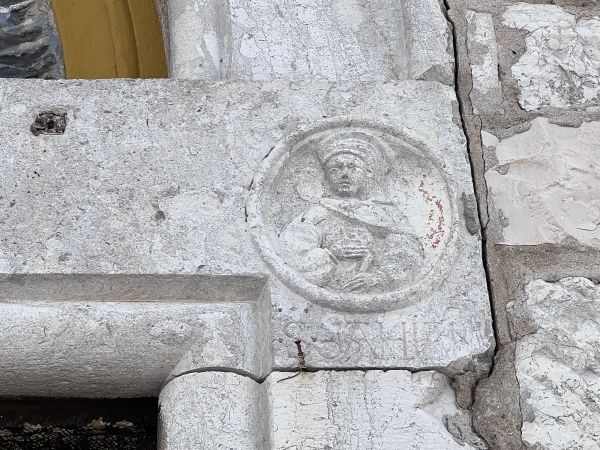 | [S] · COSMAS · // (IESVS)a) // · S · dAMIANV[S] | rectangular | na gredi iznad ulaza na pročelju crkve | For dating, see: https://www.infofazana.hr/istrazi-fazanu/otkrij-fazanu/camino/camino-fazana/zupna-crkva-sv-kuzme-i-damjana/
Check the dating of the inscription, which might be older (the portal is gothic, Milotić 2010: 93). 'A' with downward-bent crossbar and a horizontal bar at the top. | a) IHS (gothic). | |
| PP-23.1.2 | 1541 JL | 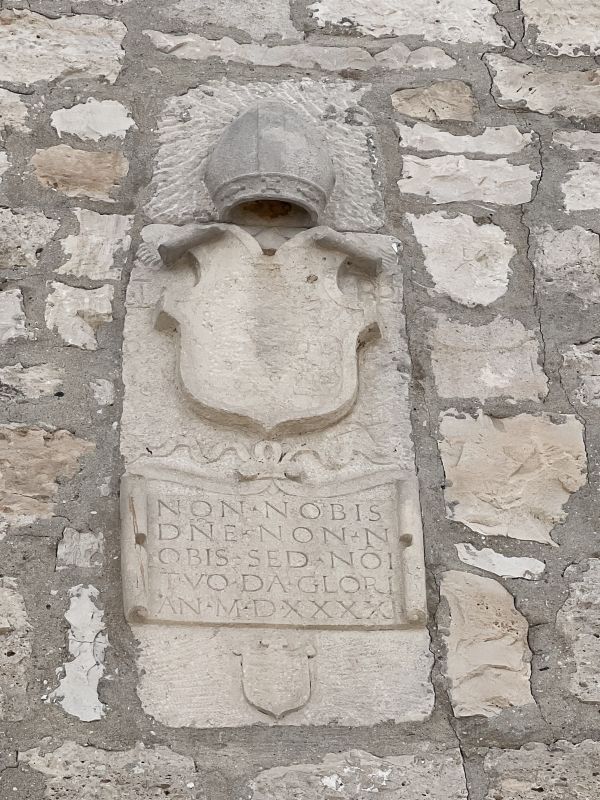 | ATA BPAI(?) // NON · NOBIS / D(OMI)NE · NON · N/OBIS · SED · NO(MIN)I / TVO · DA · GLORI/ANa) · M · D · XXXXI | rectangular | na pročelju crkve, desno od ulaza, visoko iznad tla | In the shape of an open scroll.
Mitre, 2 coats of arms. Justified left and right. Ps. 115,1 | a) Sic. | |
| PP-23.1.3 | 1525 JL | 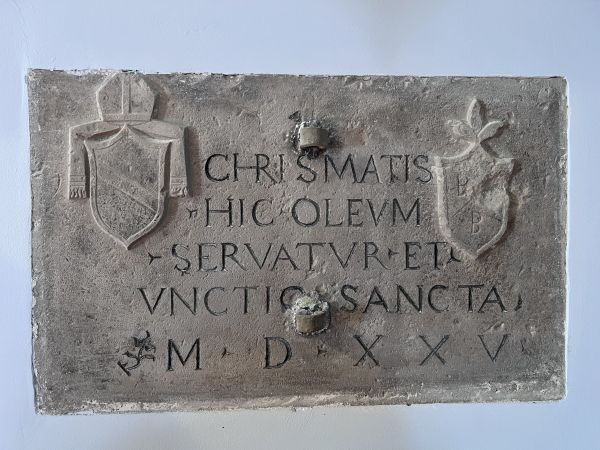 | CHRISMATIS / · HIC · OLEVM / · SERVATVR · ET · / VNCTIOa) SANCTA. / {{ramus}} · M · D · XXV · // B // B | rectangular | na lijevom zidu u apsidi crkve | In the right coat of arms: 'B // B'. | a) 'O' is damaged by a handle. | |
| PP-23.1.4 | 1902 | 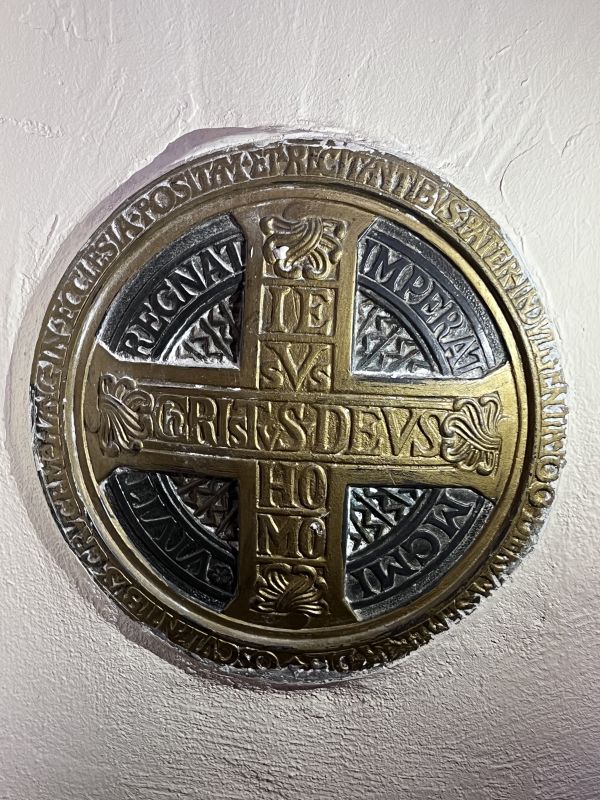 | (...) | circular | na unutarnjem desnom zidu crkve | Metal | ||
| PP-23.10.1 | 1504 JL | 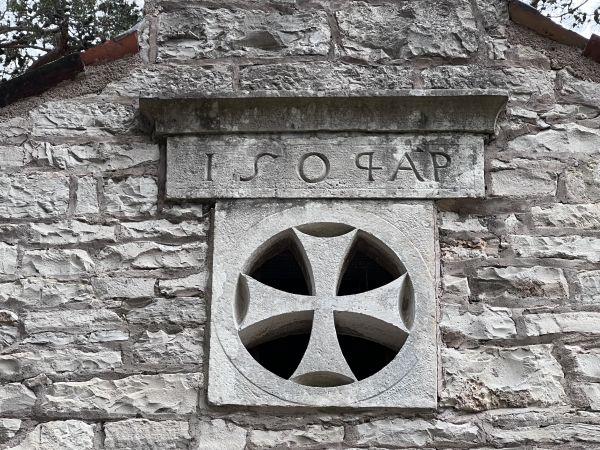 | 1504 A(?) P(?) | rectangular | na pročelju, iznad ulaza a ispod preslice | '5' is 'S'-shaped, '4' is rounded. | ||
| PP-23.2.1 | 1732 | 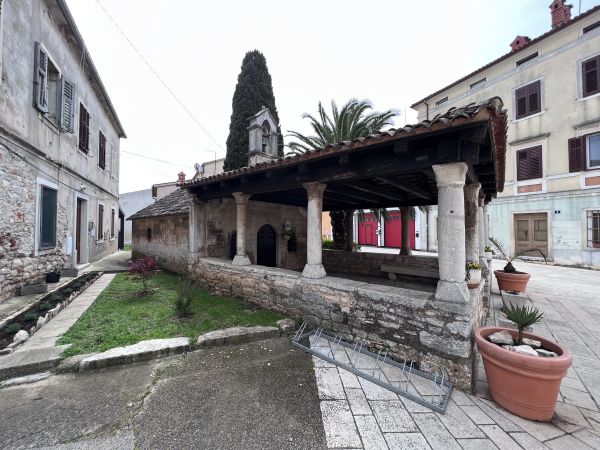 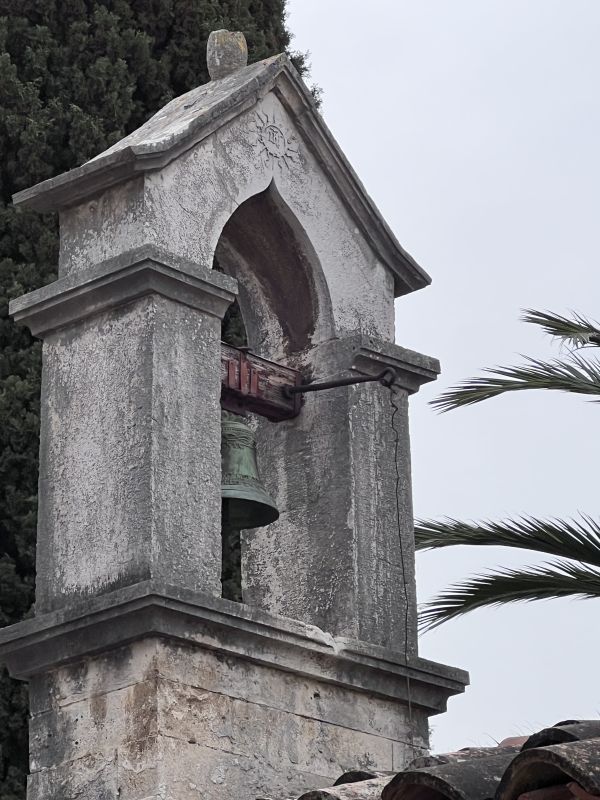 | {{sol}}(IESVS) | circular | Na luku preslice | For dating see https://www.infofazana.hr/istrazi-fazanu/otkrij-fazanu/camino/camino-fazana/crkva-bl-djevice-marije-od-karmela/ | ||
| PP-23.4.1 | 1481 JL | 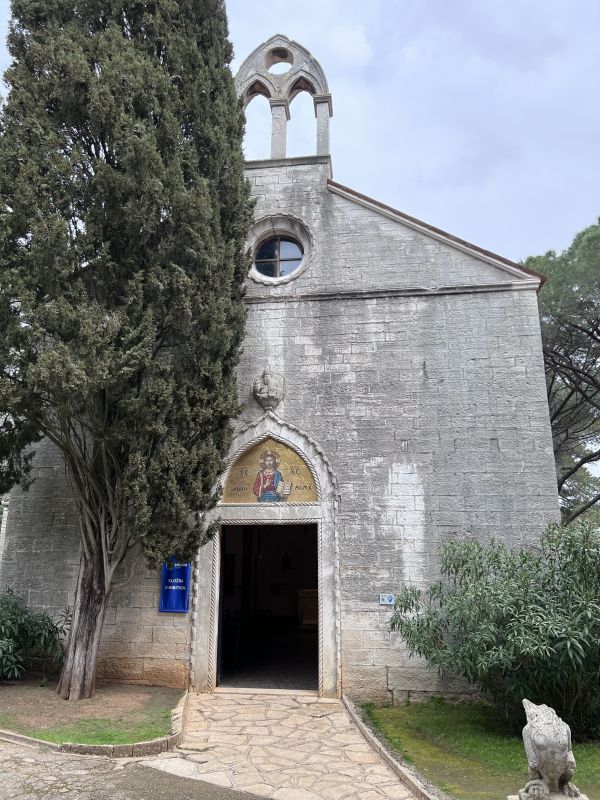 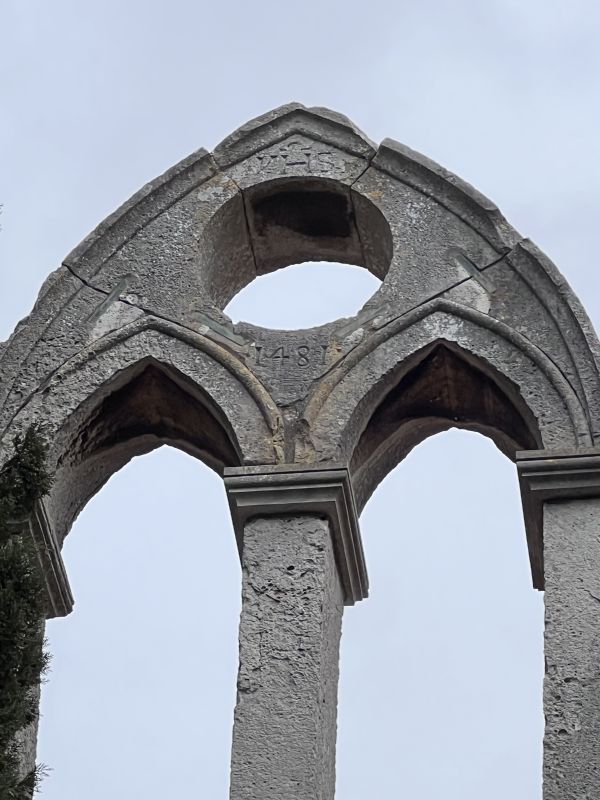 | (IESVS) // 1481 | other | on the front side of the bellcote, above biphora | |||
| PP-23.4.2 | 1535 JL | 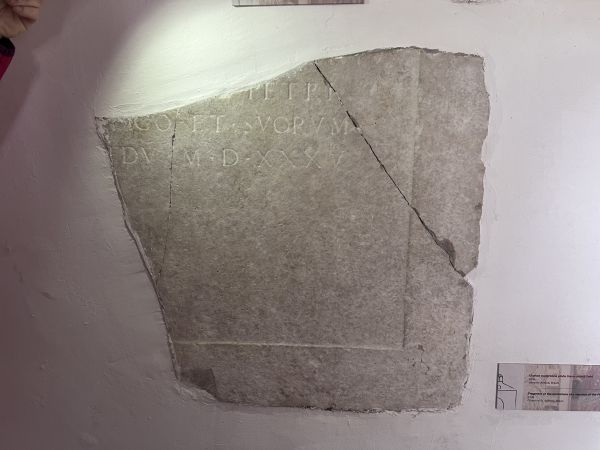 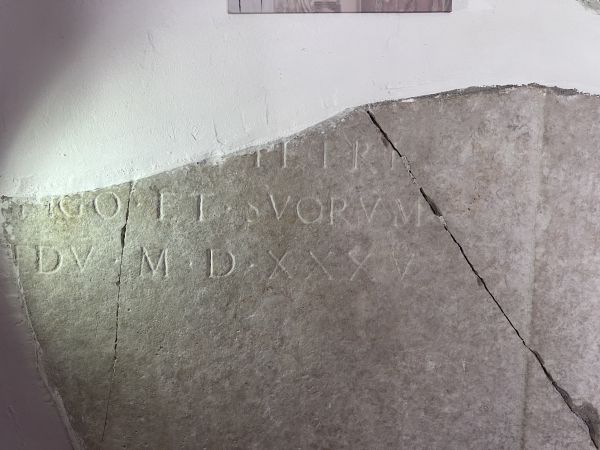 | [– – –] PETRI / [– – –]GO · ET · SVORVM / [HER]EDV(M) · M · D · XXXV | rectangular | U hodniku koji spaja crkvu i sakristiju | PP-23.13 Ulomak nadgrobne ploče člana obitelji Petri, 1535., crkva Sv. Antuna, Brijuni (Krnjak, Radossi 2002). Je li Petri (Petrus) ime, a ...IGO prezime? | ||
| PP-23.4.3 | 1721 | 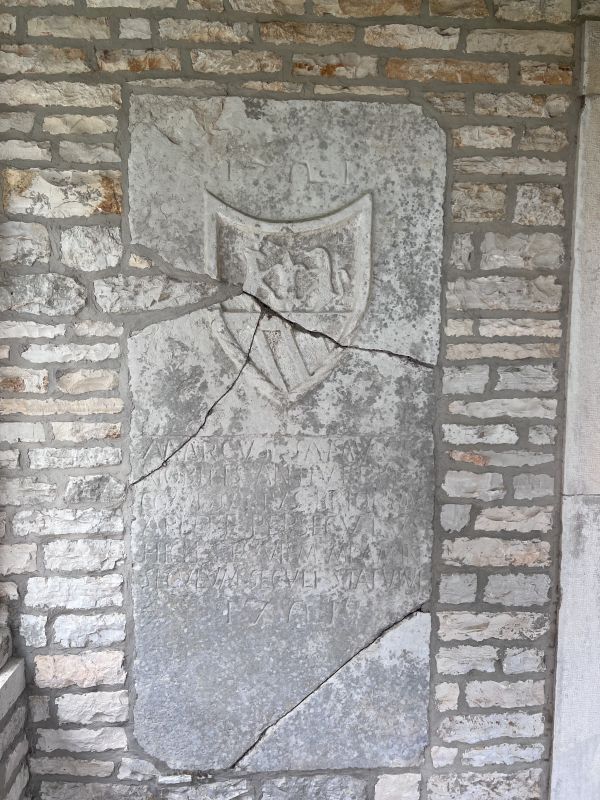 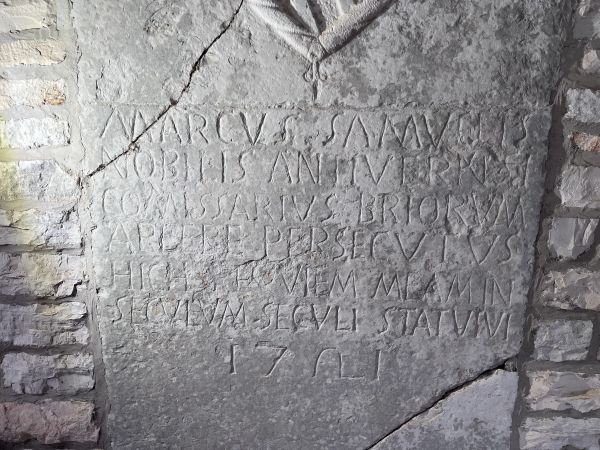 | 1721a) / {{insigne}} / MARCVS SAMVELIS / NOBILIS ANTIVER<E>NSI / COMISSARIVS BRIORVM / A PLEBE PERSECVTVS / HIC REQVIEM MEAM IN / SECVLVM SECVLI STATVIVI / 1721b) | rectangular | Na pročelju sakristije s lijeve strane | PP-23.12 nadgrobna ploča prenesena iz crkve BDM Veli Brijun. v. Članak o obitelji Samuelis | a), b) '2' with prolonged arch and short horizontal bar. | |
| PP-23.4.5 | 1495 JL | 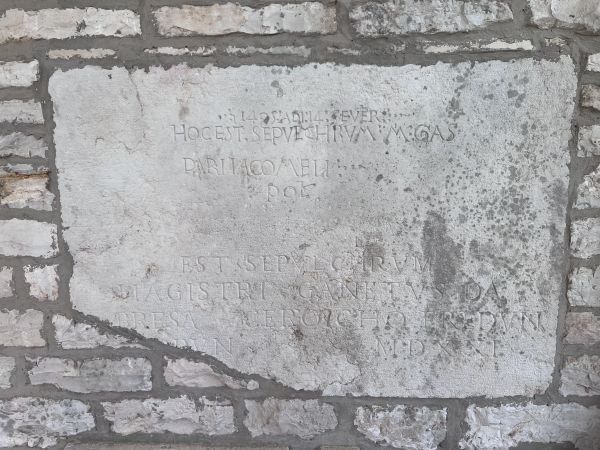 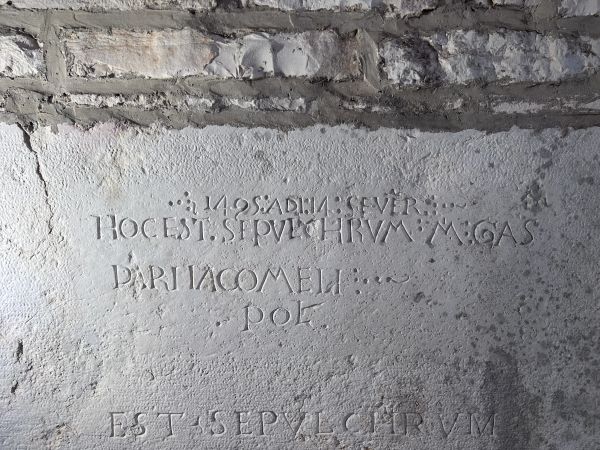 | · 1495 · ADI · 14 · SEVE(M)R(E) · ~ / HOC EST . SEPVLCHRVM . M(AGISTRI) GAS/PARI IACOMELI. ~ / · POL(ENSIS)(?). | rectangular | Na pročelju sakristije s desne strane | Dva natpisa na jednoj ploči. V. Krnjak, Radossi 2002:364 | ||
| PP-23.4.6 | 1521 JL |  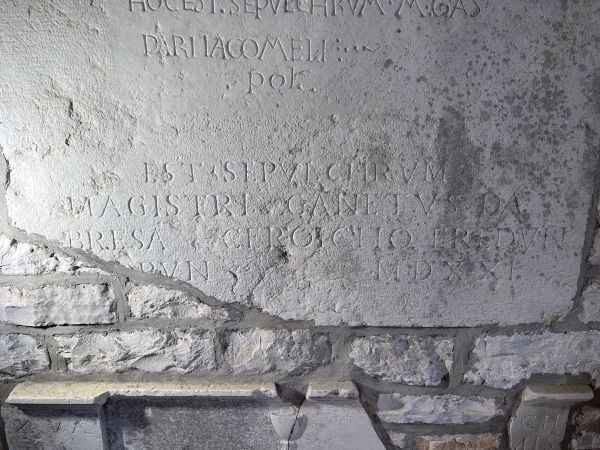 | EST . SEPVLCHRVM / MAGISTRI GANETVS DA / BRESA CEROICHO EREDVN / [– – –]VN MDXXI | rectangular | Na pročelju sakristije s desne strane | Dva natpisa na jednoj ploči (v. PP-23.4.5).
Lower left part is lacking. V. Krnjak, Radossi 2002:364 | ||
| PP-28.1.1 | 1742 | 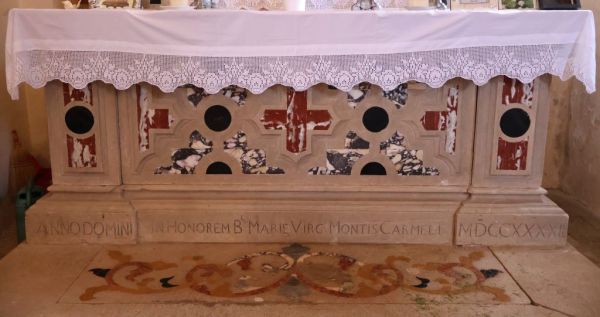 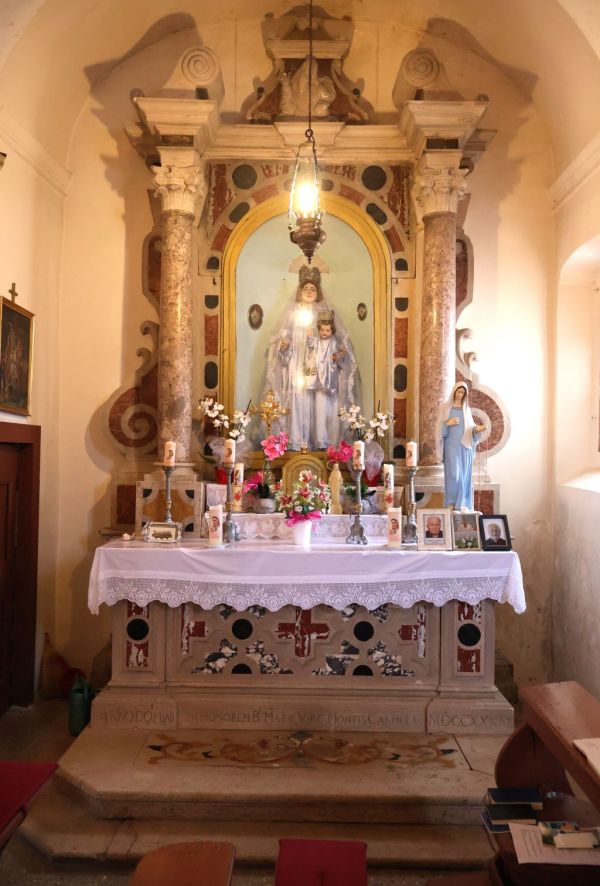 | ANNO DOMINI IN HONOREM BE(ATAE) MARI(A)E VIRG(INIS) MONTIS CARMELI MDCCXXXXII | rectangular | The supersedeanum of the altar of the Blessed Virgin Mary with the Child, a chapel on the northwest side of the church. | painted | The inscription is located on the supedaneum of the altar dedicated to the Blessed Virgin Mary of Mount Carmel. The altar is elevated on two steps. Its rectangular stipes is decorated with geometric inlays of multicolored marble. The central part of the retable features a semicircular niche housing a statue of the Blessed Virgin Mary with the Child, dressed in fabric. The niche is flanked by two columns with composite capitals, behind which are corresponding pilasters whose lower sections expand into volutes. The columns support a profiled cornice, above which are two lateral volutes and a relief with a bust of God the Father in the center. | |
| PP-28.1.2 | 1774 | 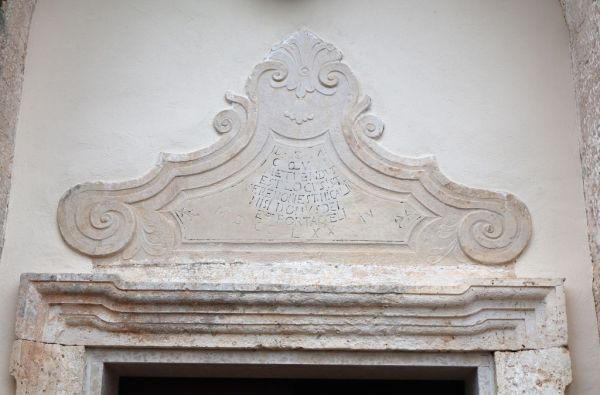  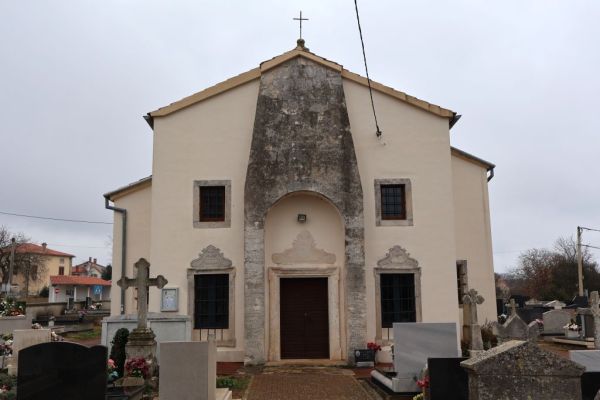 | D(EO) O(PTIMO) MAXIMO / O QUAM / METVENDUS / EST LOCUS ISTE / VERE NON EST HIC ALIU(D) / NISI DOMUS DEI / ET PORTA C(A)ELI / MDCCLXXIV | other polygonal | Above the main portal, on the southwestern façade of the church. | Painted letters, volutes, and vegetal motifs in low relief. | The inscription is located above the main portal of the church on its southwestern façade. The portal is framed by profiled jambs and a lintel, with a polygonal inscription panel above it. The panel is enclosed by a profiled border in low relief, ending in larger and smaller volutes. At the top, the volutes are flanked by a lily motif. Leafy vegetal motifs adorn the lower part of the inscription panel.
| |
| PP-28.6.3 | 1431 JL | 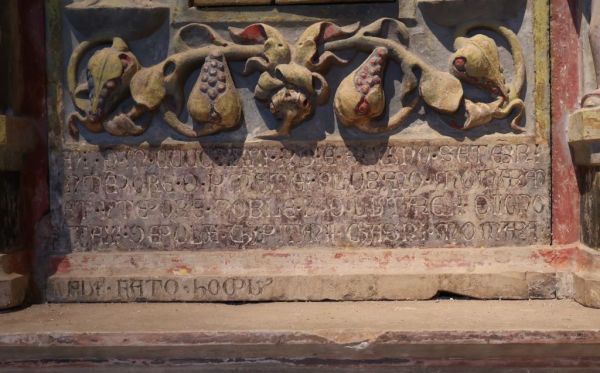 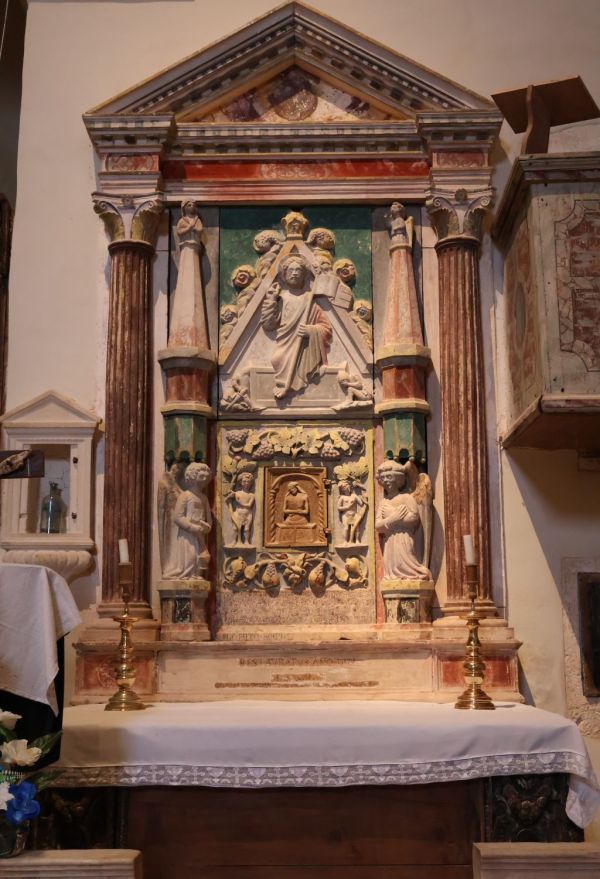 | ANI D(OMINI) M CCCC XXXI IN DIE DECIMO SE(P)TEMBRI/ IN TE(M)PORE D(OMINI) P(RESBYTERI) MATHEI PLOBANO MOMARAN(I)/ ET IN TE(M)PORE NOB(I)LE L D(E) LUTARELI DE IIONO/ TAXI DE POLA CHAPITANI CHASTRI MOMARA(NI)/ FUIT FATO HOC (O)PUS | rectangular | On the custodia to the left of the sanctuary, on the southern side of the church. | painted | The inscription is an integral part of the tabernacle (custodia) located against the wall to the left of the sanctuary. This wall once enclosed the former southern apse of the church. The tabernacle is incorporated into the 16th-century Altar of the Blessed Sacrament.
The altar frames the tabernacle at its center, featuring two wooden fluted pilasters on the sides and a pediment at the top. The tabernacle is made of limestone and is both painted and gilded. It consists of multiple sections. The lower square panel features a compartment for the Eucharist with wooden doors, adorned with a depiction of Imago Pietatis. Surrounding this, in deep relief, is a representation of Adam and Eve holding apples and a serpent, enclosed by a wreath of plants from the Garden of Eden. Below this scene, there is an inscription panel. The upper square panel showcases the Resurrection - Christ emerging from the sarcophagus with a flag, while two sleeping soldiers lie at its base. The scene is framed within a pediment decorated with vegetal motifs. The flanking sides of the central part are designed in the form of a baldachin. Below the baldachin, there is a depiction of two angels, while above it, at its peak, are figures from the Annunciation - the Archangel Michael and the Virgin Mary. Making of the tabernacle is attributed to Master Dominik, who worked in Pula and its surroundings in the 15th century, and who signed the tabernacle from the Church of the Nativity of the Blessed Virgin Mary in Rakalj. | |
| PP-28.6.4 | 1593 | 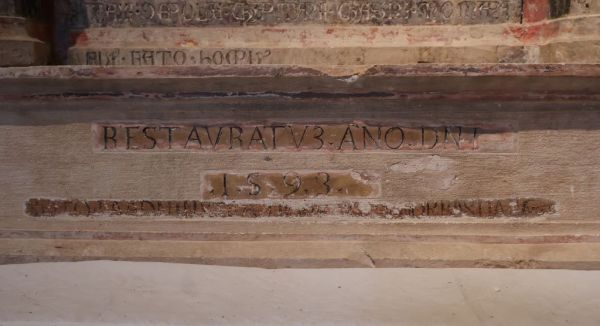 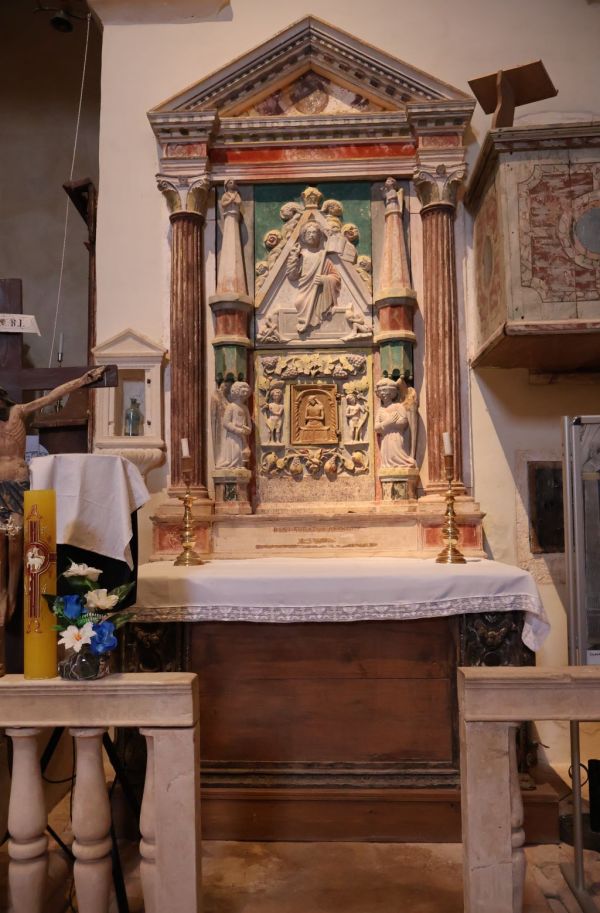 | rectangular | Predella of the altar of the Blessed Sacrament to the left of the sanctuary, on the southern side of the church. | painted | The inscription is located on the predella of the Altar of the Blessed Sacrament, positioned against the wall to the left of the sanctuary. This wall once enclosed the former southern apse of the church. At the center of the altar is a tabernacle from 1431, attributed to Master Dominik. The altar, consisting of a stipes and a retable made up of the central tabernacle, flanked by two wooden fluted pilasters on the sides and topped with a pediment, is entirely painted. | ||
| PP-29.2.1 | 1729 | 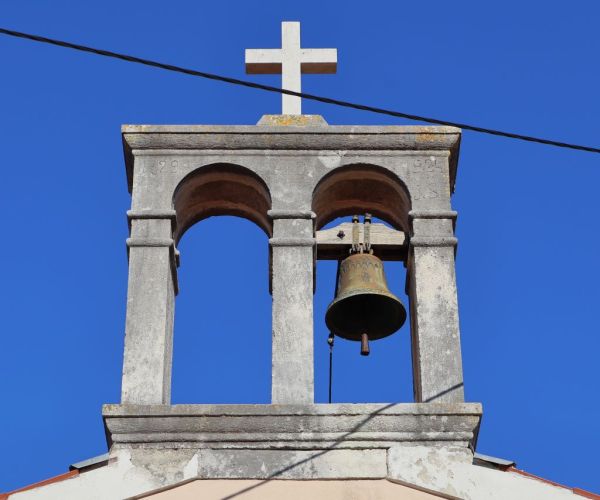 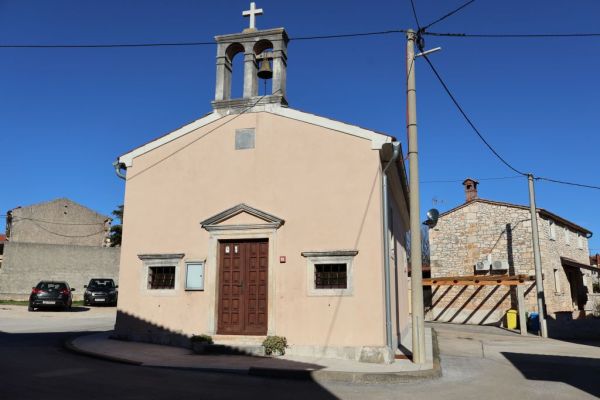 | 1729 // A(NNO) D(OMINI) // 1924 / J. S. | other | Spire of the bell tower, main facade. | The inscription in two lines is located on the spire for two bells on the facade of the church. It is carved on the upper part, above the arches that overshadow the bells (of which only one has been preserved). Above the inscription, there is a profiled, prominent cornice, and above it, in the center, a stone Latin cross on a trapezoidal base. The pilasters of the spire, which support the arches, are decorated with two parallel rounded moldings on each side. | It was not possible to measure the inscription due to the height. | |
| PP-3.1.1 | 1893 | 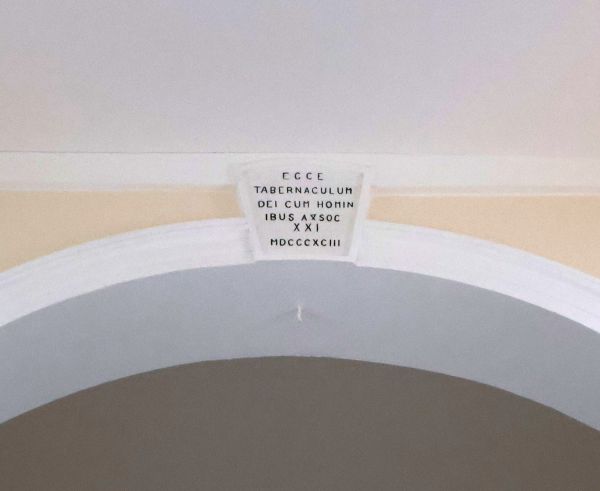 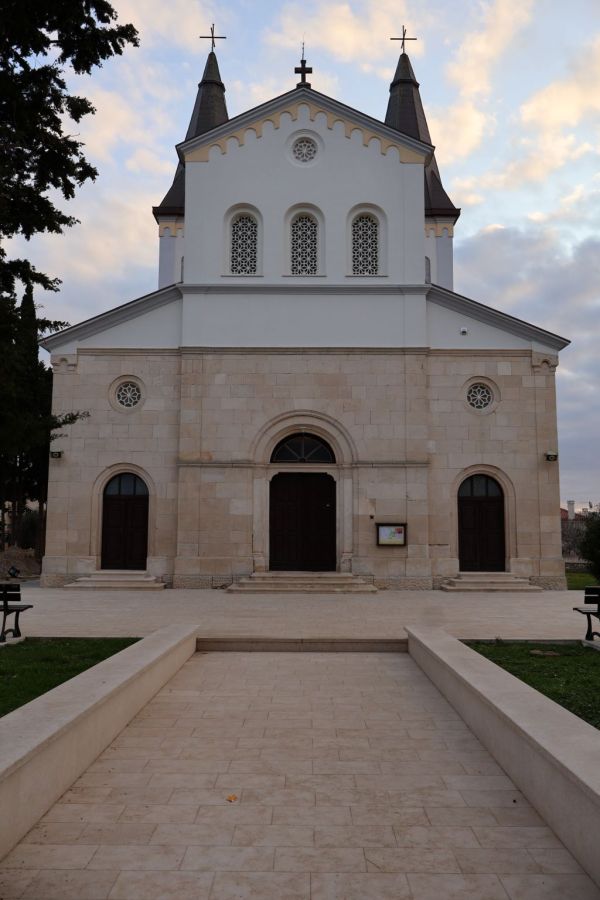 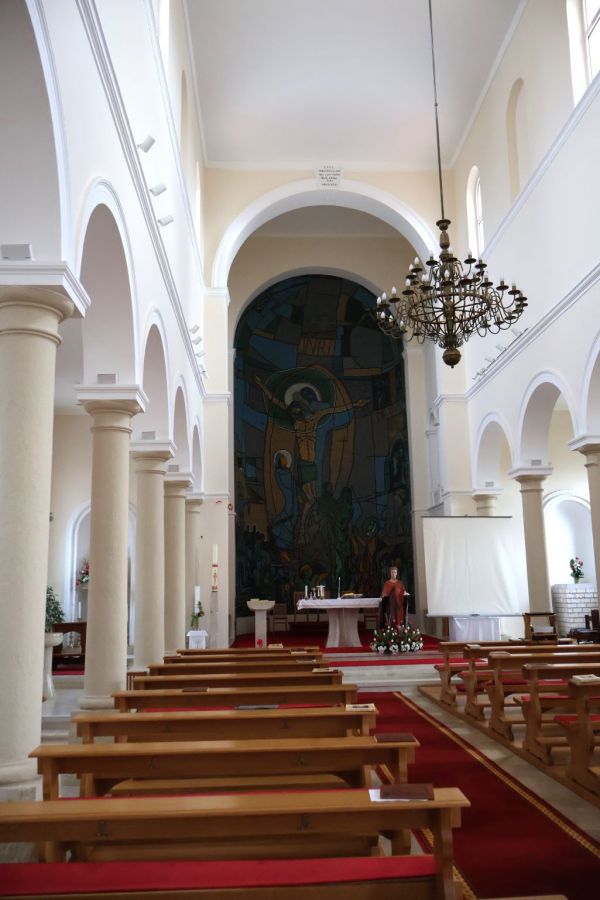 | ECCE / TABERNACULUM / DEI CUM HOMIN/IBUS AXSOCa) / XXI / MDCCCXCIII | trapezoid | Keystone of the Triumphal Arch. | molded edge, painted letters | The inscription is located in the center of the triumphal arch of the church, within an almost trapezoidal field with a molded edge. The letters of the inscription are carved and painted in black, while the remaining surface of the field, as well as the triumphal arch, are painted white. The inscription contains a text from the New Testament: "Behold, the tabernacle of God with men" (Revelation 21,3), along with the year of the church's construction, 1893. The church was built on the site of an older, smaller church with an adjacent cemetery and bell tower. At the end of the 19th century, the reconstruction of St. Agnes Church began, and the cemetery was relocated. The design for the new church was made by architect Andjelo Meyer in 1891. The church was constructed during the tenure of parish priest Andrea Bylica and was consecrated in 1894 by the Bishop of Poreč and Pula, Ivan Krstitelj Flapp. The church is a three-naved basilica with an apse and two bell towers. Both bell towers were completed in 1912. The inscription was not measured because of the height. | a) Sic. (APOC(ALYPSIS)?) |
| PP-3.5.1 | 1601 | 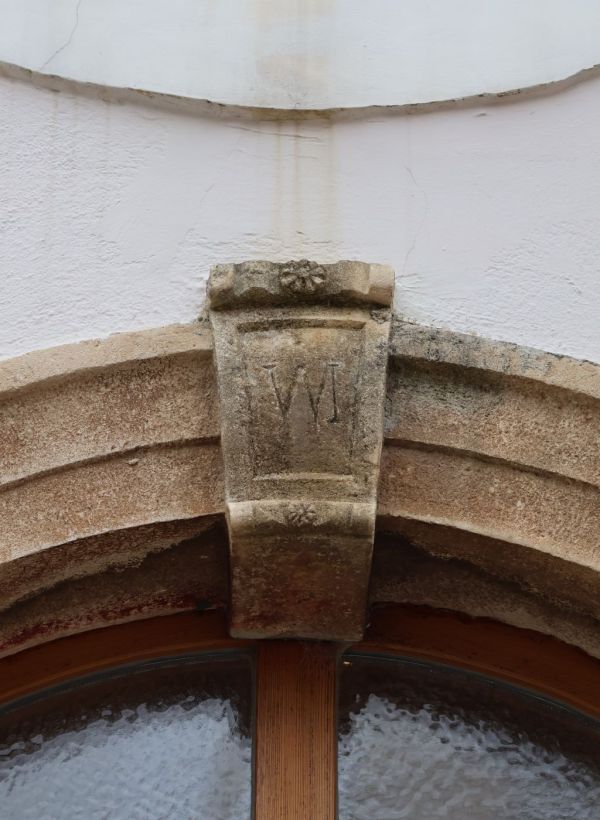 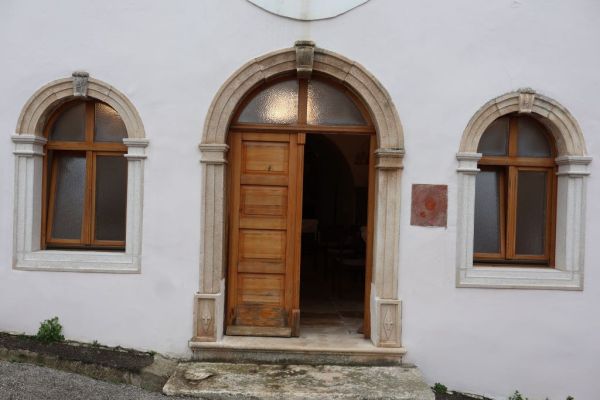 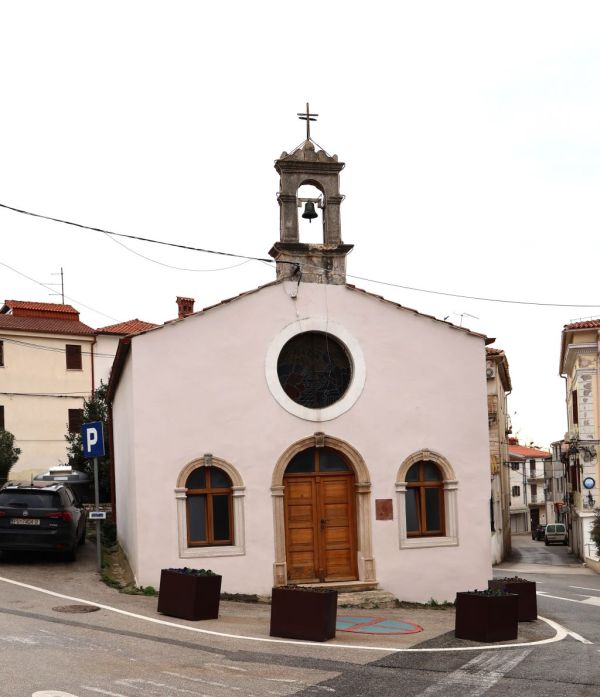 | trapezoid | The keystone in the center of the arch of the main portal, the western façade of the church. | A trapezoidal inscription field with a profiled edge. At the top and bottom, there is a rounded projection, with relief rosettes sculpted in the center of each. | For dating see https://www.istrapedia.hr/hr/natuknice/251/medulin | ||
| PP-3.6.1 | 1928 | 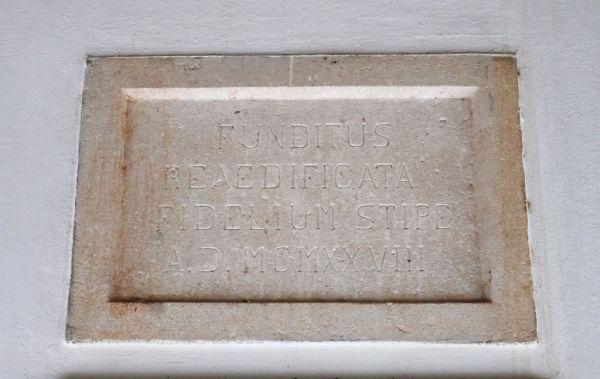 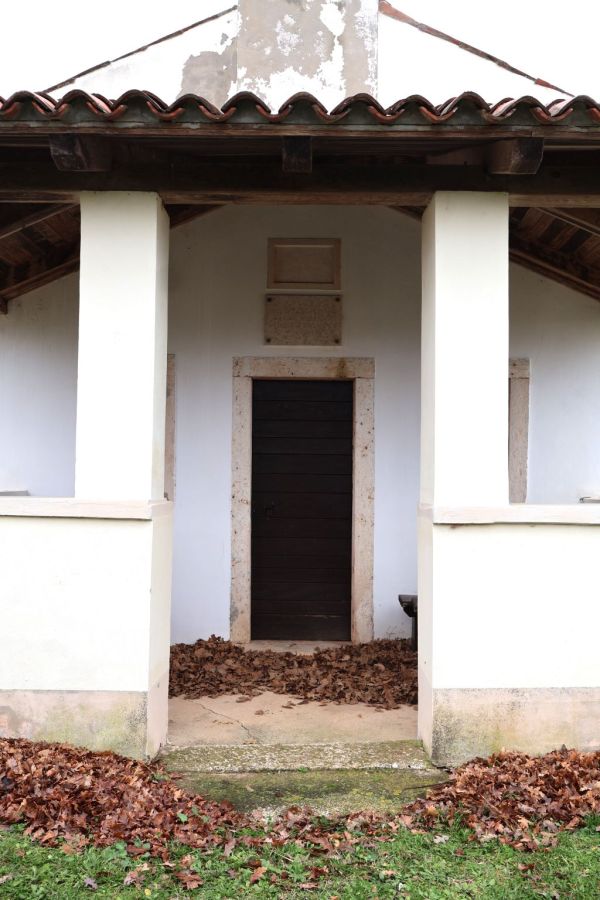 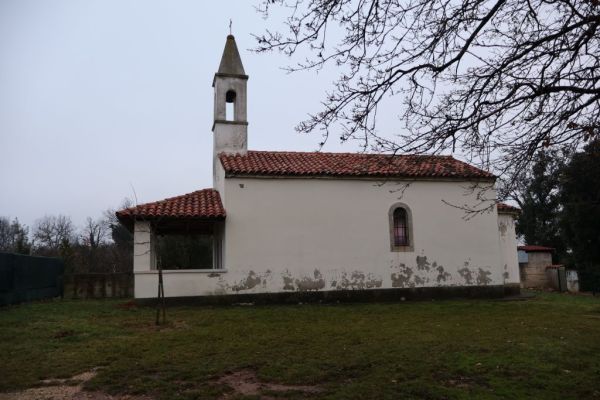 | FUNDITUS / REAEDIFICATA / FIDELIUM STIPE / A(NNO) D(OMINI) MCMXXVIII | rectangular | Inscription on the plaque above the main portal, west facade of the church. | The present church of St. Peter on Borbolan was built on the site of an earlier church. Its remains suggest that the church had a pre-Romanesque phase. There was also a village in the area, which was abandoned in 1456. The present church was rebuilt in 1928, and it was also renovated in 1999, as evidenced by two inscription plaques above the portal on the western façade. The plaque about the construction from 1928 is written in Latin, while the plaque about the renovation from 1999, located below it, is in Croatian. The new church, built in 1928, received an apse, a porch on the western façade, and a bell tower 4.50 meters high, which the previous church did not have. Additionally, the new church was narrower on the northern side, and its floor was raised by 1 meter compared to the old church. The church was destroyed and looted after World War II. At that time, the statue of St. Peter was relocated to the parish church. It was renovated in 1999, as evidenced by the aforementioned inscription. | ||
| PP-31.1.1 | 1937 | 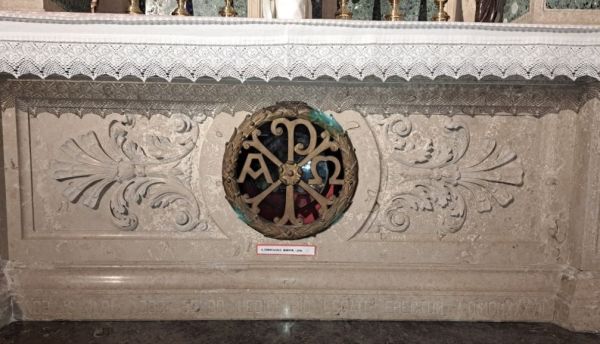 | NOBILIS VIRI IACOBI BEMBO MEDICI PIO LEGATO ERECTUM A(NNO) D(OMINI) MCMXXXVII | rectangular | na dnu drugog oltara s lijeve strane od ulaza | |||
| PP-31.1.2 | 1451 JL | 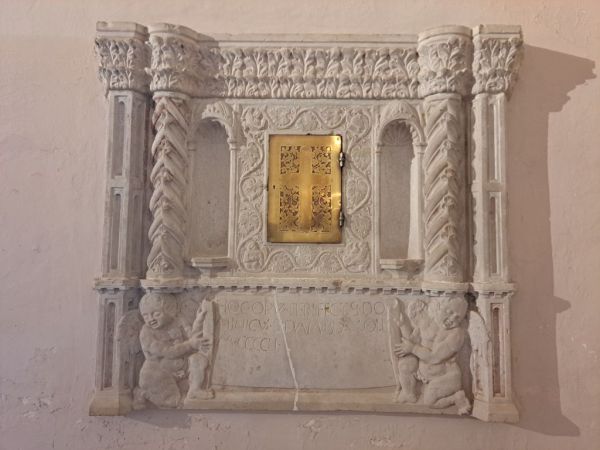 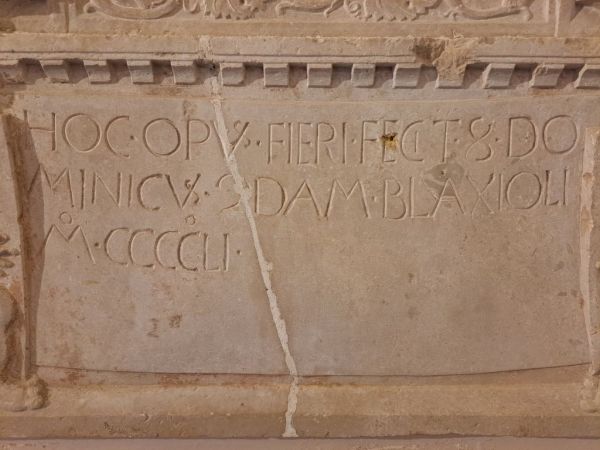 | HOC · OPV(S) · FIERI · FECITb) · S(ER) · DO/MINICV(S) · (CON)DAM · BLAXIOLI / M(ILLESIM)O · (QUADRINGENTESIM)O LIb) · | rectangular | na zapadnom zidu od crkve, kod ulaza u zbirku sakralne umjetnosti, 122 cm od poda | anđeli drže svitak | The inscription is located within a stone tabernacle embedded in the wall of the northern aisle of the church. The tabernacle originates from an earlier church. Traces of color are visible on it, suggesting that the tabernacle, in addition to its relief decorations, was originally adorned with painting. The upper part of the tabernacle has a compartment (with metal doors) framed by a wreath of vine, and at the corners, in medallions, are symbols of the four evangelists. To the left and right of the compartment, there is a shallow niche, vaulted with a shell-shaped dome and a cupola, bordered by small columns. Next to the niches, there is a half-column and a pilaster, and above them stretches a wreath made of two rows of leaves. The lower part of the tabernacle is occupied by an inscription, executed on a scroll, which is supported by two naked angels.
The lower part is almost cracked in the center, and the crack is filled with a bonding material. Text justified left and right. | a) 'I' inside 'C'. b) Number written as M CCCCLI with small 'O' above 'M' and the last 'C' in CCCC. |
| PP-31.1.3 | 1791 | 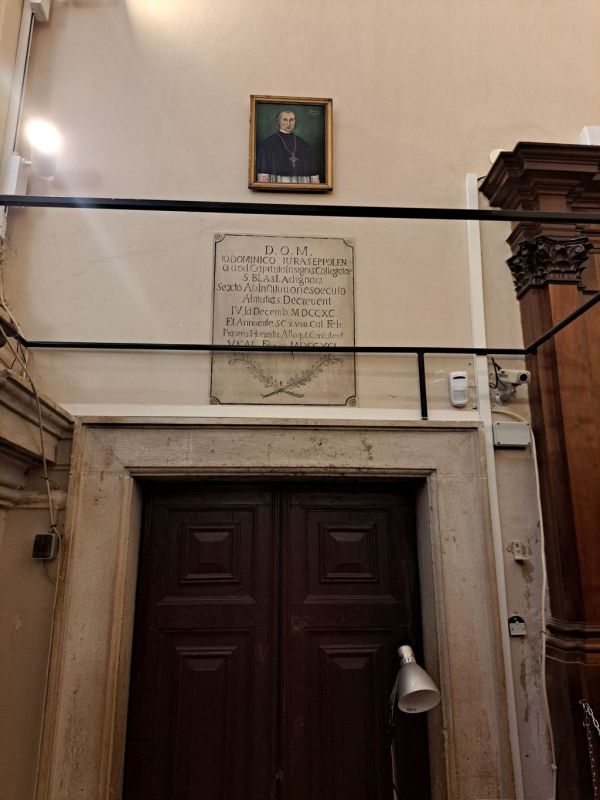 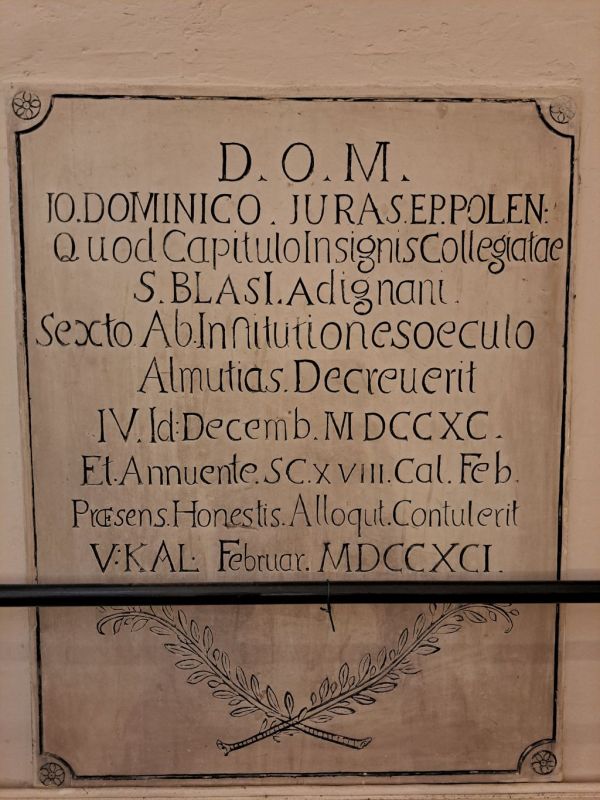 | D(EO) O(PTIMO) M(AXIMO) / JO(ANNES) DOMINICO . JURAS . EP(ISCOPUS) POLEN(SIS) / Quod Capitulo Insignis Collegiatae / S(ancti) . BLASI . Adignani . / Sexto Ab Institutionea) soeculob) / Almutias . Decreuerit / IV. Id(us) Decemb(res) . M DCCXC . / Et . Annuente . S(acra)(?) C(ongregatione)(?) XVIII. Cal(endas) Feb(ruarias) / Praesensc) . Honestis . Aliquotd) . Contulerit / V · KAL(ENDAS)e) · Februar(ias) MDCCXCI. {{duo palmae}} | rectangular | iza glavnog oltara, s lijeve strane od prezbiterija | ukrštene maslinove grančice, florealni elementi u kutovima | Rectangular inscription with circular inlets in the corners, in which floral elements are added.
Letters filled with well-preserved black paint. Text centered. Letters slightly irregular, entire names and initial letters of all words are in majuscule. Dragutin NEŽIĆ, Barbanski kraj u prošlosti: prigodom 270-godišnjice župne crkve u Barbanu, Barban 1971: 13 Bertoša 2004: 71 | a) No blank space after this word.
b) Sic. c) Original: Prɶsens. d) Original: 'Aloqut'. e) 'A' with bent pointed crossbar, only at this place. |
| PP-31.1.4 | 1935 | 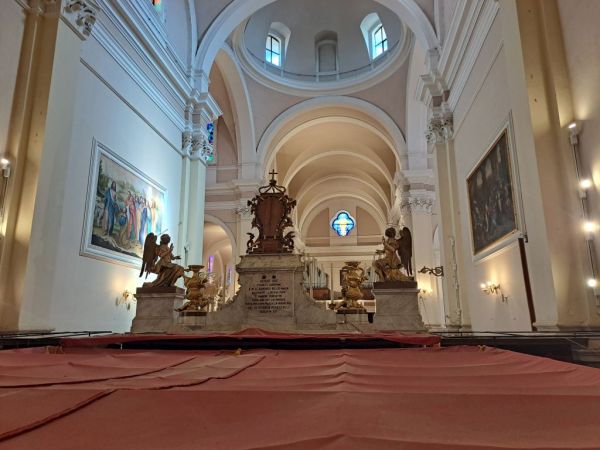 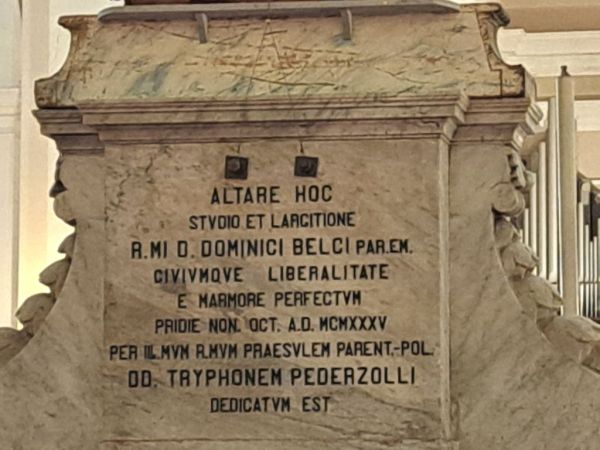 | ALTARE HOC / STVDIO ET LARGITIONE / R(EVERENDISSI)MI D(OMINI) DOMINICI BELCI PAR(OCHI) EM(ERITI) / CIVIVMQVE LIBERALITATE / E MARMORE PERFECTVM / PRIDIE NON(AS) OCT(OBRES) A(NNO) D(OMINI) MCMXXXV / PER ILL(VSTRISSI)MVM R(EVERENDISSI)MVM PRAESVLEM PARENT(INO)-POL(ENSEM) / D(OMINUM) D(OMINUM) TRYPHONEM PEDERZOLLI / DEDICATVM EST | rectangular | na poleđini glavnog oltara | natpis je zbog skela teško dostupan i zato se ne može izmjeriti Centered text, coloured in black, colour is preserved, some lines are larger | ||
| PP-31.1.5 | 1776 | 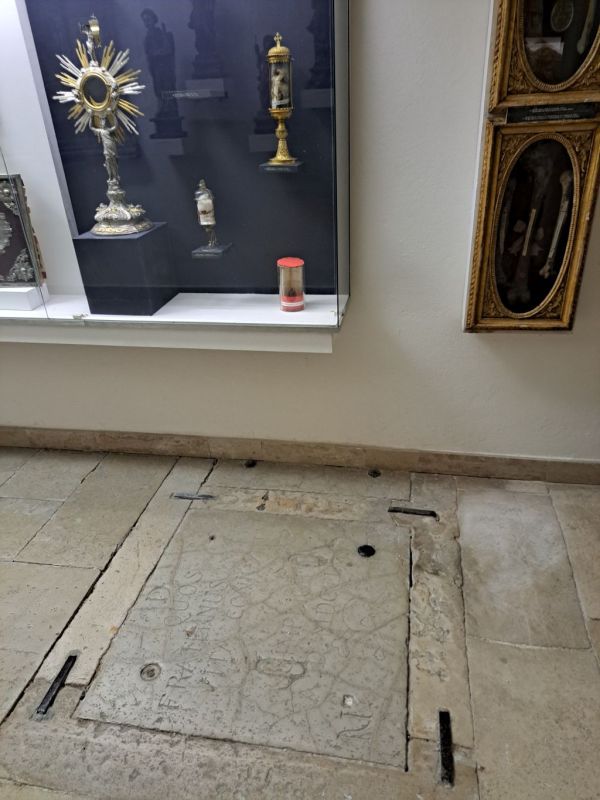 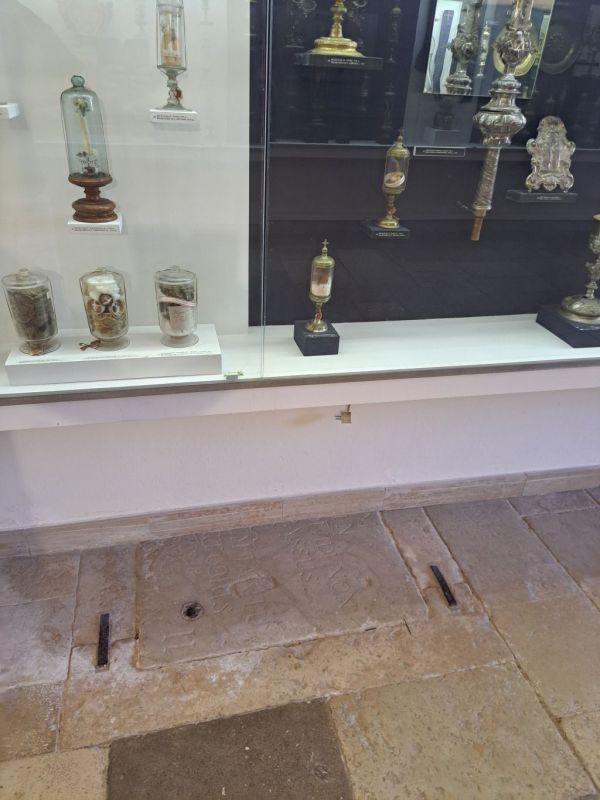 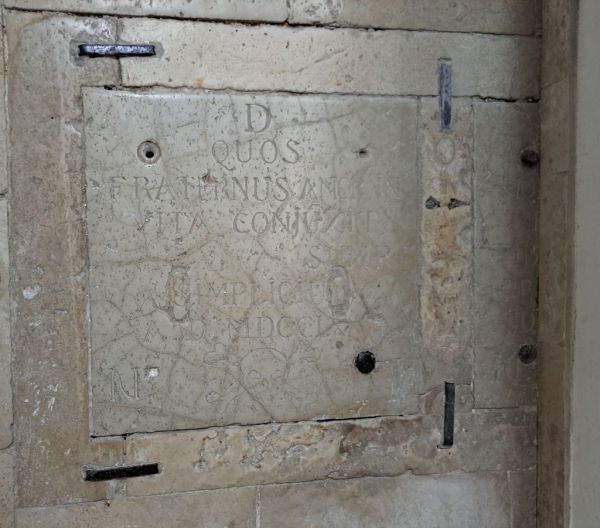 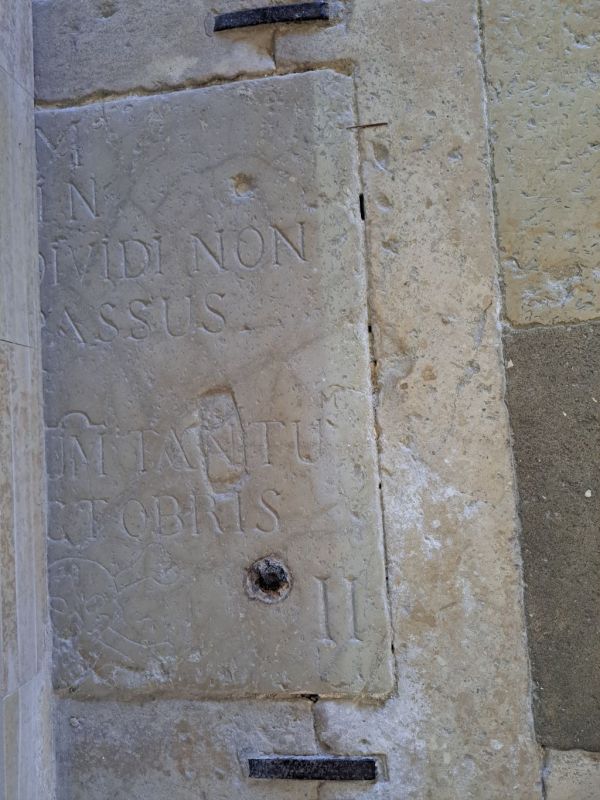 | D(EO)a) // O(PTIMO)b) // M(AXIMO)c) // QUOS / FRATERNUS AMOR IN / VITA CONJU(N)XITa) // IN / MO[RTE D]IVIDI NON / [EST P]ASSUSc) // SUMP//TIB[US]a) // SIMPLICIUM PE[R(SONAR)]UM TANTUMc),d) // A(NNO) D(OMINI) MDCCLXXVIa) // ID(IBUS) [O]CTOBRISc) // N(UMERUS) Ia) // N(UMERUS) IIc) | rectangular | in the room containing the collection of sacral art within the church, on the floor. | At the bottom of each of the two main fields a skull with crossed bones. | The inscription goes across two fields on separate stones and a smaller stone in the middle, which has only 'O' from 'D. O. M.' The right stone is overlaid by a modern partition in the direction top-bottom. The dimensions of the main fields are as indicated above; the middle one is 160x870.
The text is centered. 'I' has a dot. At the bottom of each of the two main fields there is a skull with crossed bones. | a) On the left stone.
b) On the middle stone. c) On the right stone. d) 'M' is smaler and in superscript. |
| PP-31.1.6 | 1835 | 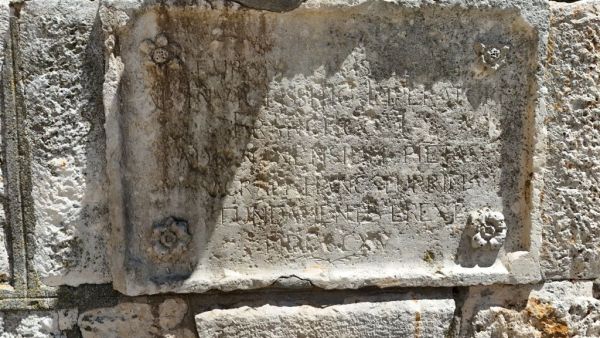 | [– – –] / EUROPAE(?) PACIS(?) / AB INVICTISSIMO IMPERATORE / FRANCISCO I / ADIGNANENSIUM PIETAS / SACRAM HANC TURRIM / FUNDAMENTIS EREXIT / MDCCCXV | rectangular | iznad ulaza u crkveni toranj | cvjetovi u četiri kuta natpisnoga polja | natpis zbog visine nije bilo moguće izmjeriti, a zbog oštećenosti slova ne može se u potpunosti pročitati Text centered, 'A' with a bent pointed crossbar. Larger are first letters of names and emperor's attributes. | |
| PP-31.13.1 | 1954 | 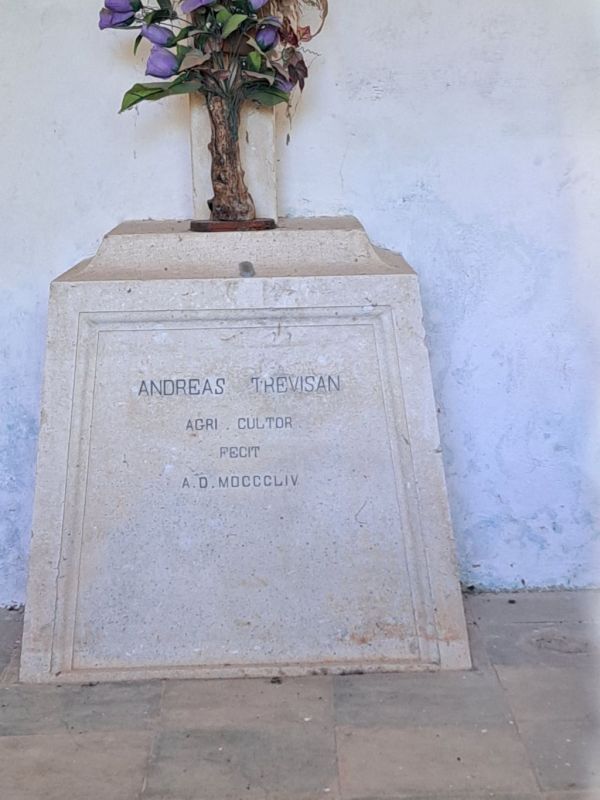 | ANDREAS TREVISAN / AGRI CULTOR / FECIT / A(NNO) D(OMINI) MDCCCCLIV | trapezoid | na mjestu glavnog oltara, kao postolje raspela | do natpisa nismo mogli doći, već smo ga slikali izvana; u slovima je crna boje, trapezoidnog oblika
Centered. Made by a famous self-taught artist. | ||
| PP-31.16.1 | 1468 JL | 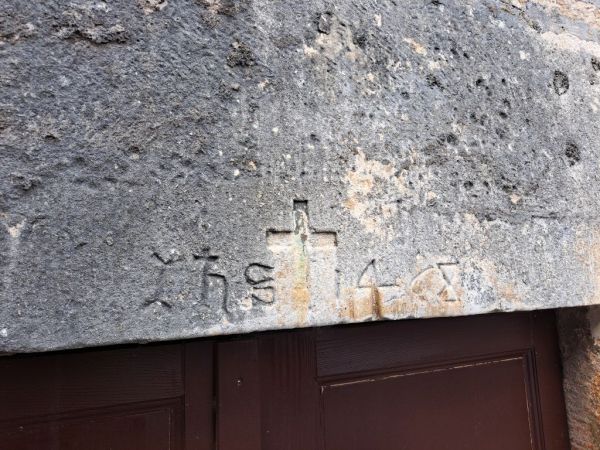 | IhSa) {{crux}}b) 1468c) | rectangular | nadvratnik | Irregular quadrangle. | a)In "h", a horicontal bar crosses the vertical bar (ħ).
b)Cross is larger than the rest of the text. c)Number '8' is shaped like two triangles. | |
| PP-31.20.1 | 1501 JL | 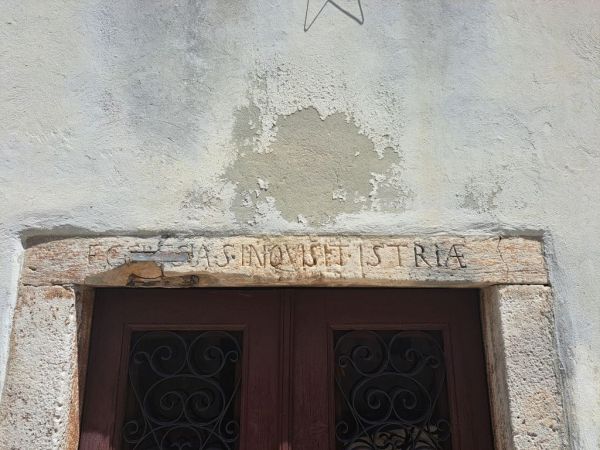 | EC[CCLESI]Aa) · S(ANCTAE) · INQVISIT(IONIS) · ISTRIAE | rectangular | nadvratnik | Natpis svjedoči da je ovo bilo sjedište Svete inkvizicije u Istri. Nadvratnik je pukao, spojen je željeznim okovom; datacija prema literaturi. | a) The middle letters ar partly visible. | |
| PP-31.20.2 | 1775 | 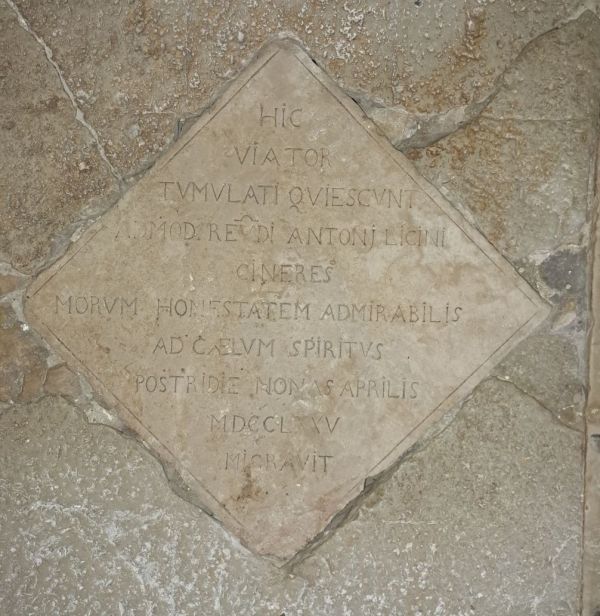 | HIC / VIATOR / TVMVLATI QVIESCVNT / AMOD(VM) RE(VEREN)DI ANTONIIa) LICINI / CINERES / MORVM HONESTATE{M} ADMIRABILIS / AD CAELVM SPIRITVS / POSTRIDIE NONAS APRILIS / MDCCLXXV / MIGRAVIT | rectangular | na podu u sredini crkve | obrub koji označava natpisno polje | romboidno okrenuto, svako I ima točku, tj. minuskulno je; u slovima je dobro očuvana boja
duljine stranica: polje - 480 x 475, nositelj: 482 x 477 The text is centered. 'I' with a dot above. 'A' with bent crossbar. | a) Shaped like 'J'. |
| PP-31.25.1 | 1530 JL | 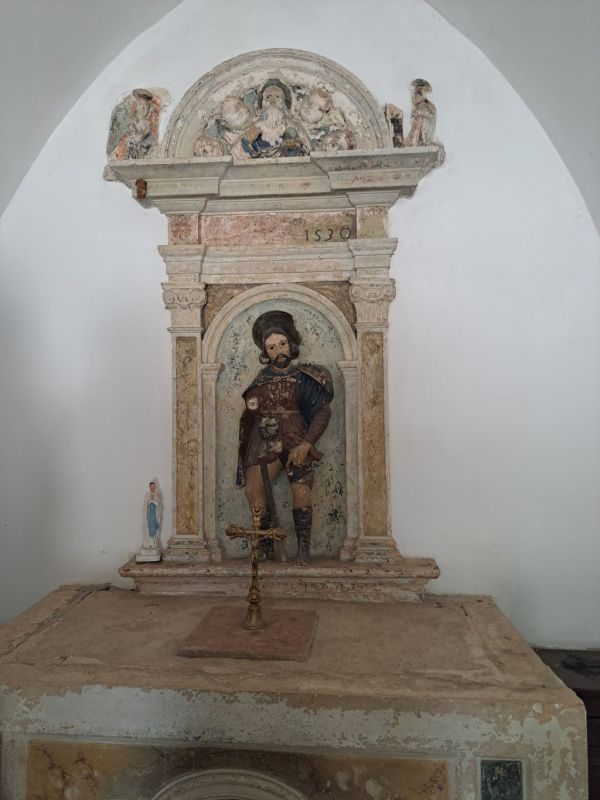 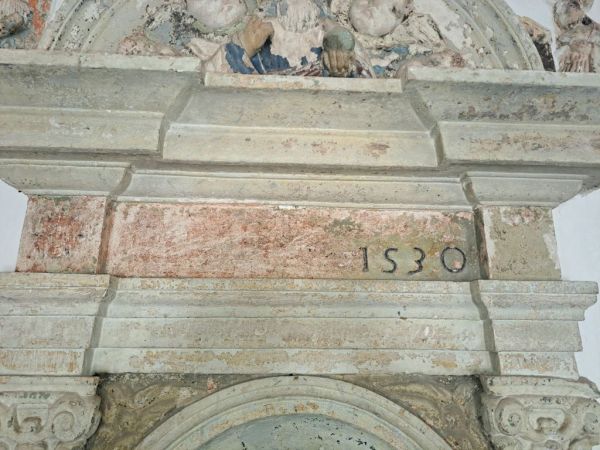 | 1530 | rectangular | na glavnom oltaru | prebojano, natpis ima boju In bottom right corner of the field. | ||
| PP-31.4.1 | 1846 | 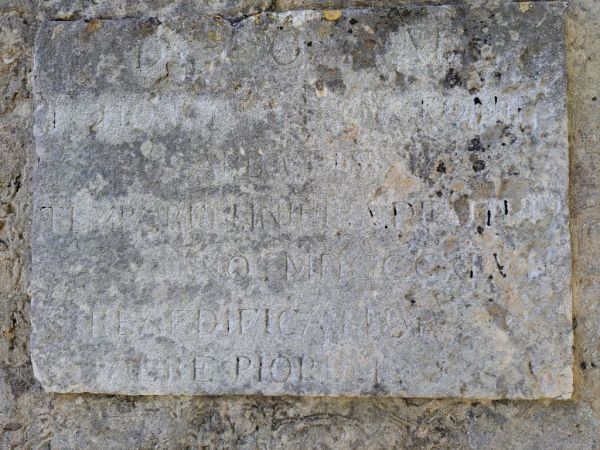 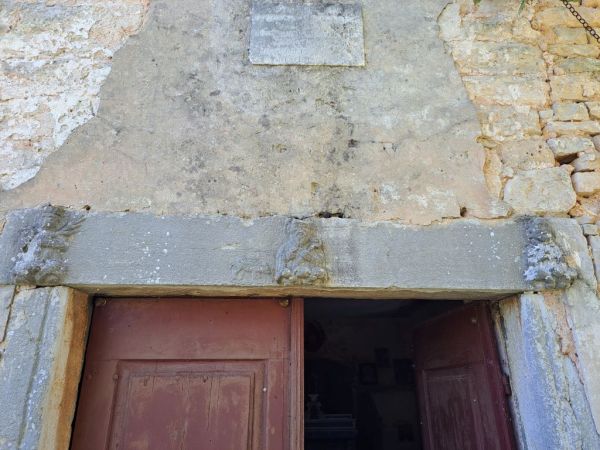 | D(EO) O(PTIMO) M(AXIMO) / [IN](?) HO[NOREM](?) S[ANCTI](?) ANTONII / ABBATIS / TEMPORUM INJU[RIA] D[ER]U[T]UM / A[N]NO MDCCCXLVI / REAEDIFICATUM / AERE PIOR[U]M | rectangular | direktno iznad portala na visini od 307 cm od poda | slova su bila ispunjena bojom, ali je boja uglavnom otpala; u jednom kutu malo oštećenje Centered text. Letters were coloured, but the ink is mostly washed away. | ||
| PP-31.5.1 | 1743 | 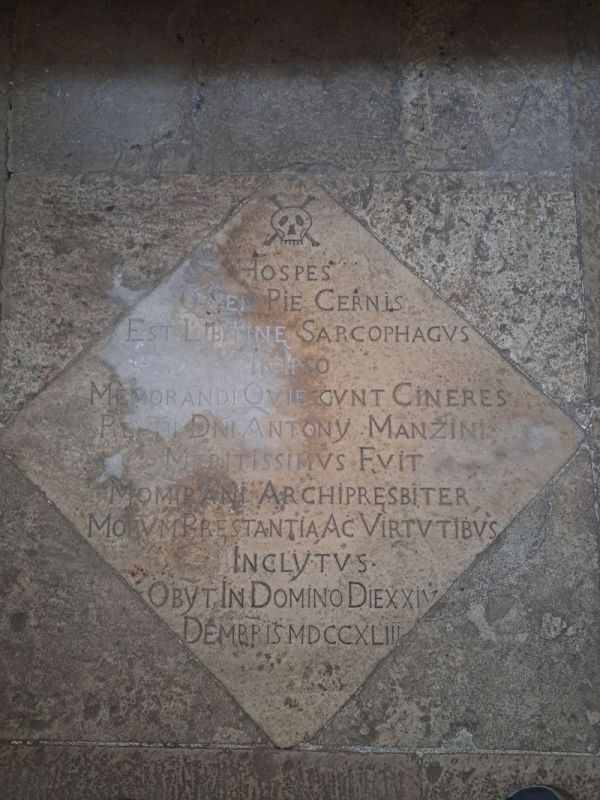 | {{(calvaria)}} / HOSPES / QUEM PIE CERNIS / EST LIBITINAEa) SARCOPHAGVS IN IPSO / MEMORANDI QUIESCVNT CINERES / REV(ERENDISSI)MI DOMINI ANTONIIb) MANZINI / MERITISSIMVS FVIT / MOMIRANI ARCHIPRESBITER / MORVM PRAESTANTIA AS VIRTVTIBVS / INCLYTVS / OBIITc) IN DOMINO DIE XXIV / DE(CE)MBRIS MDCCXLIII | rectangular | nadgrobna ploča na podu u lijevoj pobočnoj kapelici | mrtvačka lubanja s kostima | Okrenuto romboidno Text centered; small capitals; all initials are large. Letters are filled with partly preserved ink. 'I' has a dot above, 'A' has a bent crossbar. | a) E caudata.
b) Shaped like 'Y' wiht dots (Ÿ). c) Shaped like 'Y' with a tilde (Ỹ). |
| PP-31.5.2 | 1796 | 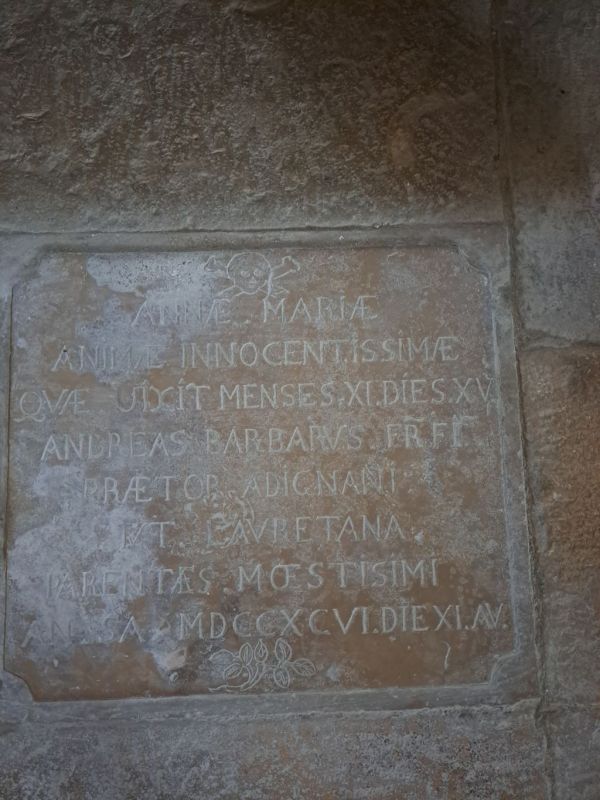 | {{(calvaria)}} / ANNAE . MARIAE / ANIMAE INNOCENTISSIMAE / QVAE UIXIT MENSES . XI . DIES . XV / ANDREAS BARBARVS FR(ANCISCI) FI(LIvS) / PRAETOR . ADIGNANI . / [E]T . LAVRETANA . / PARENTESa) . MOESTISSIMI / AN(NO) . SA(LVTIS) MDCCXCVI . DIE XI . AV(GVSTI) . / {{(ramus foliatus)}} | rectangular | nadgrobna ploča na podu u desnoj pobočnoj kapelici | mrtvačka lubanja s kostima na vrhu i listovi na dnu | Centered, letters partly faded.
| a) Final 'E' corrected from 'A'. |
| PP-31.5.3 | 1664 | 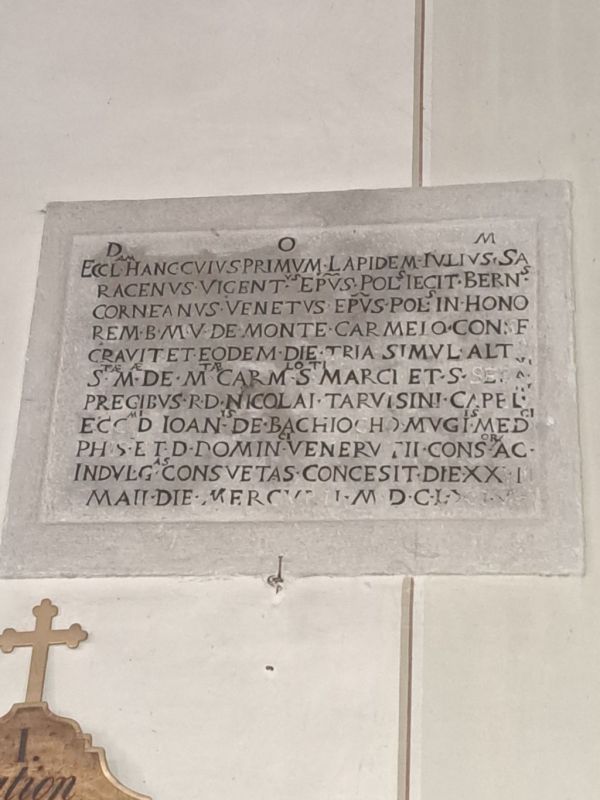 | D(EO) O(PTIMO) M(AXIMO) / ECCL(ESI)AMa) · HANC · CVIVS · PRIMVM · LAPIDEM · IVLIVS · SA/RACENVS · VICENT(IN)VSa) · EP(ISCOP)VS · POL(ENSI)Sa) · IECIT · BERN(ARDINV)Sa) / CORNEANVS · VENETVS · EP(ISCOP)VS · POL(ENSI)Sa) · IN · HONO/REM · B(EATAE) · M(ARIAE) · V(IRGINIS) · DE · MONTE · CARMELO · CONSE/CRAVIT · ET · EODEM · DIE · TRIA · SIMVL · ALT(ARI)Aa) / S(ANC)TAEa) · M(ARI)AEa) · DE · M(ONT){A}Ea) · CARM(E)LOa) · S(ANC)TIa) · MARCI · ET · S(ANCTI) SEBA(STIA)NIa) · / PRECIBVS · R(EVERENDI) · D(OMINI) · NICOLAI · TARVISINI · CAPEL(LAN)O(?) / ECC(ELENTISSI)MI· · D(OMINI) · IOAN(N)IS · DE · BACHIOCHO · MVGI(ENS)ISa) · MED(I)CIa) · PHIS(ICI) · ET · D(OMINI) DOMIN(I)CIa) · VENERVTII · CONS(VLT)OR(VM)a)(?) AC / INDVL·G(ENTI)ASa) · CONSVETAS · CONCESIT · DIE · XXVII · / MAII · DIE · MERCVRII · M · D · C · L · X · I · V · | rectangular | na zidu desno od otara, ispred desne kapelice, na visini od 348 cm od poda | mrtvačka lubanja s kostima na vrhu i listovi na dnu | Centered left and right, letters filled with partly faded ink. Small capitals with slightly larger initials. | a) In superscript. |
| PP-31.6.1 | 1615 | 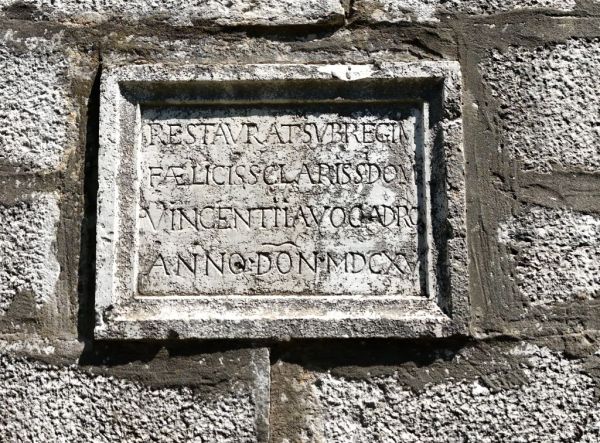 | RESTAVRAT(V)Ma) SVB REGIM(INE) / FAELICISS(IMI) CLARISS(IMI) DOM(INI) / VINCENTII AVOCADRO / ANNO DO(MI)N(I) MDCXV | rectangular | direktno iznad portala na visini od oko 420 cm od poda | Malo oštećen na rubovima i izblijedio.
Dimenzije su priblžne jer je natpis teško dostupan. Scriptio continua, left and right justified. | a) 'M' in superscript. | |
| PP-31.6.2 | 1750 | 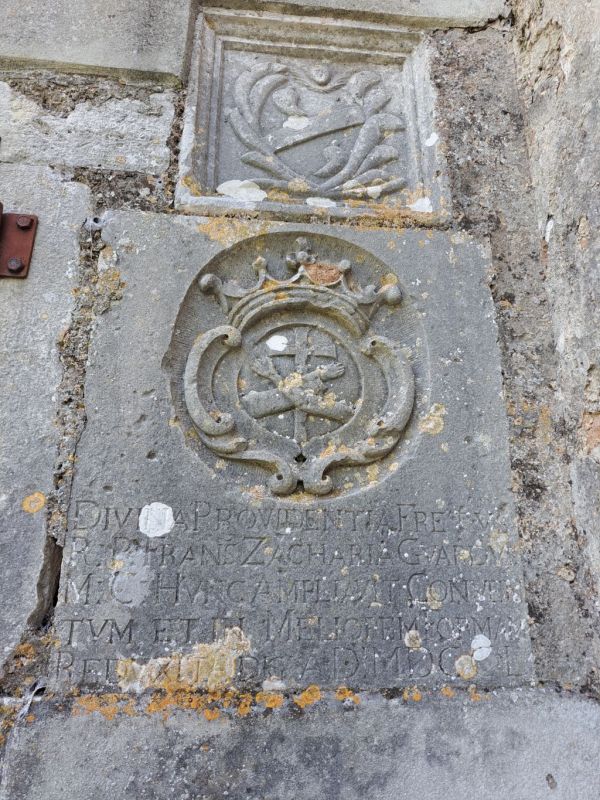 | DIVINA PROVIDENTIA FRETVS / R(EVERENDVS) P(ATER) FRAN(CISCV)S ZACHARIA GUARD(IAN)VS / M(INORVM) C(ONVENTVALIVM) HVNC AMPLIAVIT CONVEN/TVM ET IN MELIOREM FORMAM / REDVXIT A(NNO) D(OMINI) MDCCL | rectangular | na bočnoj strukturi (sakristija?) 208 cm od tla | franjevački grb u kartuši | Justified left and right, scriptio continua, small capitals with large initials. | |
| PP-31.6.3 | 1698 | 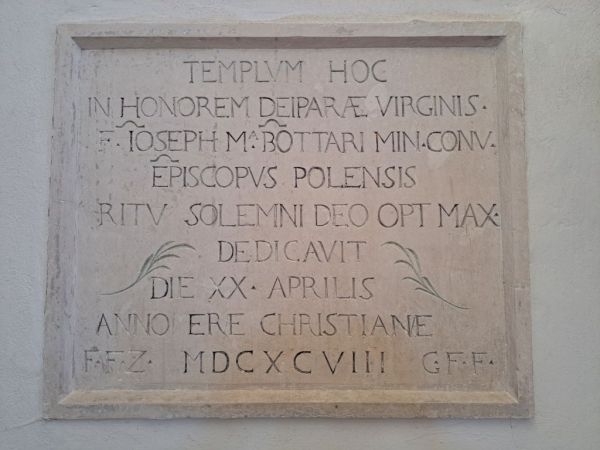 | TEMPLVM HOC / IN HONOREM DEIPARAE VIRGINIS · / F(RATER) IOSEPH M(ARI)Aa) BOTTARI MIN(ORVM) CONV(ENTVALIVM) / EPISCOPVSb) POLENSIS / RITV SOLEMNI DEO OPT(IMO) MAX(IMO) · / DEDICAVIT / DIE XX · APRILIS / ANNO ERAE CHRISTIANAE / F(?) · F(?) · Z(?) · MDCXCVIII G(?) · F(?) · F(?) · | rectangular | na zidu lijevo od glavnog oltara, na visini od 167 cm od poda | dvije palmine grančice | okvir je profiliran prema van Centered text, red and black ink in letters partly faded. | a) 'A' is smaller and in superscript. b) Arch above 'EP' although nothing is abbreviated. |
| PP-31.6.4 | 1753 | 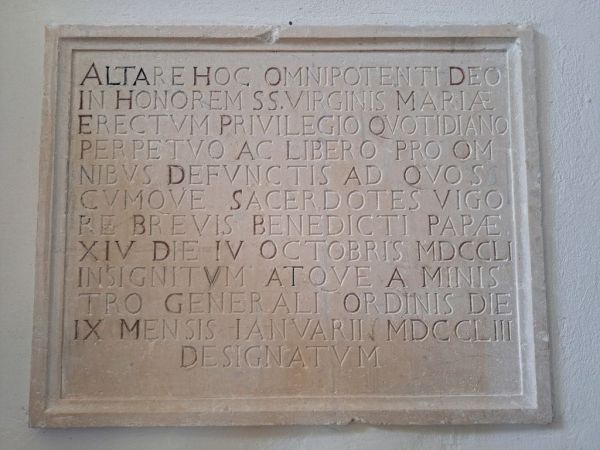 | ALTARE HOC OMNIPOTENTI DEO / IN HONOREM S(ANCTISSIMAE) VIRGINIS MARIAE / ERECTVM PRIVILEGIO QVOTIDIANO / PERPETVO AC LIBERO PRO OM/NIBVS DEFVNCTIS AD QVOS/CVMQVE SACERDOTES VIGO/RE BREVIS BENEDICTI PAPAE / XIV DIE IV OCTOBRIS MDCCLI / INSIGNITVM ATQVE A MINIS/TRO GENERALI ORDINIS DIE / IX MENSIS IANVARII MDCCLIII / DESIGNATVM | rectangular | na zidu desno od glavnog oltara, na visini od 167 cm od poda | okvir je profiliran prema van. Justified left, last word in the middle. Small capitals, only first letter in the inscription is larger. Letters coloured in red (initials) and black, black ink mostly faded comletely, red partly. | ||
| PP-8.1.1 | 1417 JL | 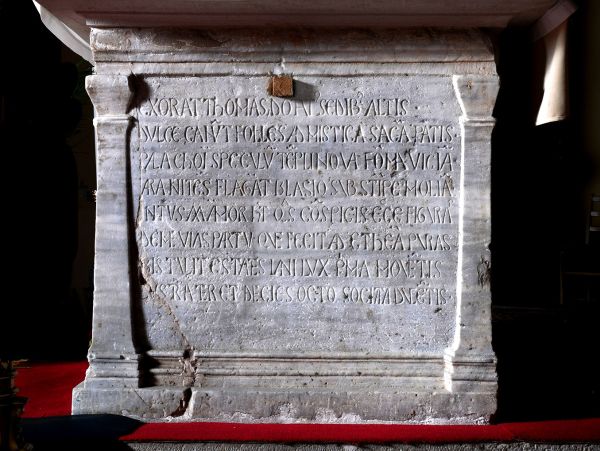 | EXORAT THOMAS DOTAT(VS) SEDIB(VS) ALTIS · DVLCE CANV(N)T FOLLES AD MISTICA SAC(R)A P(AR)ATIS · | rectangular | baza bočne (istočne) strane glavnog oltara | Prijevod i fotografija su preuzeti sa stranice Istarska kulturna baština Pomorskog i povijesnog muzeja Istre: link
Potrebno je provjeriti prijevod, te provjeriti prava za fotografiju. 'R' is abbreviated with a double arch above a letter. 1) Virgin Mary, whose relics are not preserved in the church. | a) 'A' is in superscript.
b) Original: 'CO(N)SPICLS'. c) First 'C' in superscript. d) 'S' in superscript. | |
| PP-8.1.2 | 1456 JL | 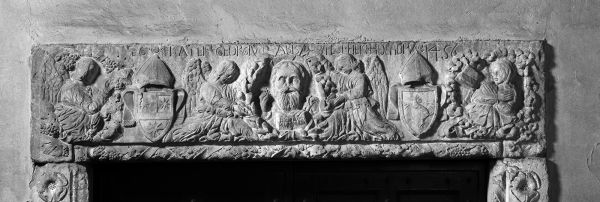 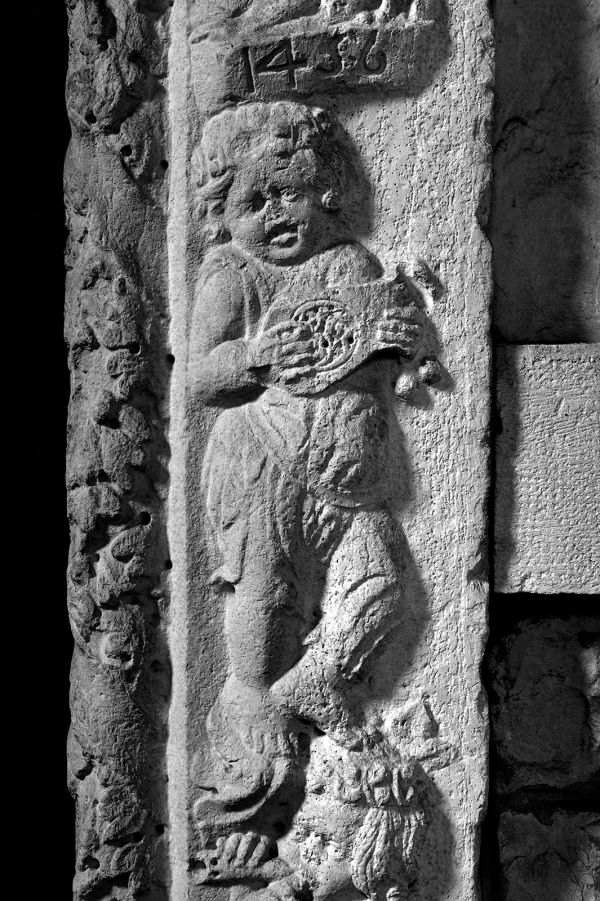 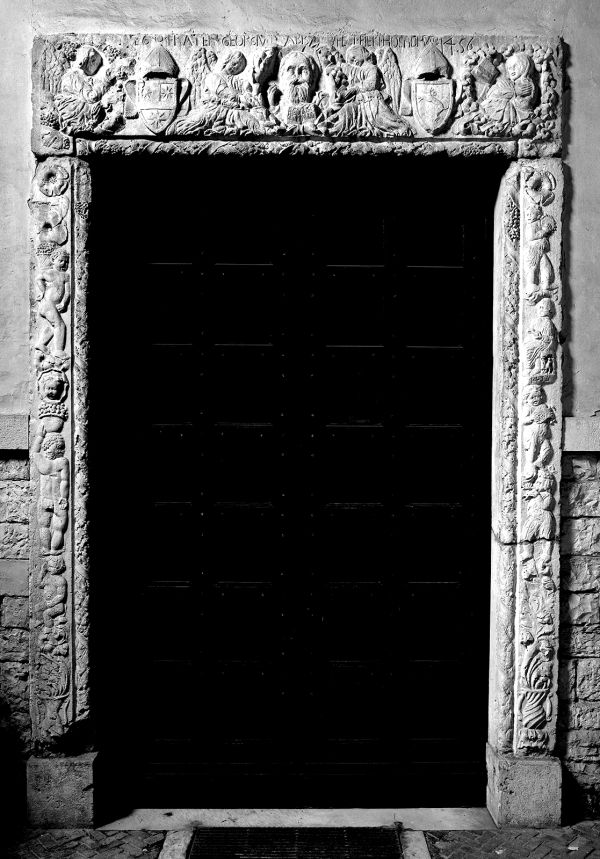 | EGO · FRATER · GEORGIVS · ABBAS · FECI · FIERI · HOC [.]OPVSa) · 1456 // EGO / SVM / LVX / MVNDI // 1456 | rectangular | Ulaz na južnoj strani | Fotografije preuzete iz Istarske kulturne baštine Pomorskog i povijesnog muzeja Istre: link.
Potrebno provjeriti prijepise i prava na fotografije. John 8,12 | a) 'S' laid horizontally. | |
| PP-8.1.3 | 1707 | 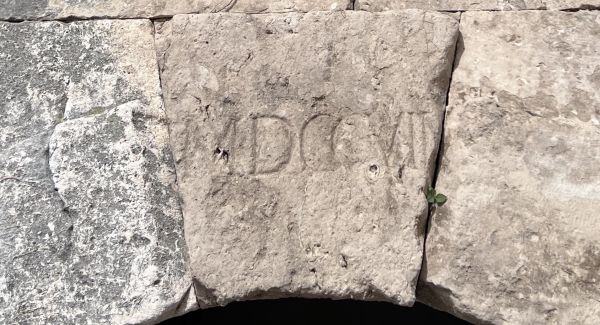 | MDCCVII | trapezoid | Zvonik preko puta pročelja katedrale, natpis je na zaglavnom kamenu. | |||
| PP-8.1.4 | 1707 | 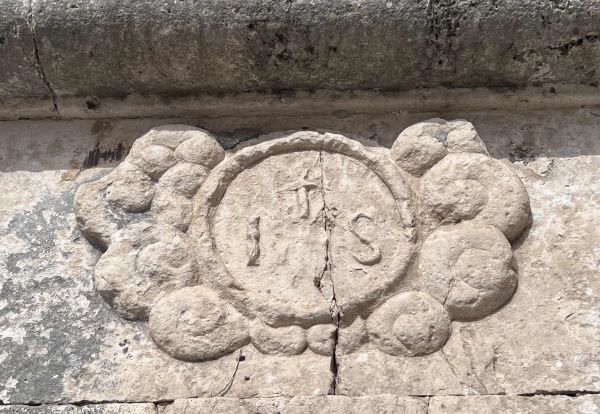 | {{crux}} / I[E]S(VS) | circular | Zvonik preko puta pročelja katedrale, natpis je u medaljonu izdan zaglanog kamena s godinom (PP-8.1.3) | |||
| PP-8.1.5 | 1451 JL | 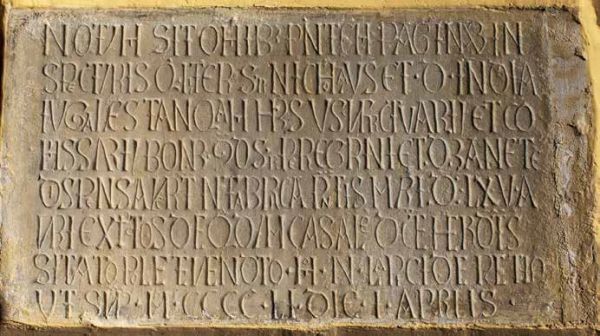 | NOTVM SIT OM(N)IB(VS) P(RESE)NTEM PAGINA(M) IN/SPECTVRIS Q(V)ALITERa) S(E)Rb) NICHOLAVSc) ET · D(OMINA) INDIA / IVGALESd) TANQV<A>Md) H(E)R(EDE)S VSVFR(V)CTVARII ET CO/M<M>(I)SSARIIe) BON(ORVM) Q(VON)D(AM) S(E)Rb) PEREGR(I)NIf) ET · D(OMINE) ZANETEg) / DISPENSAVER(VN)Th) IN FABRICAi) P(RESE)NTISj) MVRI D(VCATOS) LX · V · A/VRI EXT(RA)CTOSk) DE Q(VO)DAM CASALEl) D(I)CTE HER(E)D(ITA)T(I)S / SITATO POLEm) ET VEND(I)TO · M(OD)On) · IN · LAPICIDEo) P(R)ETIO / VT SVP(RA) · M(ILLESIM)O · CCCC · LI · DIE · I APR(I)LIS · | rectangular | na unutarnjoj strani sjevernog zida | ref. Filantropija...? 2016, str. 16 Justified left. 'A' with bent pointed crossbar. | a) 'I' is very small.
b) 'O' inserted within 'H'; 'A' above 'L', both small. c) 'R' is small. d) 'A' is small. e) 'I' within 'M'. f) First 'E' is small. g) Second 'E' is small. h) 'I' within 'D', both 'E' small. i) 'A' small, 'I within 'R'. j) 'N' is small. k) 'C' is small. l) 'E' is small. m) 'O' is small. n) 'O' within 'N'. o) 'A' and first 'I' are small. | |
| PP-8.3.1 | 1406 JL | 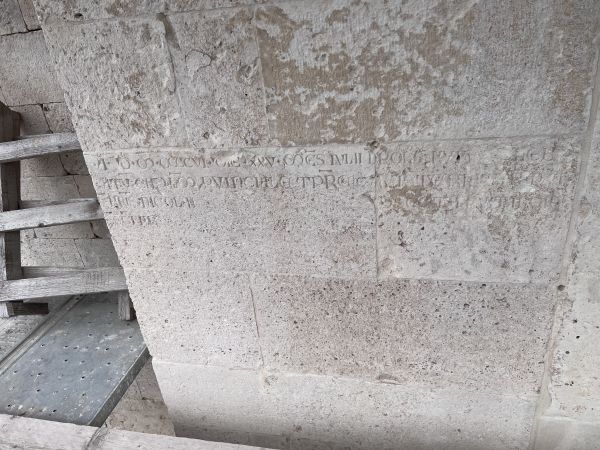 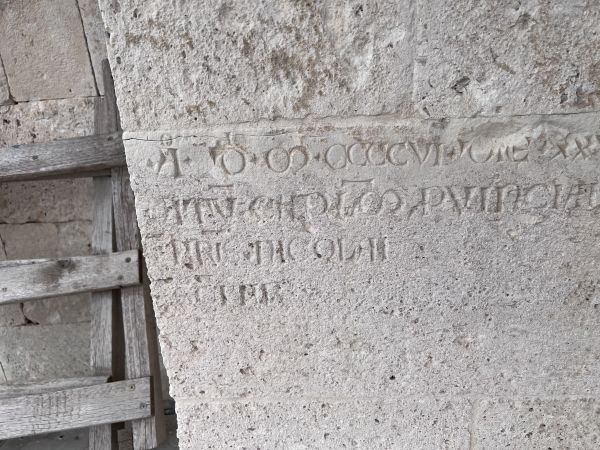 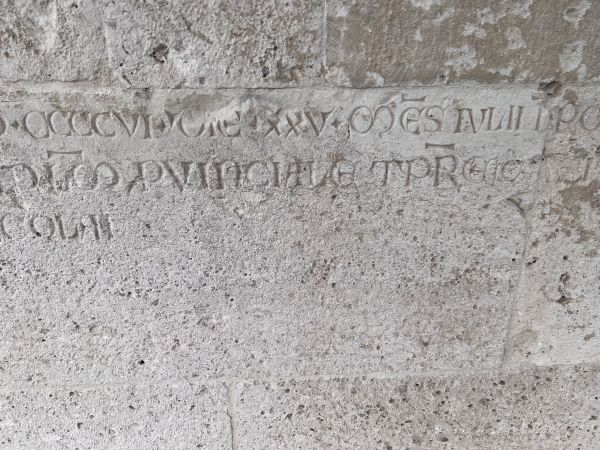 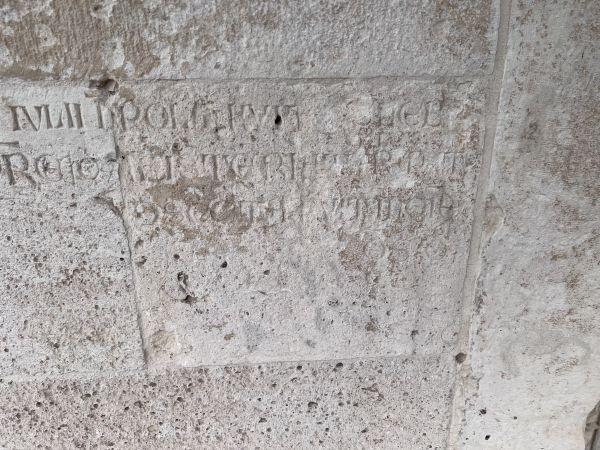 | A(NN)O · D(OMIN)I · M · CCCCVI · DIE · XXV · ME(NSI)S IVLII [.] POLAE [.] FVIT [CE]LEB[RA]/[.]TV(M) CAP(ITV)L(V)M P(RO)VINCIALE T(EM)P(O)RE [MIN]ISTERI[ATVS] R(EVERENDISSIMI) PAT(RIS) / [...] NICOLAI [– – –] SEC[RETARIVS FVIT] / OS[IVS] | rectangular | lijevo od portala na jugozapadnom pročelju | + ANNO DMI (domini) MCCCVI DIE XXV MENSIS IVLII ? POLAE FVIT CELEBR ATU(M) C(A)P(ITV)L(V)M P(RO)VINCIALE T(EM)P(O)RE MINISTERIATVS R.I +(REVERENDISSIMI) PAT P(AT)RIS NICOLAI S. FRANCISCI NOSTRO PATRI SECRETARIVS FVIT OSIUS (Oreb 1960?) Radi se o P.M. Nikoli iz Splita, koji je 1417. godine postao biskup u Skradinu. (Oreb 1960.) | ||
| PP-8.3.10 | 1762 | 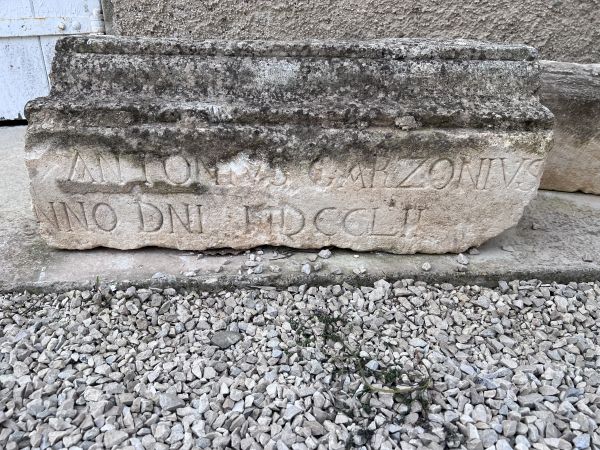 | ANTONIVS GARZONIVS / [A]NNO D(OMI)NI MDCCLII | rectangular | nalazi se u vrtu samostana | Natpis se nalazi u vrtu samostana sv. Franje. Nije sigurno da pripada samostanu. U vrtu samostana bilo je deponirano jako puno antičkih, srednjovjekovnih i novovjekovnih spomenika, koji su djelomično preseljeni u depoe Arheološkog muzeja Istre, a dio ih je još ostalo tamo. Po podacima to je materijal koji je skupljen po gradu nakon bombardiranja 1944. i 1945. i rušenja cijelih kvartova grada, bez jasne provenijencije. | ||
| PP-8.3.5 | 1533 JL | 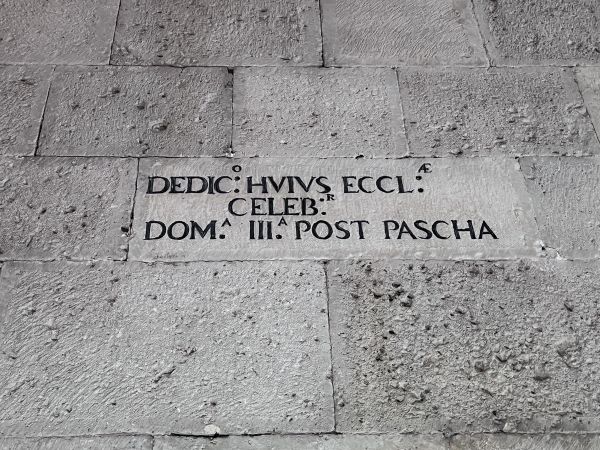 | DEDIC(ATI)O HVIVS ECCL(ESI)AE / CELEB(RATV)R / DOM(INIC)A IIIAa) POST PASCHA | rectangular | jugoistočni zid centralne apside | Centered. | a) All endings after abbreviations, as well as this 'A', are in superscript. | |
| PP-8.3.6 | 1655 | 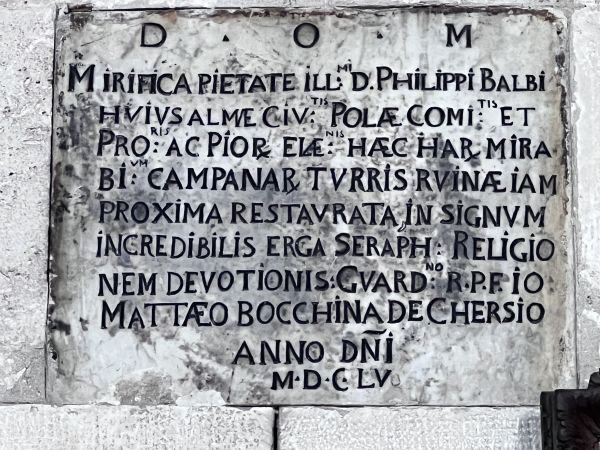 | D · O · M / MIRIFICA PIETATE ILL(VSTRISSI)MI D(OMINI) PHILIPPI BALBI / HVIVS ALMAE CIV(ITA)TIS POLAE COMITIS ET / PRO(CVRATO)RIS AC PIOR(VM) ELAE(MOSI)NIS HAEC HAR(VM) MIRA/BI(LI)VM CAMPANAR(VM) TVRRIS AE IAM / PROXIMA RESTAVRATA IN SIGNVM / INCREDIBILIS ERGA SERAPH(ICAM) RELIGIO/NEM DEVOTIONIS GVARD(IA)NO R(EVERENDO) P(ATRE) F(RA) IO(ANNE) / MATTAEO BOCCHINA DE CHERSIO / ANNO D(OMI)NI / M · D · C · LV | rectangular | sjeverozapadni unutarnji zid crkve | Centered. Small capital. Letters after abbreviations raised and smaller. 'I' with a dot. | ||
| PP-8.3.7 | 1751 | 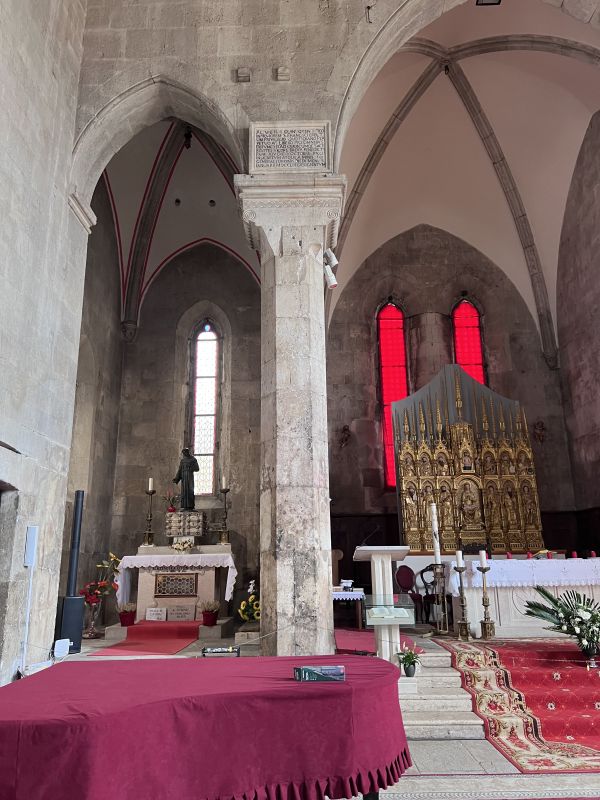 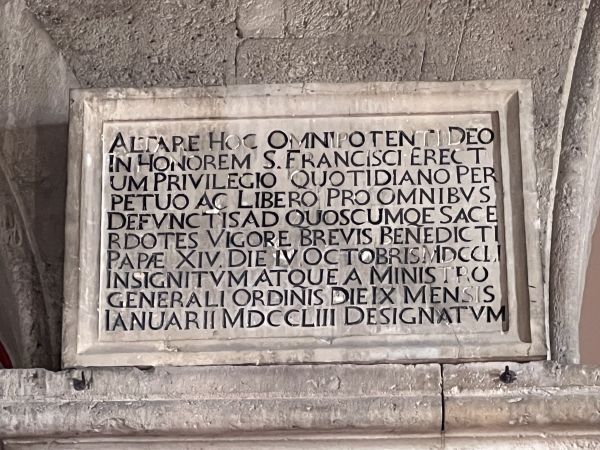 | ALTARE HOC OMNIPOTENTI DEO / IN HONOREM S(ANCTI) FRANCISCI ERECT/UM PRIVILEGIO QUOTIDIANO PER/PETUO AC LIBERO PRO OMNIBVS/DEFVNCTIS AD QUOSCUMQE SACE/RDOTES VIGORE BREVIS BENEDIC/PAPAE XIV. DIE IV OCTOBRIS MDCCLI/INSIGNITVM ATQUE A MINISTRO/GENERALI ORDINIS DIE IX MENSIS/IANUARII MDCCLIII DESIGNATVM | rectangular | Iznad kapitela lijevog stupa u prezbiteriju, koji dijeli sjeverozapadnu apsidu od centralne apside velikog oltara | Mramorna ploča koja nam govori o podizanju oltara u čast sv. Franje, koji je obdaren prema posebnom pismu pape Benedikta XIV dana 04. listopada 1751. godine trajnim privilegijem za korist duša u čistilištu od bilo kojeg svećenika koji na njemu bude misio. (Oreb 1960.) Small capitals. 'A' with bent crossbar. Letters filled with black paint, partly deleted. | ||
| PP-8.8.1 | 1756 | 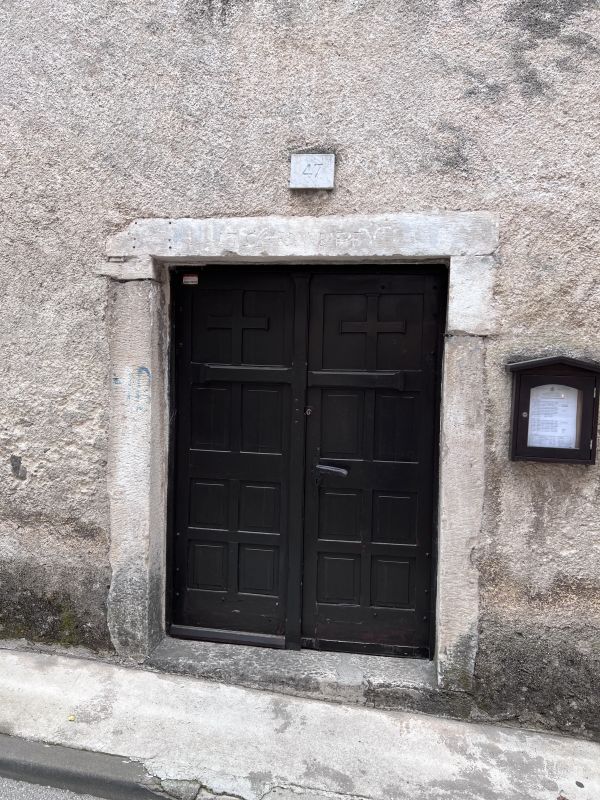 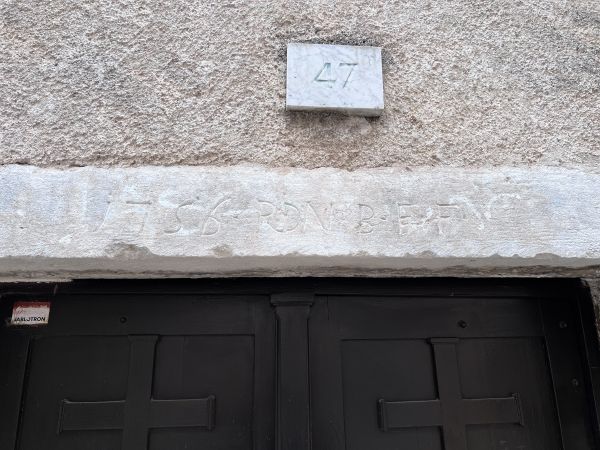 | 1756 · R(EVERENDVS) D(OMINVS) N · B · F(ECIT) · F(IERI) · | rectangular | na gredi iznad bočnog, istočnog ulaza u crkvu | '1' has a dot above; '5' is 'S'-shaped. | ||
| PP-8.8.2 | 1756 | 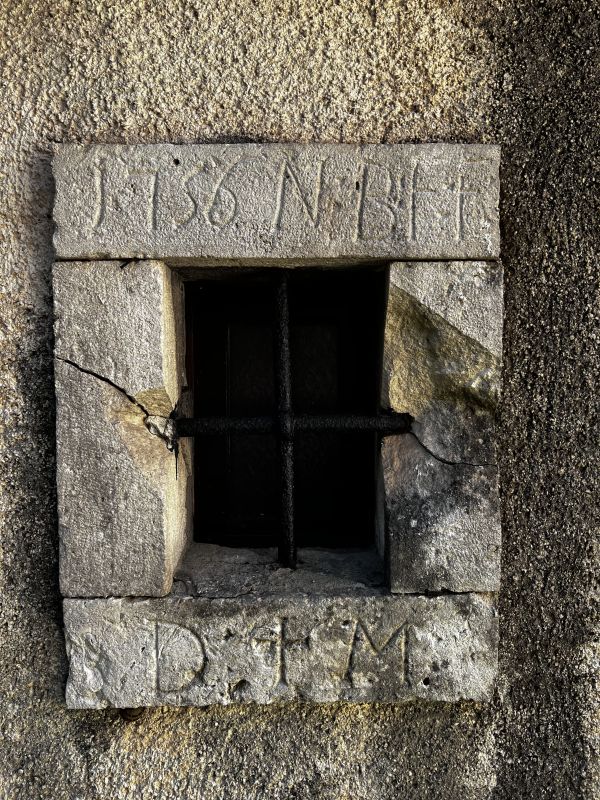 | 1756 N · B · F(IERI) F(ECIT) // D {{crux}} M | rectangular | na gredi iznad i ispod prozora manje sjeverne dogradnje | |||
| PP-8.8.3 | 1583 | 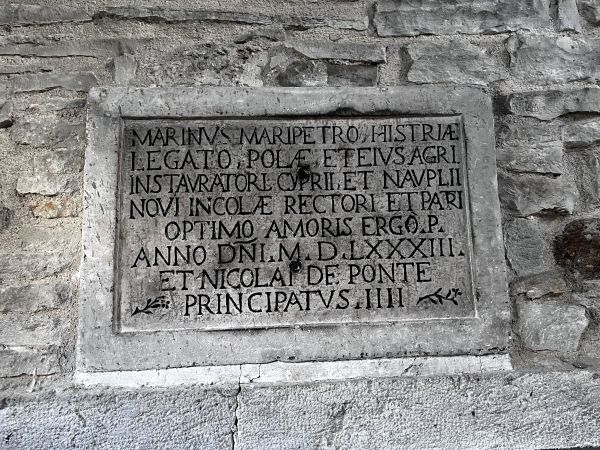 | MARINVS MARIPETRO HISTRIAE / LEGATO, POLAE, ET EIVS AGRI / INSTAVRATORI, CYPRII, ET NAVPLII / NOVI INCOLAE RECTORI ET PATRI / OPTIMO AMORIS ERGO P(OSVERVNT) / ANNO D(OMI)NI . M . D . LXXXIII . / ET NICOLAI DE PONTE / PRINCIPATVS . IIII | rectangular | ploča s natpisom na pročelju crkve | Centered text.
'A' with bent pointed crossbar. About Malpietro see https://hrcak.srce.hr/file/279247 | ||
| X-M.1.1 | 1695 | 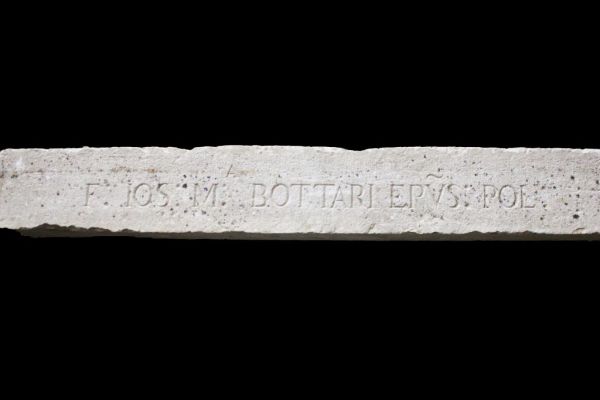 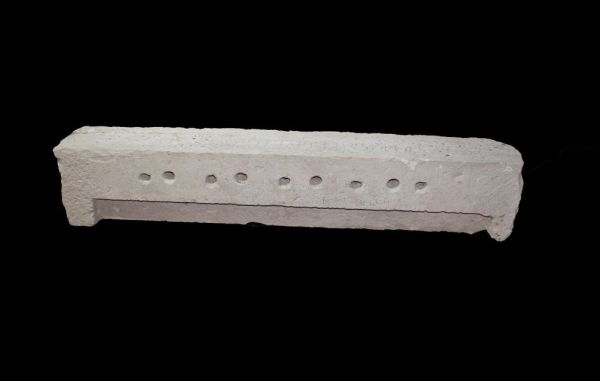 | F(RATER) IOS(EPHVS) M(ARIA)a) BOTTARI EP(ISCOP)VS POL(ENSIS) | rectangular | The lintel or transom of the unknown object. | a) 'A' in superscript. | ||
| X-M.1.10 | 1627 | 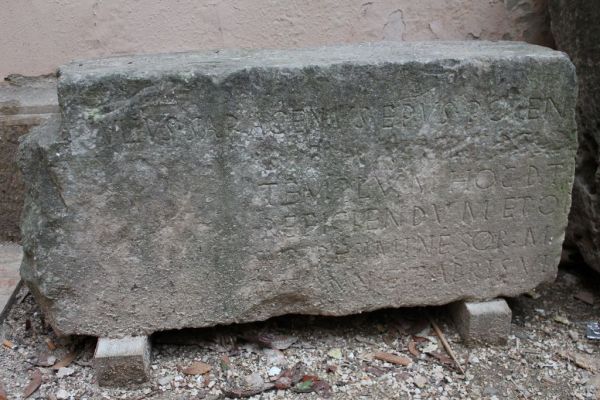 | IVLIVS SARACENVS EP(ISCOP)VS POLEN[SIS] [---] / [---]a) / TEMPLVM HOC D(IVI) T[HEODORI] / REFICIENDVM ET O[RNANDVM] [---] / SVB RE[G]IMINE SOR(ORIS) M(ARIAE) [---] / [SVS]ANNAE(?) FABRIS VI[---] | rectangular | The memorial plaque dedicated to the restoration of the church by Giulio Saraceno, Bishop of Pula. | a) The line seems to have been deleted on purpose. | ||
| X-M.1.12 | 1732 | 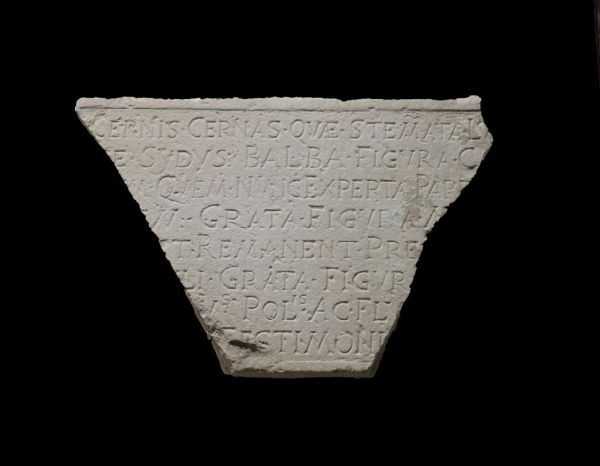 | [– – –] CERNIS · CERNAS · QVAE · STEM(M)ATA · LV[– – –] [– – –]E · SYDVS · BALBA · FIGVRA · C[– – –] | rectangular | Inscription plaque with a profiled edge. | Damaged on the right and left side, parts of the inscription are missing.
The inscription is about bishop of Pula Giovanni Andrea Balbi (Krk, 10.III.1692 – Pula, 23.X.1771). Small capitals; large are initials and 'BALBA'. | ||
| X-M.1.13 | 1676 | 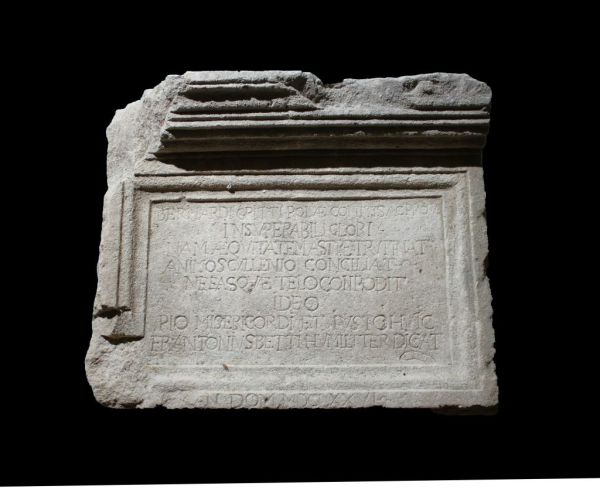 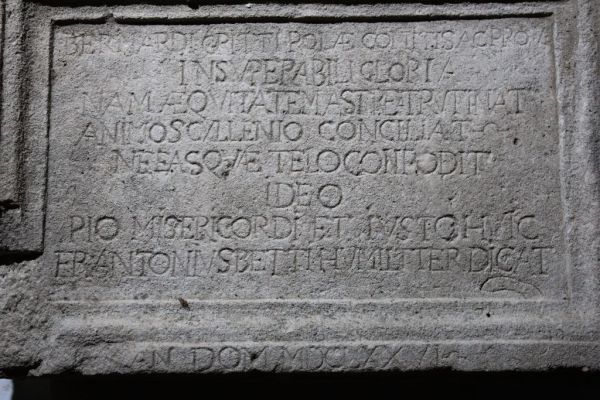 | BERNARDI GRITTI POLAE COMITIS AC PROV(ISORIS) / INSVPERABILI GLORIA / NAM AEQVITATEM ASTREA TRVTINAT / ANIMOS C[ẠẸ]LENIO(?) CONCILIAT / NEFASQV{A}E TELO CONFODIT / IDEO / PIO MISERICORDI ET IVSTO HVIC / FR(ATER) ANTONIVS BETTI HVMILITERa) DICAT / AN(NO) DOM(INI) MDCLXXVI | rectangular | Centered text. | a) Original: HUMILTTER. | ||
| X-M.1.14 | 1885 | 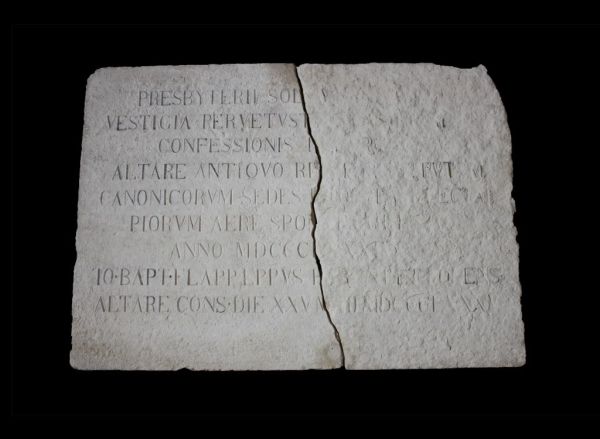 | PRESBYTERII SOL[– – –] / VESTIGIA PERVETVST[A] [– – –] / CONFESSIONIS [– – –] R [– – –] / ALTARE ANTIQVO RE[– – –]I[– – –]VT[..]M / CANONICORVM SEDES [– – –]ECTA / PIORVM AERE SPO[– – –] / ANNO MDCCCL[X]XX[– – –] / IO(ANNES) BAPT(ISTA) FLAPP EP(ISCO)PVS P[OLENSIS] [– – –] / ALTARE CON(ECRAVIT) DIE XXV M[A]II MDCCCLXXX[V] | rectangular | Two fragments of the inscription plaque. On the right fragment, the surface is very worn and this part of the inscription is almost illegible. The text is centered. | |||
| X-M.1.15 | 1789 | 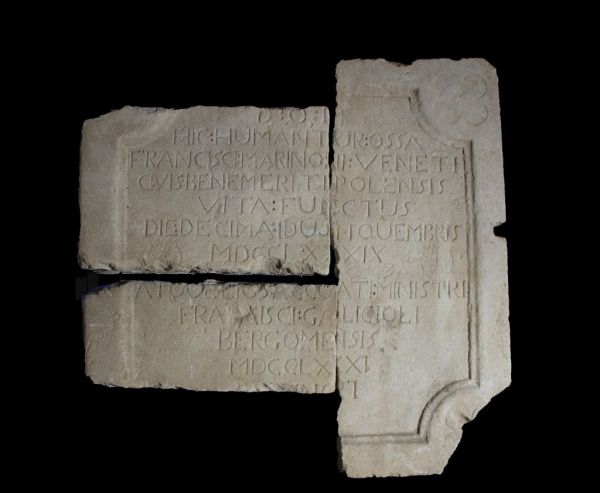 | D(EO) · O(PTIMO) M(AXIMO) / HIC · HUMANTUR · OSSA / FRANCISCI · MARINONI · VENETI / CIVIS · BENEMERITI · POLENSIS / VITA · FUNCTUS / DIE · DECIMA · IDUS · NOUEMBRIS / {{stemma}}(?) MDCCL · XXXIX {{stemma}}(?) / [ATQVE EIUS ACCOL]ATTI(?) · MINISTRI / FRA[NC]ISCI · GALICIOLI / BERGOMENSIS / MDCCLXXXI / [DEFUNCT]I | rectangular | The inscription plaque has a profiled edge, rounded at the corners. There's a quatrefoil motif on the rounded corners, and undefined symbols (coats of arms) on both sides of the inscription field. | The plaque is fragmented and consists of three pieces that connect. A profiled edge, with rounded inlets at the corners, frames the inscription. On each rounded corner, there is a shallowly carved quatrefoil. On both sides, to the left and right of the seventh line, there are engraved undefined symbols (coats of arms) with a crown on top and stars inside the shield. The text is centered. | ||
| X-M.1.16 | 1653 | 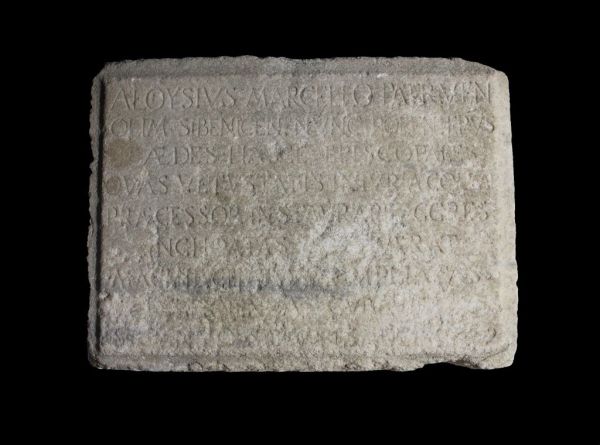 | ALOYSIVS MARCELLO PATR(ICIVS) VEN(ETVS) / OLIM SIBENICEN(SIS) NVNC POLEN(SIS) EP(ISCOP)VS / AEDES HASCE EPISCOPALES / QVAS VETVSTATIS INIVRIA CO[L]LAP(SAS) / PRAECESSOR INSTAVRARE AGGRES(SV)S / INCHOATAS R[ELIQ]VERAT / MAG[NI]FICENTIVS AMP[L]I[ATA]S / REFICIENDA[S] CVRAVIT / ANNO SA[L]VTIS MDCLV[– – –] | rectangular | Raised inscription surface. Recessed edge of the plaque.
A memorial plaque dedicated to Alojzije Marcello, Bishop of Pula. The text is centered. | |||
| X-M.1.18 | 1475 JL | 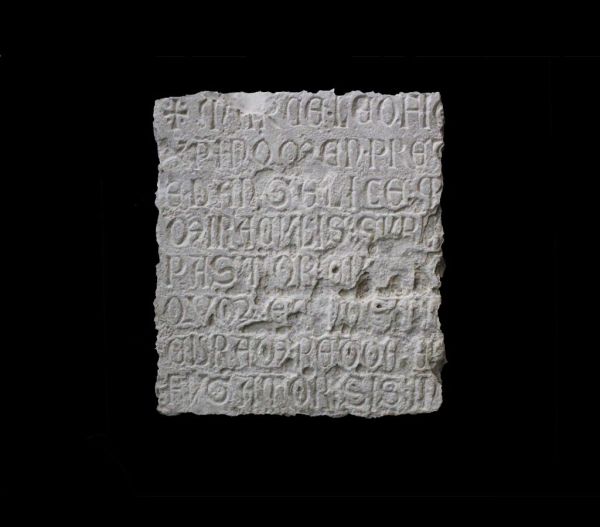 | {{crux}} MARCE ∙ LEO ∙ FIG[URATUS] /
CHR(IST)Ia) ∙ NOMEN ∙ PRE[DICATUS] / EUANGELICE ∙ [QVI ∙ UNCTUS] / MIRACVLIS ∙ SVB[LIMIS ∙ FUNCTUS] / PASTOR ∙ CV[M ∙ SIS ∙ VENETORUM] / QVORVM ∙ ET ∙ NOSTR[UM ∙ SUBIECTORUM] / CURAM ∙ REDDE ∙ ET ∙ [CVNCTORUM] / FVGATOR ∙ SIS ∙ IN[IMICORUM] | rectangular | The plaque is dated at the end of 15th century.
De Franceschi publishes a transcription of the inscription, for which he states that the fragment is preserved in the Museo civico di Pola and that it was found in 1845 by Giovanni Carrara. Nadopuna transkripcije prema De Franceschiju (s promjenom U >V). Only 'CURAM' has 'U'. | a) Christogram (XPI). | ||
| X-M.1.2 | 1667 | 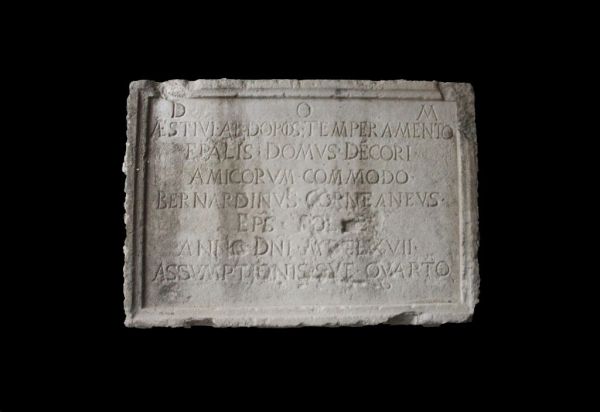 | D(EO) O(PTIMO) M(AXIMO) / AESTIVI ARDORISa) TEMPERAMENTO / EP(ISCOP)ALIS DOMVS DECORI / AMICORVM COMMODO / BERNARDINVS CORNEANEVS EP(ISCOPV)S [P]OL[ENSIS] / ANNO D(OMI)NI MDCLXVII / ASSVMPTIONIS SVAE QVARTO | rectangular | Double-profiled, prominent edge of the inscription plaque. | A memorial plaque dedicated to Bernardin Corniani, Bishop of Pula. | a) Corrected from 'ARDOROS'. | |
| X-M.1.3 | 1666 | 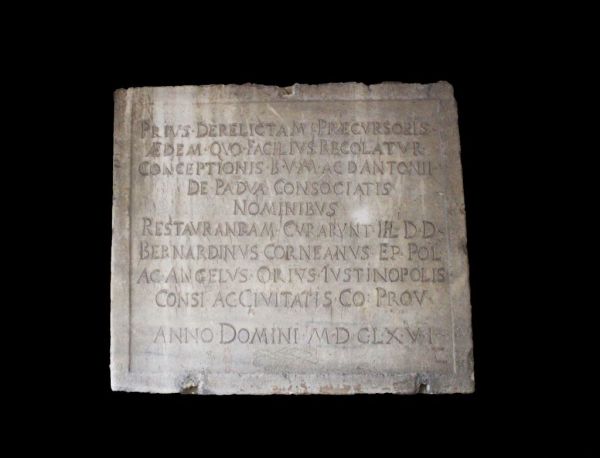 | PRIVS DERELICTAM PRAECVRSORIS / AEDEM QVO FACILIVS RECOLATVR / CONCEPTIONIBVS B(EATAE) V(IRGINIS) M(ARIAE) AC D(IVI) ANTONII / DE PADVA CONSOCIATIS / NOMINIBVS RESTAVRANDAM CVRARVNT ILL(VSTRISSIM)Ia) DOMINI / BERNARDINVS CORNEANVS EP(ISCOPVS) POL(ENSIS) / AC ANGELVS ORIVS IVSTINOPOLIS / CONS(ILII) AC CIVITATIS CO(MES) PROV(ISOR) / ANNO DOMINI MDCLXVI | rectangular | Single-profiled edge of the inscription plaque. | A memorial plaque dedicated to Bernardin Corniani, Bishop of Pula. | a) 'I' is raised. | |
| X-M.1.4 | 1694 | 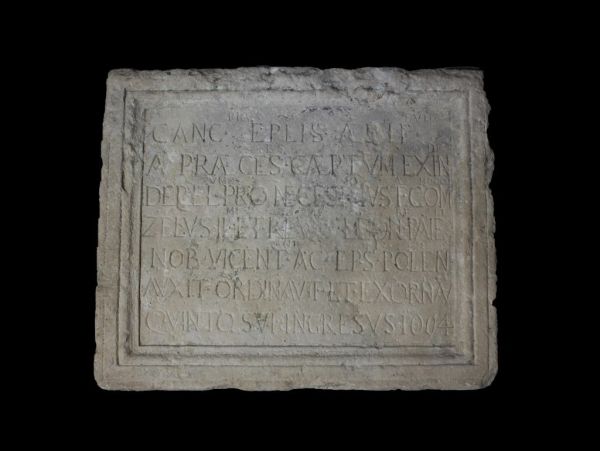 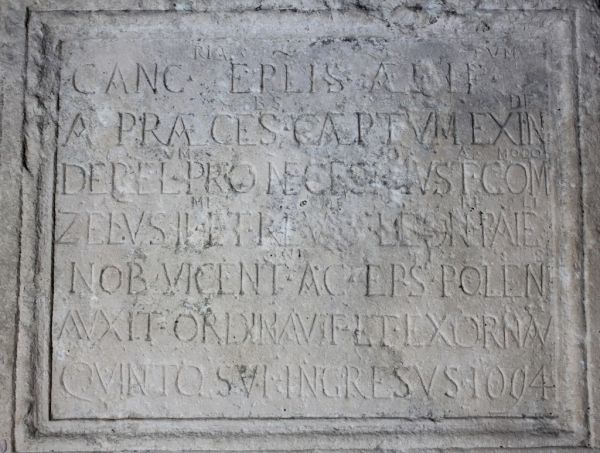 | CANC(ELLA)RIAE · EP(ISCOPA)LIS · AE[D]IF(ICI)VM · / A · PRAECES(SORI)B(V)S · CAEPTVM · EXINDEa) / DEREL(ICT)VM · PRO · NECESA(RI)O · IVST(ITI)AE · COMMODOb) / ZELVS · IL(LVSTRISSI)MI · ET · REV(ERENDISSI)[MI] · [D](OMINI) · LEON(O)RI · PAIELI / NOB(ILIS) · VICENT(I)NI · AC · EP(I)S(COP)I · POLEN(SI)S / AVXIT · ORDINAVIT · ET · EXORNAV<IT> / QVINTO · SVI · INGRESVS · 1694. | rectangular | Multiple-profiled, prominent edge of the inscription plaque. | A memorial plaque dedicated to Eleonor Pagello, Bishop of Pula. Letters after abbreviations rasied. 'A' with bent crossbar. | a) 'DE' raised. b) 'MODO' raised. | |
| X-M.1.5 | 1695 | 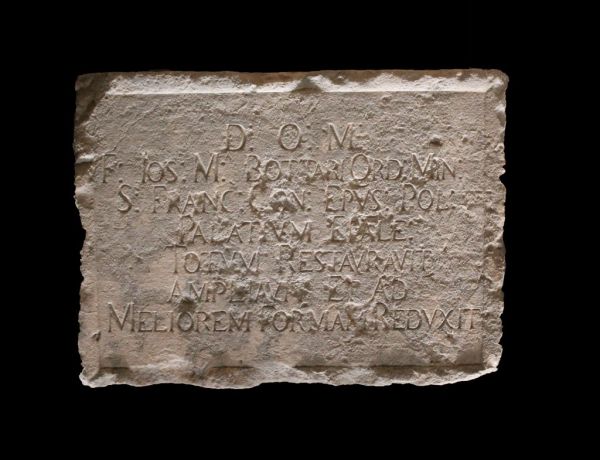 | D(EO) O(PTIMO) M(AXIMO) / F(RATER) IOS(EPHVS) M(ARIA) BOTTARI ORD(INIS) MIN(ORVM) / S(ANCTI) FRANC(ISCI) CON(VENTVALIVM) EP(ISCOP)VS POL(ENSIS) / PALATIVM EP(ISCOP)ALE / TOTVM RESTAVRAVIT / AMPLIAVIT ET AD / MELIOREM FORMAM REDVXIT | rectangular | Profiled, prominent edge of the inscription plaque. | A memorial plaque dedicated to Giuseppe Maria Bottari, Bishop of Pula. Centered text. Small capitals with large initials. | ||
| X-M.1.6 | 1750 | 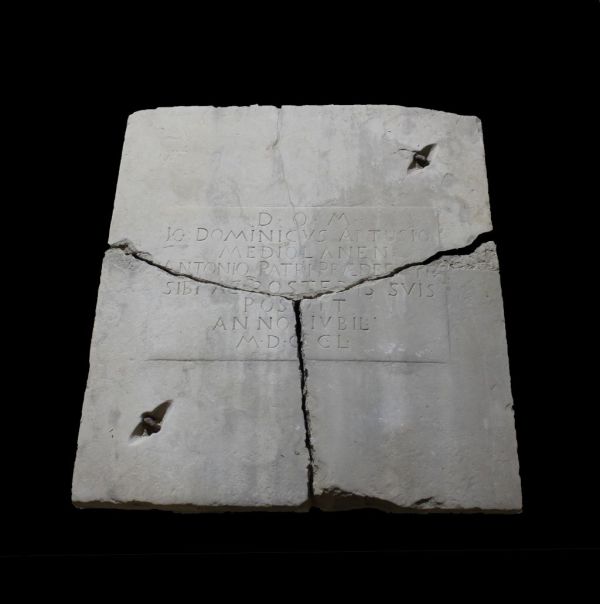 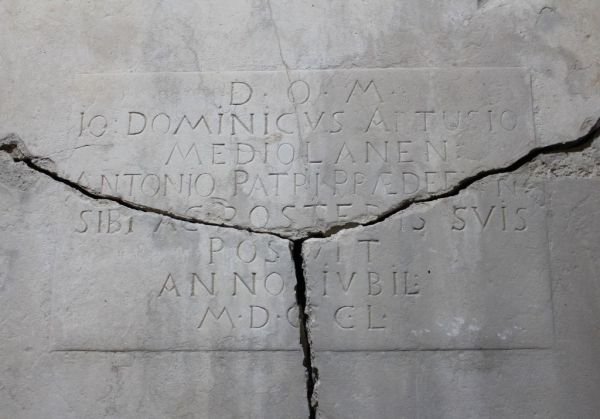 | D(EO) · O(PTIMO) · M(AXIMO) · / IO(ANNES) DOMINICVS ARTUSIOa) MEDIOLANEN(SIS) / ANTONIO PATRI PRAEDE[..]N[.] / SIBI AC POSTERIS SVIS / POSVIT / ANNO IVBIL(AEI) / M · D · C [·] C · L · | rectangular | The rectangular inscription field, slightly raised, is located in the middle of the square plaque. The plaque had previously been damaged and broken into four pieces. In some areas of subsequent repairs, certain letters are harder to read. 'A' with bent sharped crossbar; 'I' with dot above. | a) With 'U'. | ||
| X-M.1.9 | 1578 JL | 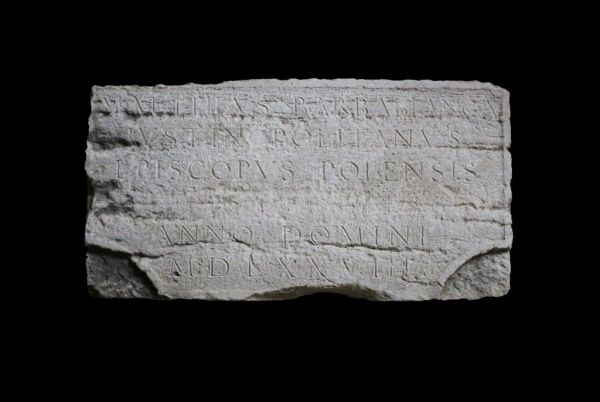 | MATTHEVS BARBABIANCA / IVSTINOPOLITANVS / EPISCOPVS POLENSIS / [IN]STI[TV]IT / ANNO DOMINI / MDLXXVIII | rectangular | A memorial plaque dedicated to Matteo Barbabianca, Bishop of Pula. Text centered. | |||
| X-M.2.1 | 1744 | SANA ANlMAM / MEAM D(OMI)NE / QUIA PECCAVI / TIBI / GEORGIUS CAN(ONICUS) / CORRENICH / RESTAURARE FECIT / PRO SE ET HAER(EDIBV)S / A(NNO) D(OMI)NI MDCCXLIV | rectangular | Radossi 1995: 188
Ecco l' iscrizione della contestata lapide epigrafa, custodita presso il Museo Civico di Rovigno (n.ro inv. 510:RV;l6:A): SANA ANlMAM Il MEAM D.N.E. Il QUIA PECCAVI Il TIBI Il GEORGIUS CAN. Il CORRENICH Il RESTAURARE FECIT Il PRO SE ET HAER.S Il A. DNI MDCCXLIV. Ps 41,5 | ||||
| X-O.1.2 | 1536 JL | 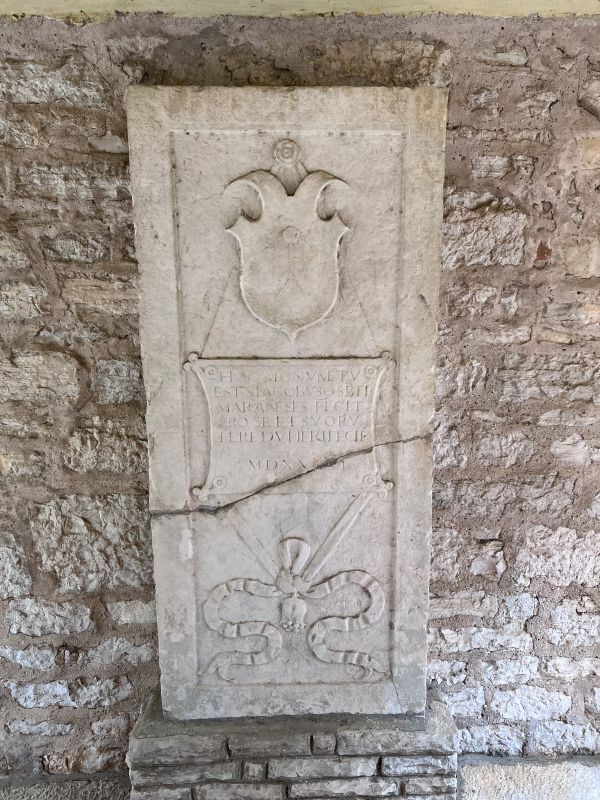 | HOC MONVMENTV(M) / EST · S(ER) IACOBVS Q(VONDAM) S(ER) B(ENEDIC)TI(?) / MARANESES(?) FECIT / PRO SE ET SVORV(M) / HEREDVM F(IE)RI FECIT / MDXXXVI | rectangular | Brijunski kaštel | PP-23.4 Originalno Sv. German, sada uzidano u Brijunski kaštel. | ||
| X-O.1.3 | 1462 JL | 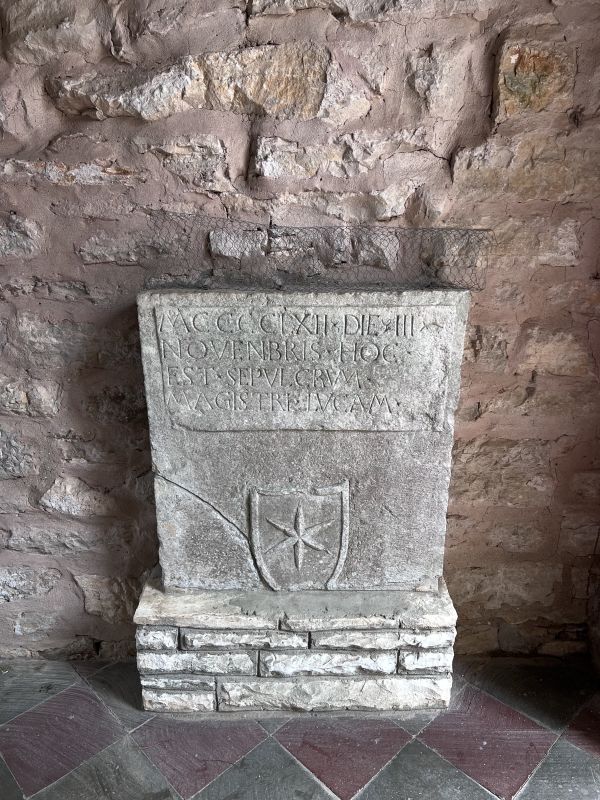 | M(ILLESIM)Oa) · DIE · III · / NOVENBRIS(!) · HOC · / EST · SEPVLCRVM · MAGISTRI · LVCAM(!) · | rectangular | Brijunski kaštel | PP-23.12 Originalno BDM Veli Brijun, sada uzidano u Brijunski kaštel. Justified left. | a) 'O' above 'M'. | |
| X-O.2.1 | 1701 | 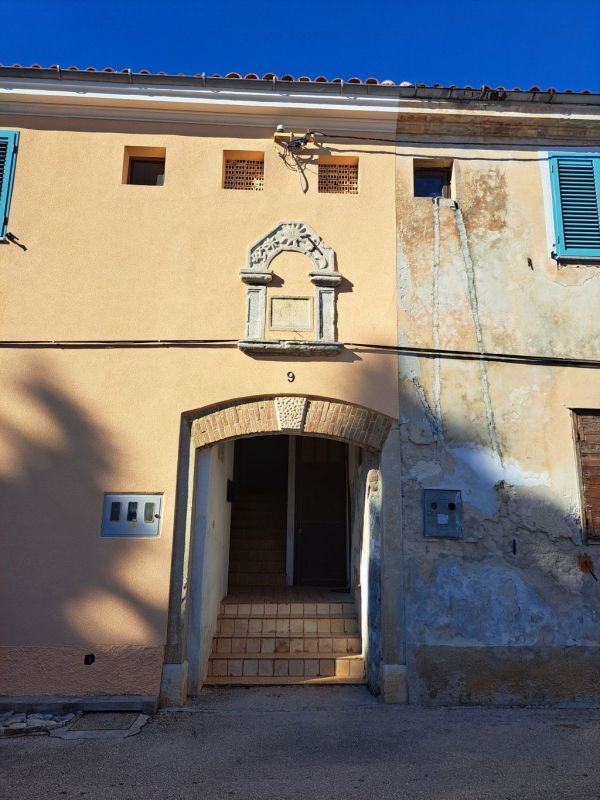 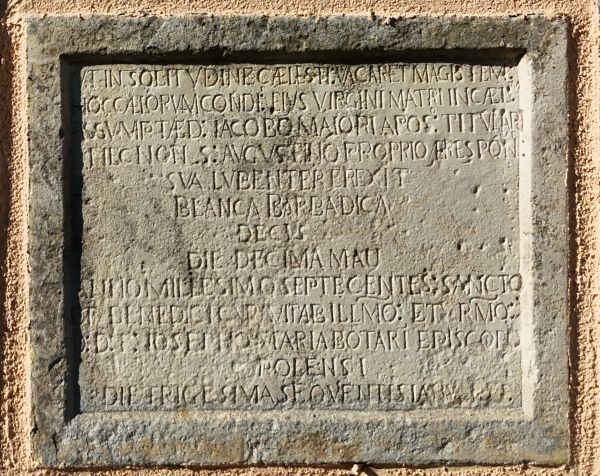 | VT IN SOLITVDINE CAELESTI VACARET MAGIS TEMP(VS)(?) / HOC CAELORVM CONDI(TORI) EIVS VIRGINI MATRI IN CAELOS / ASSVMPTAE D(IVO) IACOBO MAIORI APOS(TOL)Oa) TITVLARI / NEC NON S(ANCTO) AVGVSTINO PROPRIO AEREb) SPONTEc) / SVA LVBENTER EREXIT BLANCA BARBADICA / DECVS / DIE DECIMA MAIId) / ANNO MILLESIMO SEPTECENTES(IMO) SANCTO / [E]T BENEDICI CVRAVIT AB ILL(VSTRISSI)MO ET R(EVERENDISSI)MO / D(OMINO) D(OMINO) IOSEPHO MARIA BOTARI EPISCOPO / POLENSI / DIE TRIGESIMA SEQVENTIS IA[NVARII](?) | rectangular | na vanjskom zidu privatne kuće | Crkva je srušena polovicom 20. st., a natpis je zajedno s preslicom ugrađen u zid privatne kuće. Zbog nedostupnosti ga nismo mogli izmjeriti. The text is centered. | a) 'O' in superscript.
b) No blank space here. c) 'TE' above the letters. d) Looks like 'MAU'. |